Poultry industry packs a punch in Arkansas




Poultry industry packs a punch in Arkansas



2,000,000 Safe Miles
Arkansas Trucking Association
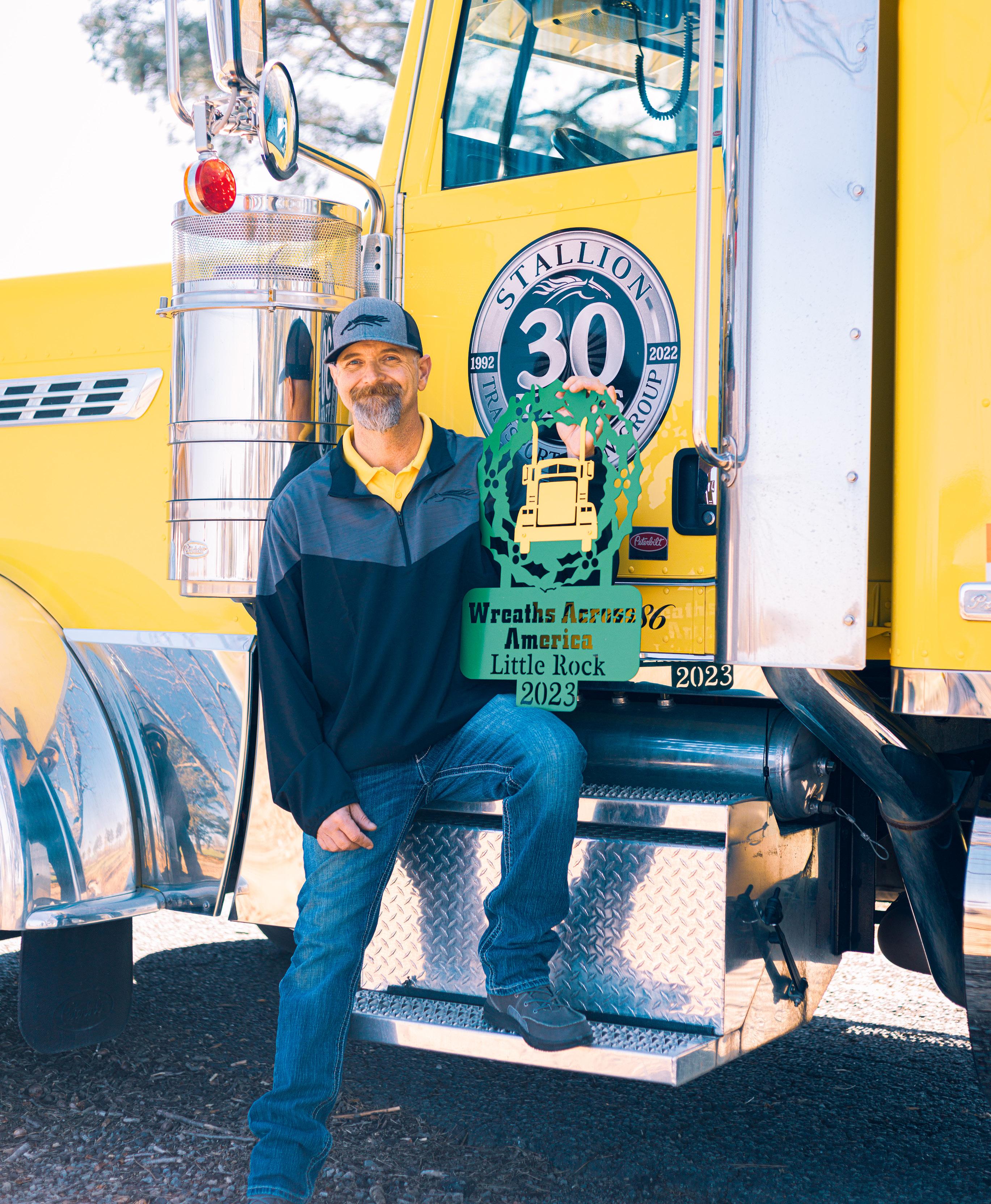
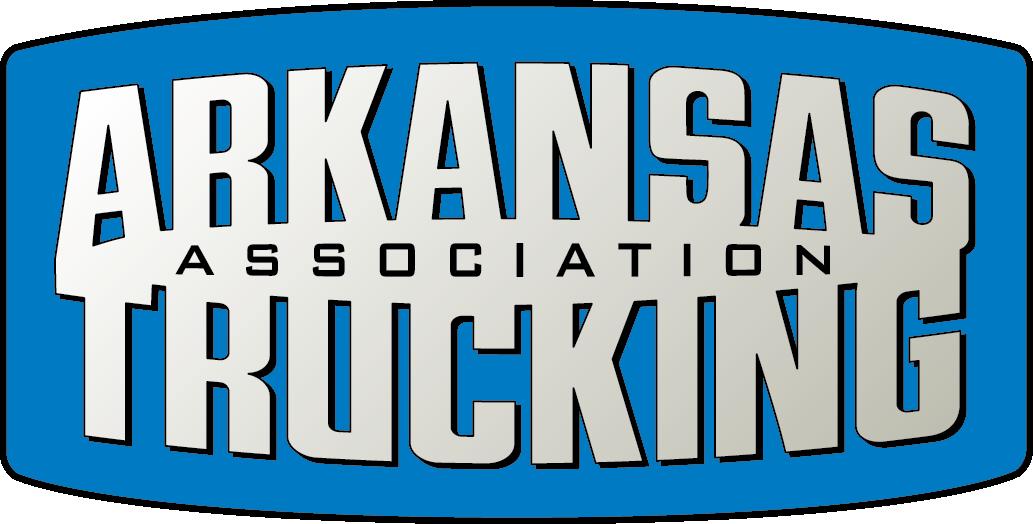
We are so proud of Josh for his dedication to customers and his passion for the industry.
Thank you, Josh, for your commitment to excellence on and off the road.










As a firm built on relationships, our handshake matters. It means a warm greeting, the privilege of doing business together and knowing you can count on us.
Our performance builds relationships with our clients, many of whom have become old friends. It’s why shaking hands with us means just a little bit more.




The Poultry Federation’s annual Poultry Festival is considered one of the industry’s biggest events and brings together producers, processors and more.
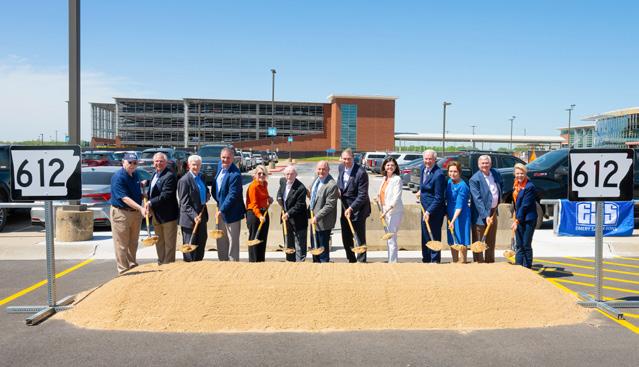
From widening I-30 in downtown Little Rock to building a bypass in Springdale, several highway projects are set to relieve traffic congestion in the Natural State.
The Allied Scholarship program from the Poultry Federation awards scholarship funding to deserving students planning a career in the poultry industry.
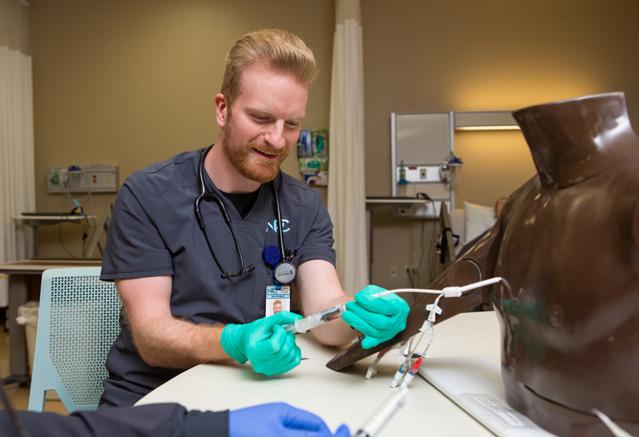
Not only has the industry seen major disruptions but nurses themselves have become more diverse, better educated and more specialized.
Generational businesses are the backbone of industry in Arkansas, and AMP shines a spotlight on a few of the state’s iconic family-run enterprises.
Arkansas is full of “dynamic duos,” those couples and partners in business who have achieved success and made lasting impacts on their communities.
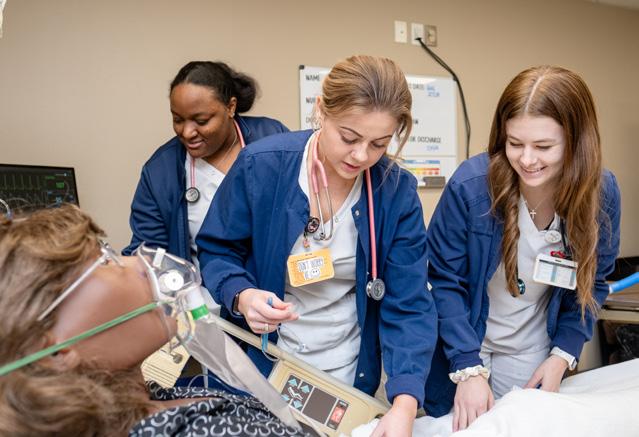
State lawmakers once passed legislation to disassociate feral hogs with the Razorback mascot. One south Arkansas man is on a mission to quell the problem pigs.
Dwain Hebda looks back on the life and legacy of Arkansas’ great statesman, former congressman, governor and U.S. senator David Pryor.
PRESIDENT & PUBLISHER
Heather Baker | hbaker@armoneyandpolitics.com
EDITOR-IN-CHIEF
Dwain Hebda | dwain@armoneyandpolitics.com
SENIOR EDITOR
Mark Carter | mcarter@armoneyandpolitics.com
ASSOCIATE EDITORS
Sarah Coleman | scoleman@armoneyandpolitics.com
Mak Millard | mmillard@armoneyandpolitics.com
EDITORIAL COORDINATOR
Darlene Hebda | darlene@armoneyandpolitics.com
STAFF WRITER
Sarah DeClerk | sdeclerk@armoneyandpolitics.com
MANAGING DIGITAL EDITOR
Kellie McAnulty | kmcanulty@armoneyandpolitics.com
ONLINE WRITER
Kilee Hall | khall@armoneyandpolitics.com
PRODUCTION MANAGER
Mike Bedgood | mbedgood@armoneyandpolitics.com
GRAPHIC DESIGNERS
Lora Puls | lpuls@armoneyandpolitics.com
Jenna Kelley | jkelley@armoneyandpolitics.com
SENIOR ACCOUNT EXECUTIVE
Greg Churan | gchuran@armoneyandpolitics.com
ACCOUNT EXECUTIVES
Michelle Daugherty | michelle@armoneyandpolitics.com
Mary Funderburg | mary@armoneyandpolitics.com
Karen Holderfield | kholderfield@armoneyandpolitics.com
Jona Parker | jona@armoneyandpolitics.com
Dana Rodriquez | dana@armoneyandpolitics.com
Megan Tharp | megan@armoneyandpolitics.com
EXECUTIVE ASSISTANT
Jessica Everson | jeverson@armoneyandpolitics.com
ADVERTISING COORDINATOR
Allison Runyon | ads@armoneyandpolitics.com
CIRCULATION
circulation@armoneyandpolitics.com
ADMINISTRATION
billing@armoneyandpolitics.com
CEO | Vicki Vowell
TO ADVERTISE
call 501-244-9700
email hbaker@ armoneyandpolitics.com
TO SUBSCRIBE armoneyandpolitics.com/subscribe
CONTRIBUTORS
Becky Gillette, KD Reep, Scott Cordova, Kenneth Heard, Jamison Mosley, Todd Traub




In case anyone had doubts, the poultry industry is big in Arkansas. The Poultry Federation kicks off its annual Poultry Festival June 21 in Rogers.
Coverage starts on page 14.
Cover graphic by Ryan Parker.
ARKANSAS VISIONARY: QUEEN OF THE ROAD — VICKI STEPHENS STILL BLAZING TRAILS FOR WOMEN IN TRUCKING IN ARKANSAS
Wonderful story. My FIL drove for them in the 80’s.
Jennifer Stiedle
POWER UP WITH GARY HOUSTON ELECTRIC COMPANY
They have been working on my house remodel and have provided excellent service.
Trish Meuser
FAMILY PROJECT AIMS TO SLOW RATE OF OPIOID DEATHS
Great job Whittingtons!
Sarah Vinson
COMMERCE TITLE CELEBRATES 15 YEARS
Congratulation Mike & Brian! 15 years has gone by fast! Keep up the good work!
Allison Pickell
FIRST COMMUNITY BANK PROMOTES JENKINS WITH TRUST TEAM Congratulations, Nyra Jenkins ! Very deserving. Kembralyn Ward Redman
MOSES TUCKER PARTNERS CELEBRATES 40TH ANNIVERSARY
Happy anniversary!!
Angie Taylor
April 2 — May 5
1 Breckenridge Village Puts Up Signage, Openings Underway
2 Construction to Start on Hampton Inn in Hot Springs
3 ALDI in West Little Rock
4 Wet? Dry? Sunday Sales? A Look at Arkansas’ Disparate Alcohol Laws
5 Game Changer: Lockheed Martin Seen as ‘Tip of Iceberg’ for Fort Smith
6 Rapha Closes Bentonville Store, Lays Off Employees
7 Arkansas Finalizing Deal to Hire John Calipari
8 Alice Walton School of Medicine Announces New Staff, Faculty
9 It’s Official: Calipari to Lead Arkansas Razorback Basketball
10 Air Arkansas: Flight Schools Pump Out Pilots as Demand Grows
On page 123 of the April issue, an agricultural story included a quote by farmer Jared Phillips indicating that Phillips was referring to Sen. John Boozman, which was incorrect.
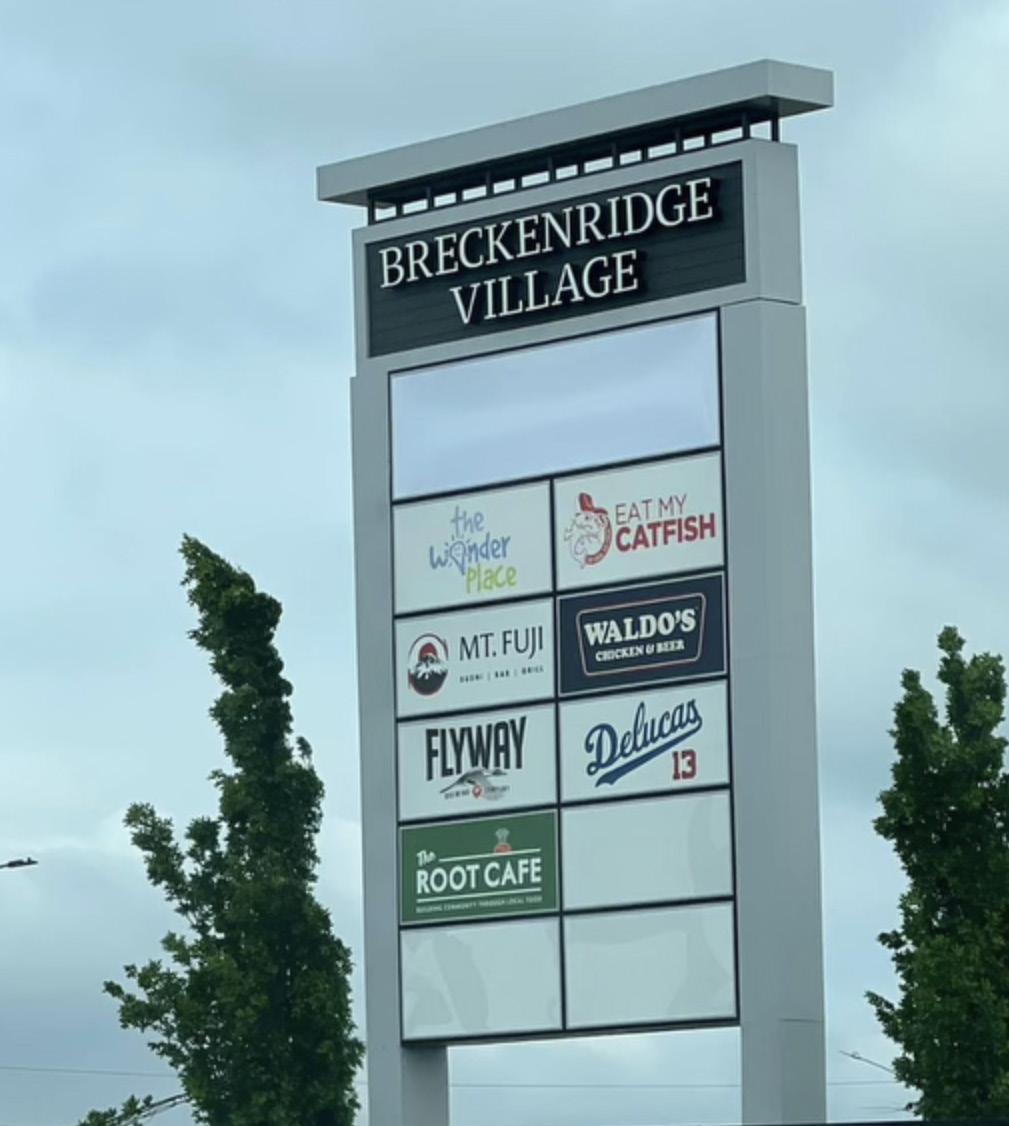
Little Rock’s Breckenridge Village has been in the process of remodeling, with several additions to the property made. ... According to Hank Kelley of Kelley Commercial Partners, several businesses have opened and reopened in the area, with other improvements consistently being made as well. Most recently, the new sign for Breckenridge Village was installed, which features the names of several incoming tenants, including The Root Café, Flyway Brewing and DeLucas.

Lexus in Little Rock is poised to provide an even more luxurious experience to its customers. In addition to completing a remodel of the dealership in November, Parker Lexus now offers pickup and delivery services for sales and service across the state, including in northwest Arkansas.
The rollicking black Lab didn’t see the snake as she con templated a plunge into the upper portion of Jimerson Creek in Little Rock.
The startled snake, which looked to be a young copperhead, roused from its safe spot under a fallen branch and struck a warning in the dog’s direction but missed its mark. Maybe it lacked the necessary reach, or maybe it never in tended to hit its target. Good thing either way. The Lab — or more accurately, the wagging tongue tethered to a 90-pound bullet train of canine bliss — was aware only of the several hundred acres of free roam she was enjoying. I’m not sure she even saw the danger.
The snake lingered in the aftermath, floating in the middle of the clear pool as if to further drive home the point. Mean while, the subject of its warning was al ready lundering away up creek.
Throughout the winter, we had en joyed the freedom to explore the ravine from which the creek empties into the Arkansas River between the Big Dam and Two Rivers bridges — no leashes necessary, and no snakes.
These combustible days, leashes are indeed advised, and one must watch every step for snakes in the most unexpected places. We know of a certain SUV in Fayetteville that suffered the consequences of its owner’s misguided pro football alle-

Tgiance. In northwest Arkansas, license plate frames that depict blacklisted former team names may suffer an onslaught of eggs.
Spring has sprung, and we’ve got to watch our step. The season ahead promises to be long, hot and combustible, and that’s not even counting for
As the apostle Paul wrote to the Ephesians:
“Look carefully then how you walk, not as unwise but as wise, making the best use of the time because the days are evil.”
Watch your step. The days are evil indeed, and the snakes are out in full force.
Which came first? The chicken or the egg? Readers won’t find the elusive answer inside this month’s issue of AMP, but they will learn a lot about chickens, eggs, turkeys and the poultry industry’s impact on Arkansas.
The Poultry Federation’s annual Poultry Festival runs June 21 and 22 in Rogers, and poultry peeps from across the country will descend on northwest Arkansas for one of the industry’s best events. Inside, readers will find the festival program and information about the impressive lineup of entertainment as well as feature stories on processors, members and scholarship winners. Also inside are AMP’s annual spotlights on generational businesses and Dynamic Duos, a look at the businesses of luxury cars and feral hog trapping, and our industry focuses are nursing and infrastructure. Lots to absorb. Hit us up with any comments, questions or suggestions, and as always, thanks for reading.
By Heather Bakerhis time of year is always exciting for me because it signals the beginning of new chapters and thrilling adventures. Driving through any neighborhood in Arkansas, and one can see the lush green and beautiful blooms of a new growing season. At high schools and colleges across our great state, the graduation season is nearly upon us and, with it, a new crop of young people eager to start the next chapters in their lives.
We are thrilled to work with the Poultry Federation on the May issue to report on and showcase the work the incredible advocacy group performs for the poultry industry. In case you missed that big bird on the cover, the poultry industry — broilers, eggs and turkeys — delivers a $6.7 billion (that’s billion with a B) economic impact to Arkansas.
Be sure to get out and grab some chicken
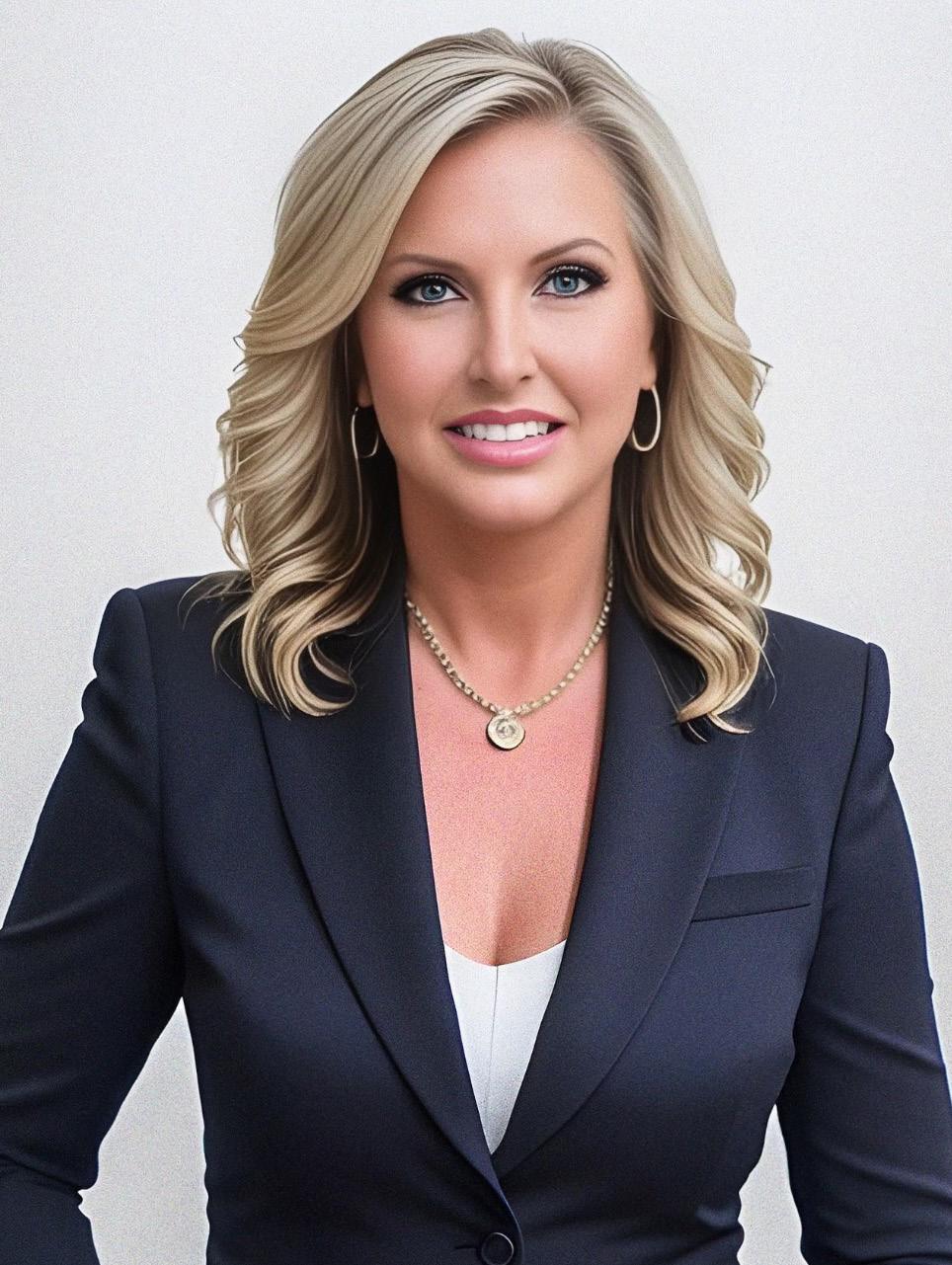 Heather Baker
Heather Baker
nuggets to support such a strong industry that gives so much back to Arkansas (and helps land hall-of-fame coaches and five-star players).
Finally, it wouldn’t be May without a nod to the hard-working moms out there. We salute the women who juggle it all — family, home and career — and make it look easy, whether their “C-suite” is a corner office or a corner nook at home.
As a working mother myself, I understand the challenges of keeping everything in balance, and I salute every mother out there who gives so much of herself to her job, family and community.
Thanks for picking up this issue and taking us along as you head into your summer adventures. Happy Mother’s Day to all! Hit me up with any comments or story ideas at HBaker@ARMoneyandPolitics.com.
Each year, more than 110,000 women in the United States are diagnosed with gynecologic cancer. The Centers for Disease Control and Prevention defines the disease as “any cancer that starts in a woman’s reproductive organs” and includes five primary types: cervical, ovarian, uterine, vaginal and vulvar.
While the five-year survival rates for gynecologic cancer have largely increased over the years, many Arkansas women still do not have access to an essential component of treatment: high dose rate brachytherapy. That can put them at a higher risk of cancer recurrence and result in adverse side effects such as urinary incontinence or more frequent loose stools, which are associated with other treatment options. The good news is that access to HDR brachytherapy is growing in Arkansas. When delivered appropriately, this effective radiation therapy option can enhance patient outcomes and improve the long-term quality of life for women facing gynecologic cancer.
What is HDR brachytherapy? Most patients have heard of or are familiar with the mechanics of external radiation therapy in which high-energy X-rays are directed at tumors from outside the body. Brachytherapy is different and often complements conventional external radiation therapy. HDR brachytherapy is a minimally invasive method of treatment that places radioactive sources in seeds or through catheters close to or within tumors. Cancer care teams can deliver the treatment to patients using an intracavity method by inserting the source into an area like the cervix or uterus using a specialized applicator or using an interstitial method in which catheters are placed directly into the tissue. The outpatient procedure allows radiation oncologists to better sculpt and target the dose of radiation provided to the patient.

risks, lack of access or other factors. When used appropriately, research shows that HDR brachytherapy can be as effective as external radiation and surgery for many different types of cancer, including gynecologic ones. Equally important, the therapy generally results in fewer short- and long-term side effects for patients. For gynecologic cancer cases, external radiation must often treat the entirety of the pelvis with a high dose. Incorporating HDR brachytherapy allows radiation oncologists to deliver very high boost doses while sparing the surrounding tissues and organs. By homing in on the tumors, brachytherapy helps reduce the frequency and severity of negative outcomes women may experience with high-dose external radiation. The finer control provided by HDR brachytherapy also allows for shorter treatment times and, by extension, less patient downtime. As the Mayo Clinic stated, that is because “a larger dose of radiation can be safely delivered at one time.”
HDR brachytherapy continues to increase in use, and for good reason. As we have seen firsthand at CARTI, this targeted radiation is an effective tool for addressing gynecologic cancers, among other conditions, and improving women’s quality of life. With this patient-centered, tailored therapy, we can reduce patients’ treatment time, minimize their side effects, and ensure a quicker and smoother return to everyday life. If Arkansas women are facing a gynecologic cancer diagnosis, they should consider talking to their health care teams, including their oncologists, about whether HDR brachytherapy may be the right option for them.
Dr. Scott CordovaToday, HDR brachytherapy is recognized by gynecologic oncologists as the backbone of treatment for patients with cervical cancer who cannot be cured by surgery. Cancer care providers also commonly use it in uterine and endometrial cancer cases following hysterectomies to decrease women’s risk of disease recurrence. However, oncologists may also consider HDR brachytherapy for patients who cannot undergo a hysterectomy due to comorbidities, preexisting
J. Scott Cordova, M.D., Ph.D., is a radiation oncologist at CARTI Cancer Center in Little Rock. He received his medical degree from Emory University School of Medicine in Atlanta and his Ph.D. in molecular and systems pharmacology from Laney Graduate School at Emory University. He completed his training in radiation oncology at Barnes-Jewish Hospital at the Washington University Medical Center in St. Louis. Cordova graduated from the University of Central Arkansas in Conway with a bachelor’s degree in chemistry. He is board-certified by the American Board of Radiology.

In the realm of family businesses, succession planning takes on a unique significance. These organizations often have a rich legacy of traditions, values and expertise passed down through generations. However, ensuring a seamless transition of leadership from one generation to the next can be filled with challenges as family dynamics, emotions and business complexities come into play. Succession planning for generational businesses requires careful forethought, open communication and a strategic approach to preserve the family legacy while positioning the business for future growth and sustainability.
It may seem obvious, but preserving the family legacy is only one consideration for a multi-generational business. You must also be profitable so members of each generation can feed themselves while they carry the weight of that legacy. The honor of continuing a business that your family began three, four or even more generations ago can be an incredible thing. You can walk in the footsteps of your ancestors, literally. However, that does not mean you should automatically assume your children will want to follow in yours. Instead, you should build a good business first — one that is desirable to anyone — and then hopefully bring your adult child into the business as soon as you can according to a specific game plan. Sometimes you should have them start at an entry-level position and spend years working their way up. Other times, you should bring them into a position of leadership immediately. Either of those methods comes with challenges but the important thing is that you have a plan that spans from their entry to your exit. Be prepared to adjust that plan constantly.
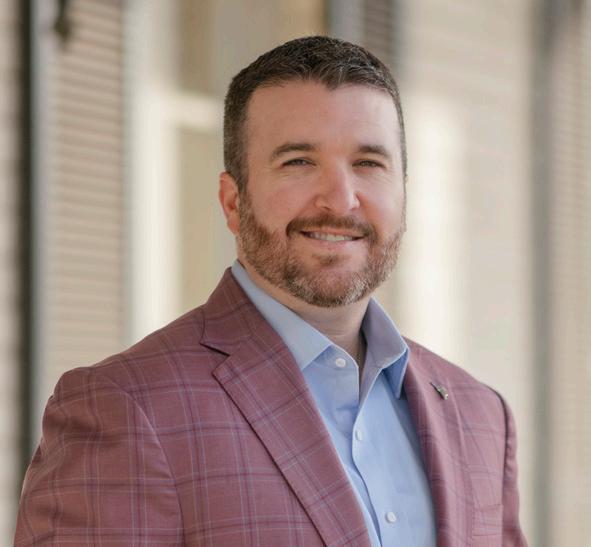
Good succession planning provides opportunities for younger family members to develop leadership skills, gain hands-on experience, and earn the trust and respect of stakeholders. It fosters a sense of ownership and responsibility, empowering successors to steer the business towards future prosperity. The right succession plans help manage expectations, clarify roles and responsibilities, and minimize conflicts among family members. By establishing transparent governance structures and communication channels, generational businesses can navigate sensitive issues and foster harmony within the family and the business.
• Succession planning is a long-term endeavor that requires early engagement and ongoing communication among family members. Begin the conversation about succession well in advance, addressing concerns, aspirations and expectations openly and transparently.
• Identify and develop successors by assessing the skills, interests and aspirations of potential successors within the family. Provide them with opportunities for education, training and mentorship to groom them for leadership roles. Encourage them to gain diverse experiences both within and outside of the business. A preemptively placed successor can facilitate a seamless transition.
• Establish clear governance structures, decision-making processes, and mechanisms for resolving conflicts within the family and the business. Develop formal policies, agreements and succession plans that outline the criteria for leadership succession and the roles of family members in the business. “Handshake deals” among family members are a breeding ground for disappointment.
• Seek neutral external expertise such as a professional succession planner to provide objective guidance and support in succession planning. Their expertise will help navigate complex legal, tax and financial considerations while facilitating constructive family discussions.
Succession planning in generational businesses is a delicate balancing act that requires foresight, collaboration and a deep commitment to an extended process. As the current owner of the business, you must balance the need to honor your family legacy while being open to changes that the next generation might seek to enact. Ultimately, it is critical to focus on the business first, ensuring that it is healthy and prepared to operate for decades into the future. The strength of the business and the strength of your plan will make or break this transition, and if you do it right, you will make your own shoes much easier to fill.
Victor Werley, CFP, ChFC, CDFA, CVA, MAFF, CFE, CEPA, is a financial consultant in Little Rock and the founder of Pinnacle Advisors. Werley has been practicing for over 20 years and has managed hundreds of business transitions for himself and his clients. He has spoken to numerous groups in the business and legal fields about business valuation, how to structure good business deals and many other topics. He is passionate about small businesses and helping the economy of Arkansas.
Today, artificial intelligence is being touted as a magic panacea for nearly every industry. The future of logistics, medicine, manufacturing and precision agriculture are said to be on the verge of a new technological leap. In fact, the practicalities of machine learning are already being applied in research, for which the problem-solving aspect of ML methods are saving scientists time — and opening new doors of discovery, especially for the next generation of innovators.
“Several students told me that they used ChatGPT to help them install and get working the R-BioTools software that we used for the course,” said David Ussery, Arkansas Research Alliance Academy member and professor at the University of Arkansas for Medical Sciences in Little Rock. “From my perspective, this is a good, productive use of ChatGPT for help in troubleshooting things like getting programs to work.”
Time is among a researcher’s most precious resources, and it is often spent on the minutiae of time-consuming activities such as trying to get the experiments to work, calibrating software, keeping up with the scientific literature or more complex tasks such as cleaning up large messy sets of biological sequence data. What ML methods can do for young researchers is greatly reduce the time spent waiting for data analysis. These machine learning tools have been used in bioinformatics since the 1980s and are especially helpful at condensing and working with large datasets. Today, that is particularly relevant. A single dataset can amount to terabytes of information and traditional methods from the past would now take millions of years to complete. If done properly, clever tricks using ML methods can make comparisons in a few seconds.
Health care is an especially prolific creator of data. One patient alone generates data from many sources such as intake forms, doctor’s notes, records and observations. In addition, electronic health care records include data points generated by portable ultrasound machines, patient monitors and pacemakers, as well as genome sequences and more.
“In 2023, about 175 zettabytes of biomedical data was produced. That’s 10 to the 23rd power bytes,” said Ussery, whose lifelong publications in the field has placed him in the top 0.05 percent of scholars in the world. “From the very beginning of humanity to the year 2003, an estimated 5 exabytes of digital information was created, which corresponds to 0.5 percent of a zettabyte.”
This means that in the past 20 years, we have created 350 times more digital information than everything that was digitally recorded previously.
That’s a big pile of information — too much for even the most dedicated researchers to parse without powerful AI tools and some old-fashioned human collaboration. To address the latter, Ussery is a member of DART — Data Analytics that are Robust and Trusted — which was created through a $20 million National Science Foundation grant.

DART operates as Arkansas’ true multi-institution, multidisciplinary data research center in which faculty and students from campuses across the state work together on targeted problems important to the research community and the economy of Arkansas. Ussery is the principal investigator for DART funding — currently budgeted at about $240,000 per year — for graduate students at UAMS. Last year, UAMS graduated six DARTfunded Ph.D. students.
Generative AI tools like ChatGPT and statewide collaborations like DART enable the next generation of Arkansas researchers to excel in a highly competitive and much-valued position in the innovation economy. Most of Ussery’s Ph.D. students find jobs in industry, and all have had their choice of several good job offers, he said. Skilled workers in bioinformatics are in short supply because there are more jobs than qualified people. According to the Bureau of Labor Statistics, employment of data scientists is projected to grow 35 percent from 2022 to 2032, significantly outpacing the growth of all occupations in the United States.
For Ussery, a native Arkansan, fostering the next generation of researchers is grounded in a more personal form of satisfaction.
“I live my life vicariously through my students,” he said. “I really enjoy helping them learn to tinker, troubleshoot and recover from their failures. Many of my students have been far more successful than me in terms of publications and funding.”
Discovery Economics is a monthly feature highlighting the work of the Arkansas Research Alliance’s ARA Academy of Scholars and Fellows, a community of strategic research leaders who strive to maximize the value of discovery and progress in the state. Learn more at ARAlliance.org.

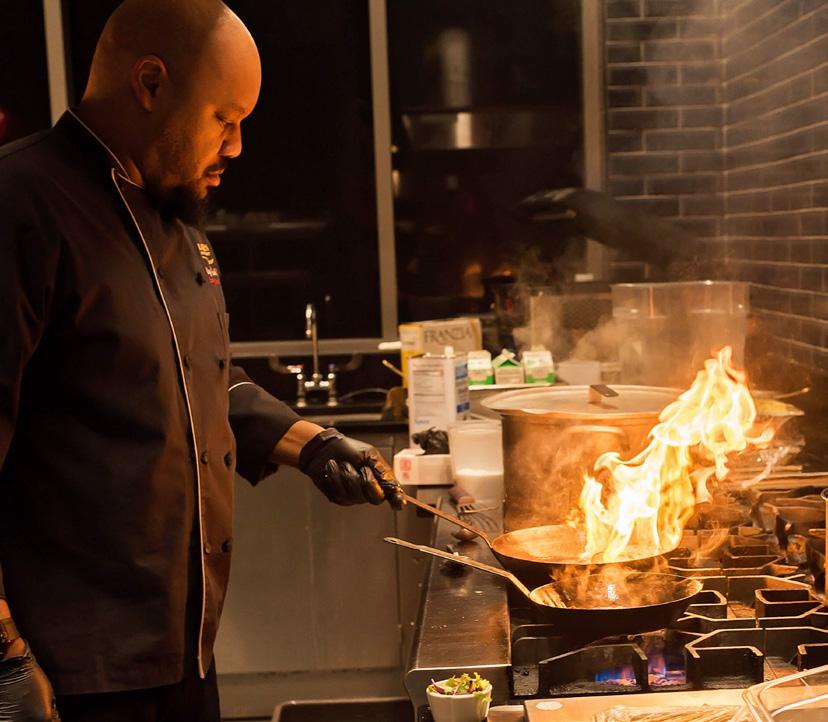

Since opening in Pine Bluff in 2020, Saracen Casino Resort has become known not only for gaming, but for top-notch restaurants such as Red Oak Steakhouse. However, the casino resort’s culinary prowess would not be possible without those who direct the course of the cuisine, such as executive chef Manley Clark.
“Under the culinary leadership of our executive chef, Manley Clark, excellence is not just a goal — it’s a daily achievement that delights our guests and sets new standards in the world of hospitality,” said Todd Gold, senior director of hospitality.
Clark grew up in the Union Chapel community of Springfield, where he learned about the relationship between food and family at the country home where he lived with his grandmother.
“She and her sisters always cooked Sunday dinners together, and I always watched them cooking Sunday dinners, so that really spurred my love for cooking,” he said. “I just built my whole career around that as I progressed in life.”
“My vision is to create the best culinary experience in the Southern region,” he said.
His top recommendation to guests is fried oysters at Red Oak.
“It’s our top-selling appetizer,” he said. “It’s just phenomenal.”

His soul food background met classical culinary training at the University of Arkansas-Pulaski Technical College Culinary Arts and Hospitality Management Institute in Little Rock, where he met Gold, then dean, who helped recruit him to Saracen in 2020. Clark previously worked at Hilton Garden Inn hotels and Tacos 4 Life.
As executive chef at Saracen, he heads up recipe development and team development as he guides the culinary footprint of the resort.
Manley ClarkA people person who believes in leading from behind, Clark is eager to see his staff develop after the completion of Saracen’s phase 2 with the hotel and event center’s planned opening in fall 2025.
“The thing I’m most excited about is being able to see the growth of my team,” he said. “I have chefs now and sous chefs in positions that I am just waiting to see blossom in new positions as they open up when phase 2 is completed.”
If watching people he leads turn into leaders themselves is his proudest professional accomplishment, watching his children grow is his proudest personal achievement. With four children and a fifth expected, he said he works to instill in them the value of hard work.
Growing up poor in rural Arkansas, Clark dealt with food insecurity as a child, and he said he would like to one day open a soup kitchen where children can receive meals after school.
“My goals are eventually to branch out into entrepreneurship,” he said. “That doesn’t necessarily mean that I’m going to leave Saracen, but I do have an entrepreneurial spirit, so I’ve always wanted to do something where I can work for myself and be able to provide for the community.”
Arkansas is the Natural State, but it is undoubtedly also a poultry state.
The value of all the broilers, eggs and turkeys produced in Arkansas delivers an annual economic impact of $6.7 billion to the state.
Arkansas is No. 3 in the nation in broiler production and value, No. 3 in the nation for the number of turkeys produced, and No. 7 in the nation for egg production value. More than 6,500 farms in Arkansas produce some type of poultry. Together, they produce 1.03 billion broilers, 27 million turkeys and 3.9 billion eggs each year.

The Poultry Federation, the advocacy group started in Little Rock that represents industry producers, processors and service providers in Arkansas, Missouri and Oklahoma, is hosting the 64th annual Poultry Festival June 21 and 22 in Rogers. The event is one of the most anticipated annual gatherings in the U.S. poultry industry.
Inside, Arkansas Money & Politics includes the festival program, which will be distributed at the event, and coverage of the Poultry Federation, its processors and allied members, and its scholarship program that benefits students looking to launch careers in the industry.


Arkansas produces some eye-opening numbers related to its robust poultry industry, which entails the production of broilers, eggs and turkeys.
The state ranks third in the nation in broiler production and value, third in the country for the number of turkeys produced, and seventh nationally for egg production value.
The value of all the broilers, eggs and turkeys produced in Arkansas each year is a whopping $6.7 billion, but the economic impact of the industry in the Natural States extends far beyond, said Marvin Childers, president of the Poultry Federation, a nonprofit advocacy group that represents producers, processors and other industry representatives in Arkansas, Oklahoma and Missouri. Roughly 158,000 jobs are supported by the industry in Arkansas in 2024, according to the federation’s most recent data, and state jobs related to broiler production alone pay an average of $57,100 in annual wages and benefits.
Childers said the credit goes to the producers, processors and service providers his group represents.
“The Poultry Federation has been around since 1954 and has been fortunate to have every poultry and egg company as a member,” he said. “Our membership is also blessed with over 300 allied members who sell goods or provide services to the poultry and egg companies. The federation board members understand the importance of our organization, and just as our predecessors did, we take seriously our mission to promote and protect the poultry and egg industry.”
As the federation celebrates its 64th annual Poul-
DUANE WEEMS ON INDUSTRY CHALLENGES AND OPPORTUNITIES:
There are many opportunities in today’s ever-changing world. Two of these are poultry health/biosecurity and sustainability. Biosecurity is always at the forefront of our management practices, and recent disease challenges make this even more of a priority. Also, we must continue to operate in a sustainable manner. Therefore, we must look for ways to continually improve.
try Festival June 21 and 22 in Rogers, food safety will continue to be its top priority.
“We will also continue our efforts with workforce development issues by supporting [Arkansas State Chamber of Commerce labor recuitment program] Be Pro Be Proud,” Childers said. “We must be mindful of the supply and demand of all poultry and egg products and continue to look at how we sustainably continue to provide the safest, most abundant and most affordable food products that feed the world.”
Keith Smith, vice president of sales at Keith Smith Co. in Hot Springs, the federation’s incoming board chair, will replace Duane Weems, live operations manager at Peco Foods in Pocahontas. Like Weems, Smith has served in every board officer position.
Childers said Weems and Smith have been reliable leaders for the federation.
“Duane is one of our go-to guys when we need expertise and advice at the federation,” he said. “He oversaw the planning and construction of the Peco processing plant in Pocahontas and the Peco feed mill in Corning in 2016. Duane has been an outstanding chairman and will continue to serve on our board and executive committee.
Smith will follow in his father’s footsteps as board chair. Jim Smith served in multiple board positions, including his stint as chair in 2017 and 2018.
“Keith has grown up in the hatching egg industry and observed his father’s service on the Poultry Federation board for many years,” Childers said. “Keith has the leadership skills to lead our board and will bring fresh ideas to what we as a board need to focus on. He is a hands-on person and is looking forward to leading the board as we prepare for the 2025 legislative session.”
Weems said he is leaving the board in good hands and that the future of the industry looks bright.
“The Poultry Federation works hard to make a positive impact for the industry, customers and states where our members do business,” he said. “We have seen the federation grow through outreach and educational programs such as the festival, the Food Safety Conference and the symposium to name a few. Being aligned with such a dynamic network is invaluable.”
Smith said he is looking forward to carrying on the work of his father, Weems and others.
“My dad was involved in the Poultry Federation for decades, and it’s been an honor to serve on the board with Marvin Childers and his team,” he said. “Our family business is completing 80 years in operation this year, and we spend a lot of time talking about our purpose, vision, mission and stewardship — how we manage the company’s talents with a servant’s heart. My vision for the Poultry Federation is do my part with others in guiding the federation for continued long term success for the poultry industry where it is today, as well as where it will be in 15 years.”
The industry has addressed concerns and made strides on food safety by implementing a total systematic approach to mitigate risk. Examples are the use of in-process monitoring and process control versus finished product reaction, multihurdle pathogen control programs, and the use of advanced technology as they become available.
This year’s Poultry Festival will serve as the symbolic transition to Smith’s term as chair. For the industry, even beyond the Poultry Federation’s three-state footprint, it also serves as a celebration of the field — the producers, processors and service providers — and the impact they have on local communities. Within the industry, it is an event marked on every calendar.
Toby Tapp, complex manager for Wayne-Sanderson Farms’ Danville facility, even likened it to a family reunion.
“The poultry festival is a celebration of the poultry and egg industry, and it’s a highlight for us every year — a chance to network, see people we work with from across the state and nation and come together as an industry and industry supporters,” he said. “Poultry is at the center of the Arkansas economy, and it impacts so much more than just the producers like WayneSanderson Farms. It’s kind of like a family reunion — producers, farm partners who grow our chickens, local businesses, area contractors, suppliers and even consumers. We’re all connected to the poultry business, and the festival is a fantastic opportunity to champion the industry while visiting with old friends.”
Shane Acosta, assistant vice president and general manager at Cargill in Springdale, said he is unaware of any industry event as robust and effective as the Poultry Festival.
Our industry is one of the most efficient in the world at providing nutritious, safe and affordable proteins — so efficient, in fact, that turkey, eggs and broilers require on average 33 percent fewer feed inputs per pound than the next most efficient protein, pork. I believe we can do a better job of communicating our industry’s role in stewarding natural resources to feed our communities, our nation and beyond.
“It holds immense significance for producers and processors in the poultry industry as it offers a prime opportunity for market exposure, networking and brand promotion,” he said. “The Poultry Festival serves as a platform for showcasing prod-
ucts, engaging with consumers and gathering valuable market insights. Additionally, the festival fosters community connection and supports local economies, making it a crucial event for industry stakeholders to enhance visibility, forge partnerships, and stay attuned to consumer preferences and market trends.”
The festival will include the annual scholarship auction, which raises money for the Poultry Federation’s Allied Industries scholarships through items or experiences donated by industry stakeholders. For the 2023-2024 academic year, the federation distributed $156,000 in scholarships to 24 undergraduate and 17 graduate students pursuing industry-related careers in Arkansas, Missouri and Oklahoma.
Acosta, who launched the federation’s annual Food Safety Conference, said the scholarships represent one of the federation’s most important roles.
“The scholarship auction is of paramount importance as it provides significant opportunities for supporting the educational pursuits of students within the poultry industry,” he said. “These scholarships not only alleviate the financial burden for students but also facilitate access to education and career advancement opportunities within the industry. Moreover, the auction fosters a sense of community and collaboration among industry members as they come together to invest in the future talent of the poultry sector. Overall, the scholarship auction serves as a vital mechanism for pro-
moting education, fostering talent development, and ensuring the continued growth and success of the poultry industry.”
Childers said the poultry industry, like any other, has its challenges, but he lauded the work of federation members who understand the industry’s vital role.
“I have served as president of the Poultry Federation for the past 17 years, and it is an honor and privilege to work with an organization that believes in our mission,” he said. “Our members are some of the most dedicated members, and we strive daily to meet the mission. We are also fortunate to have our Little Rock staff, Holly Duval, director of marketing and business development, and Annie Hounsel, business operations coordinator, who both do an excellent job. We could not do what we do without them.”
The investment in time and resources we put into the federation has had exceptional returns. The business environment that the state of Arkansas provides to our company and growers to operate in is a key part of the recipe for success, and the function that the federation serves in protecting and promoting those interests is paramount. Part of our company’s longevity can be attributed to good partnerships; we see value in the federation’s support and representation of our allied industry members and their efforts to help create one of the most robust food supply chains in the nation.
ARKANSAS RANKS THIRD IN THE NATION IN BROILER PRODUCTION AND VALUE.
• Number of broilers produced: 1.03 billion
• Pounds produced: 7.44 billion
• Value of production: $5.31 billion
• The broiler industry creates and supports 143,078 jobs in the state.
• In 2022, the industry was responsible for as much as $35.03 billion in total economic activity throughout the state.
• Jobs in this industry subset pay an average of $57,100 per year in wages and benefits.
ARKANSAS RANKS THIRD IN THE NATION FOR THE NUMBER OF TURKEYS PRODUCED.
• Number of turkeys raised: 27 million
• Pounds produced: 542 million
• Value of production: $510 million
• The turkey industry creates and supports 13,399 jobs in the state.
• In 2022, the industry was responsible for as much as $3.36 billion in total economic activity throughout the state.
• Jobs in this industry subset pay an average of $51,700 in wages and benefits.
ARKANSAS RANKS SEVENTH IN THE NATION FOR EGG PRODUCTION VALUE.
• Number of eggs produced: 3.9 billion
• Value of production: $843 million
• The egg industry creates and supports 1,162 jobs in the state.
• In 2022, the industry was responsible for as much as $327.84 million in total economic activity across out the state.
• Jobs in this industry subset pay an average of $43,000 per year in wages and benefits.
MORE THAN 6,500 FARMS IN ARKANSAS PRODUCE SOME TYPE OF POULTRY.
• Benton County is the No. 1 poultry-producing county.
• Other top production counties in rank order: Washington, Madison, Carol, Yell Hempstead, Howard, Sevier and Logan.






Saddle up and get ready for a galactic “eggspedition” beyond the frontier — the 64th Annual Poultry Festival in beautiful Rogers, Arkansas.
For six decades, the Poultry Federation has hosted the annual event, which celebrates the poultry and egg industry at its finest. We are happy to welcome members and friends of the industry from all across the country. Last year’s event saw 4,500 tickets sold for the festival and impacted the Rogers economy by $4.19 million.
This year’s two-day festival offers a variety of activities that are great for networking, team building and socializing. Activities include a golf tournament, a trap shoot tournament, a bass tournament, a scholarship auction, an industry awards ceremony, an all-member cooking competition and the Arkansas 4-H state cooking competition. The festival concludes with the always-popular festival concert.
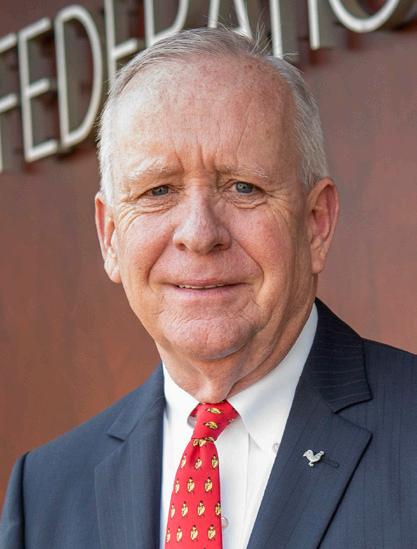
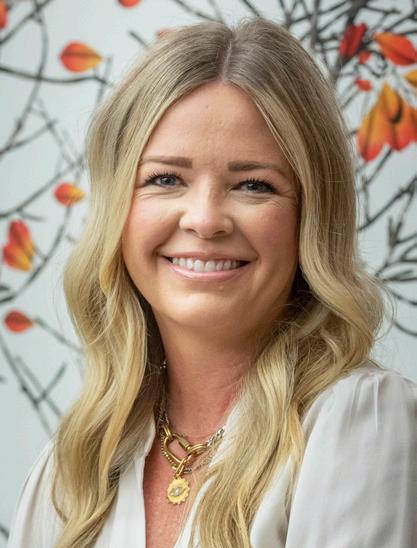

We are particularly excited to feature our entertainment for the 64th Annual Poultry Festival, which is headlined by Chris Lane with special guests Danielle Bradbery and Arkansas’ own Marybeth Byrd. The talented and award-winning performers will take the stage June 22 at the Walmart AMP.
This event celebrates you. Your hard work and dedication to your craft is what has made the poultry industry an economic powerhouse in your hometowns and home states, creating jobs and, most of all, the nutritious, sustainable proteins that feed the nation.
On behalf of the Poultry Federation staff and board of directors, it gives us great pride to welcome each and every one of this year’s attendees to Rogers.
MARVIN CHILDERS President HOLLY DUVAL Director of Marketing and Business DevelopmentFriday, June 21
Highlands & Scotsdale Golf Courses, Bella Vista
The annual festival golf tournament is one of the most popular events that takes place during the two-day festival. Participants use the opportunity to pair up with industry members to enjoy a morning of golf and the chance to win one of the many prizes offered.
This year’s sold out festival golf tournament will take place on Friday, June 21 in Bella Vista on two courses: Highlands and Scotsdale. Lunch will be served at each course, followed by an awards ceremony.
• Tee time: 8 a.m.
• Shotgun start Awards:
• $600 for first-place team (Flight A & B) at each course
• $300 for second-place team (Flight A & B) at each course
• $200 for third-place team (Flight A & B) at each course
• $75 for closest to the pin at each course
• $75 for longest drive at each course
Friday, June 21
Outlaw Ridge, Pineville, Missouri
Back by popular demand, the trap shoot offers plenty of bang for the cluck. Enjoy a day of friendly competition and networking with friends and colleagues while taking aim at fantastic prizes on the shooting range, plus a special raffle and a selection of door prizes.
A special thank you goes out to Clear View Farm Services and Chore-Time for sponsoring lunch following the competition and to Legacy National Bank for hosting the grand prize raffle at the conclusion of the tournament.
• Check-in: 7:30 a.m.
• Tournament: Starts at 8 a.m.
• Lunch will be served at the conclusion of the tournament, followed by the awards ceremony and door prizes.
Awards
• $500 first-place team
• $300 second-place team
• $200 third-place team
• $500 top gun
• Legacy National Bank Raffle
• Participants will have an opportunity to win $1,000 and $500.
• Registration fee: $100 per individual
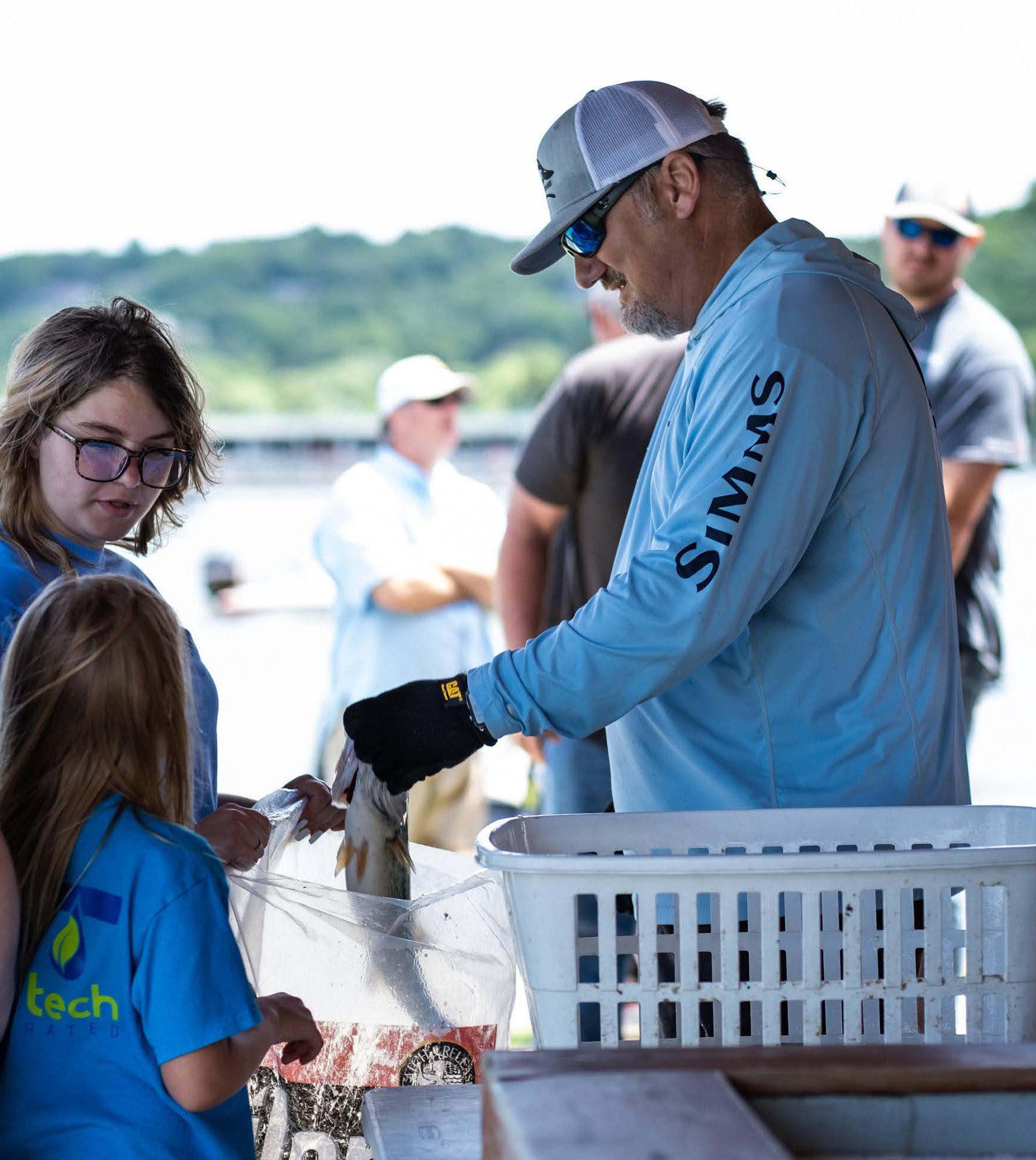
Friday, June 21
Prairie Creek Marina at Beaver Lake, Rogers
The annual festival bass tournament is another fan favorite of the festival events. Participants compete in two-person teams to see who can catch the biggest and smallest bass. This event is a great opportunity to pair up with industry members or compete with family and friends.
Lunch will be provided by WaterTech at the conclusion of the tournament, followed by an awards ceremony and the opportunity to win door prizes.
• Check-in: 5 a.m.
• First boat launches at 6 a.m.
Prizes Awarded
• $2,000 first place (total weight)
• $1,000 second place (total weight)
• $500 third place (total weight)
• $500 first place (biggest bass)
• $250 second place (biggest bass)
• $100 third place (biggest bass)
• $250 smallest bass
• Registration Fees: $150 per team (maximum: two people per boat)
Saturday, June 22
Grand Ballroom, Rogers Convention Center
For more than 20 years, the Poultry Federation has provided scholarships to deserving young people interested in pursuing a career in the poultry and egg industry. For the 2023-2024 academic year, the federation awarded a total of $156,000 in scholarships to 24 undergraduate and 17 graduate students in Arkansas, Missouri and Oklahoma.
Last year’s Allied Industries Scholarship Auction raised a record $135,000, and we are looking to surpass that total in 2024. All proceeds from the auction are applied to The Poultry Federation Scholarship fund to provide scholarships to students in the tri-state region as well as support the 4-H and National FFA Organization chapters in Arkansas, Missouri and Oklahoma.
Thank you to all who have so generously supported this great cause.
Saturday, June 22
Rogers Convention Center Parking Lot
Who has got what it takes to be called Grande Champion? Every year, we find out through our annual cooking competitions in which talented cooks whip up some delicious creations.
The Arkansas 4-H Barbecue Contest features the best young grillmasters in a head-to-head competition. The competitors have qualified through county competitions to advance to the state level, bringing the best of the best to the annual festival.
The All-Member Cooking Competition allows members of The Poultry Federation the chance to strut their stuff and present their best dishes. Participants will also show their skill in the booth competition, and this year, we anticipate an eggcellent display of the Wild West with a little bit of the terrestrial cosmos.
Saturday, June 22
Walmart AMP, Rogers
Bringing the Poultry Festival to a close once again is our star-studded concert, this year featuring three talented musical acts. Join us for an evening of great music and wholesome entertainment at one of the premier concert venues of the mid-South.


One of music’s brightest young stars, Chris Lane grew up in North Carolina, where he and his twin brother both played college baseball at the University of North Carolina at Charlotte. He first gained prominence when he and his brother, Cory, auditioned for the seventh season of American Idol in 2007. Upon being discovered and signed to Big Loud Mountain, he fronted the Chris Lane Band, which charted the album Let’s Ride in 2012.
His debut single as a solo artist, “Broken Windshield View,” was released to country radio in 2014 and sold 11,000 downloads in its first week of release, reaching No. 45 on the Billboard Hot Country Songs chart. His solo debut album, Girl Problems, dropped in August 2016 and included the singles “Fix” and “For Her.” Lane followed that up with the album Laps Around the Sun, which produced the duet “Take Back Home Girl” featuring Tori Kelly, and “I Don’t Know About You.” In 2019, he scored his third No. 1 single with “Big, Big Plans.”
With numerous industry awards and tours with national acts Florida Georgia Line, Brad Paisley, and Dan + Shay under his belt, Lane has firmly established himself as a bona fide musical star. His latest effort, last year’s EP From Where I’m Sippin’, is his first release for Red Street Records/Voyager Records and includes the acclaimed breakup single, “Find Another Bar.
Texan Danielle Bradbery became an instant musical force when she won The Voice in 2013. At just 16 years of age, she was at the time the youngest contestant to win the popular televised competition, and she has not slowed down much in the time since.
A month after she won The Voice, Bradbery released her debut single, “The Heart of Dixie,” and later in 2013, she released her first studio album, the selftitled Danielle Bradbery. Also that year, she made her Grand Ole Opry debut at the Ryman Auditorium in Nashville and was the supporting act for Brad Paisley. She has since released a string of singles, including “Friend Zone,” “Sway,” “Worth It,” “Goodbye Summer” and “Playing with Fire,” which she recorded with Thomas Rhett. She also released the albums I Don’t Believe We’ve Met (2017) and In Between: The Collection (2022). Her latest single, “Younger and Wiser,” was released in April.


The pride of the Natural State, Marybeth Byrd stunned judges on not one, but two television singing competitions, reaching the semifinals on season 17 of The Voice in 2019 and the top 10 of America Idol’s season 21 in 2023. Byrd’s angelic voice and powerful delivery has thrilled audiences ever since her youth in tiny Armorel. There, she first began channeling her God-given musical talent as a way to overcome stuttering. Today, her sound seamlessly blends shades of country, Christian and pop into a unique mix that is entirely her own.
In addition to regularly performing, Byrd is also passionate about helping others find their voices and teaches vocal lessons in between a busy schedule of performances and developing original music. Her single, “People Pleaser,” is a powerful ode to reclaiming one’s identity and stays true to her core of telling stories with truth and grace through her music.
Danielle Bradbery MARYBETH BYRD

THURSDAY, JUNE 20
8 a.m. to 5 p.m. Information desk open Rogers Convention Center Main Entrance
FRIDAY, JUNE 21
8 a.m. to 6 p.m. Information desk open Rogers Convention Center Main Entrance
6 a.m. to 2 p.m. Fishing tournament
Lunch at noon Prairie Creek Marina, Beaver Lake
8 a.m. to 2 p.m. Trap shoot Lunch at noon Outlaw Ridge, Pineville, Missouri
7 a.m. to 10 a.m. Golf tournament
Lunch at noon Highlands and Scotsdale golf courses, Bella Vista
1 p.m. to 5 p.m. Allied Industries Scholarship Auction View silent and live items; Ambassador
4 p.m. to 9 p.m. Yarnell’s Ice Cream and photobooth open Grand Ballroom, Rogers Convention Center
5:30 p.m. Hors d’oeuvres and cocktail reception
6:30 p.m. Presentation of industry awards
7 p.m. Live scholarship auction Grand Ballroom, Rogers Convention Center

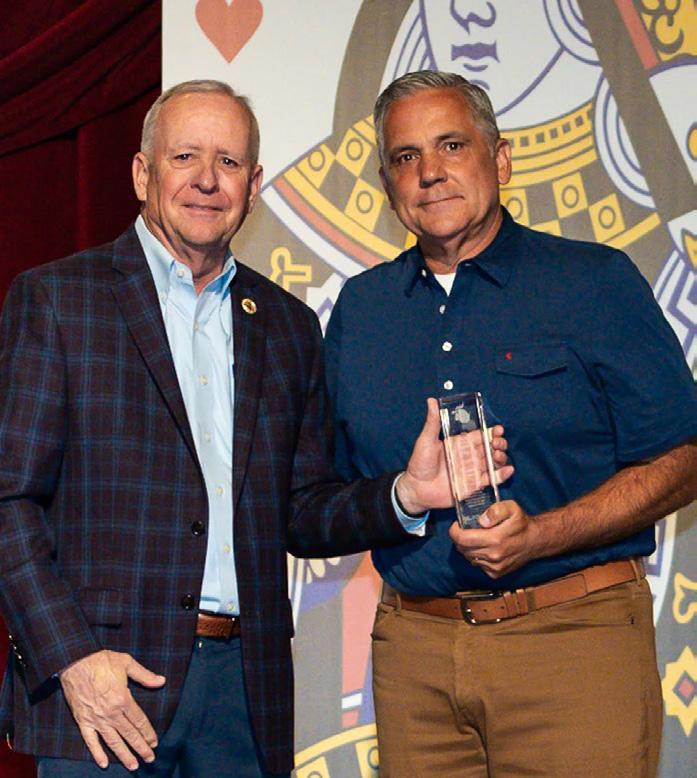




SATURDAY, JUNE 22
8 a.m. to 6 p.m.
8 a.m. to 8:30 a.m.
8 a.m. to noon
8 a.m. to noon
10:30 a.m. to 2 p.m.
Noon to 2 p.m.
Information desk open Rogers Convention Center Main Entrance
Chief cooks meeting Ambassador Ballroom A, Rogers Convention Center
Auction items available for pickup Information desk
State 4-H Barbecue Contest
Rogers Convention Center Parking Lot
Festival All-Member Cooking Competition
Rogers Convention Center Parking Lot
Festival booth judging
Rogers Convention Center Parking Lot
Noon to 6:30 p.m. Yarnell’s Ice Cream and photobooth open North Rotunda, Rogers Convention Center
5:00 p.m. to 6:30 p.m. Buffet dinner and cooking competition Presentation of awards Grand Ballroom, Rogers Convention Center
FESTIVAL CONCERT, WALMART AMP
5:30 p.m.
Gates open
6:30 p.m. Marybeth Byrd
7:30 p.m. Danielle Bradbery
8 p.m. Chris Lane

TITLE — $25,000



PRESENTING — $15,000



PREMIER —
$10,000
PRINCIPAL —
$5,000
Best Veterinary Solutions
Bunzl
PATRON —
$3,000
Adisseo
Aviagen
Boehringer Ingelheim
Conveyor Technology
D&F Equipment Sales

Cobb-Vantress International Paper


VDG
Zoetis
Imperial
J.B. Hunt
Kerry
Linde
Malone’s Mechanical
Amcor Flexibles North America
Azomite
Bank OZK
Clear Creek Golf Car + Utility Vehicles
Farm Credit
Midland Industrial Services
Pilgrim’s
Waste Management
Wire Belt
H.I.S.S. Security
Kemin
Peco Foods
SUPPORTER —
$1,500
Arvest Bank
Clear View Farm Services
Donahue-Corry Associates
Intralox
Lubing Systems
Marel
ONCE Innovations
Radiophone of Northwest Arkansas
RefrigiWear
Reliable Poultry
South Ark Electric
Tecno Poultry Equipment
StartKleen Legacy
The Reynolds Co.
TOLM Group
Water Tech
Wesco
TOTAL WEIGHT SPONSOR — $3,500 System Scale
LUNCH SPONSOR — $5,000
Bunzl
CORPORATE SPONSOR — $1,000
Amcor Flexibles North America
Bank OZK
Elanco
Environmental Works
Keith Smith Co.
Reliable Poultry
Univar Solutions
BIG BASS SPONSOR — $900
H.I.S.S.
HOLE SPONSOR — $150.00
Amcor Flexibles North America
A-tech
Aviagen
Big Dutchman
Boehringer Ingelheim
Bunzl
Butterball
Cargill
H.B. Fuller
H.I.S.S.
Holophane
Intralox
TOP SHOOTER — $1,750.00 Poultry Guard
TOP GUN — $1,000.00
Huvepharma
AMMO SPONSOR — $750
Aviagen
Jones-Hamilton Co.
Phibro Animal Health Corp.
Sunbelt Rentals
Tyson Foods
Do you want to show your support for the poultry industry by getting your company or organization out in front of attendees at the Poultry Festival? It is not too late to join the list of businesses helping underwrite the cost of putting on the festival while gaining valuable exposure in the process. The Poultry Federation is still accepting sponsors at various levels, providing a great way to show your support and be seen by a motivated audience.
For information on available sponsorship packages, contact Holly Duval, director of marketing and business development, at holly@ thepoultryfederation.com.
SMALLEST BASS SPONSOR — $500 Bank OZK
Kemin
Kerry
Lubing Systems
Memco/MandM Poultry
Once by Signify
South Ark Electric
Sunbelt Rentals
StartKleen Legacy
Wesco
Zinpro
Zoetis
STATION SPONSOR — $500
AgHeritage Farm Credit Services
Amlan International
Azomite
Cobb-Vantress
Diversified Agriculture
Novus International
Once by Signify
Zoetis
Legacy National Bank
Part of what makes the Poultry Festival such a successful event is the quality of auction items, door prizes and other giveaways. As such, the Poultry Federation is always looking for donated prizes to give away — and it is not too late to supply prizes for the 2024 event.
Donating prizes is a great way to engender goodwill among conference attendees for your company or organization and help add excitement and participation to the festival activities. Donating larger-ticket items to the scholarship auction also helps ensure the program raises the maximum amount of money possible to help students studying poultry science advance the industry.
Learn how to donate an auction item or prize by contacting Holly Duval, director of marketing and business development, at holly@thepoultryfederation.com.
Thank you for your support.
The partnership between Hugg & Hall and the Poultry Federation is a longstanding and integral aspect of both entities’ operations. Hugg & Hall’s involvement with the Poultry Federation and its annual festival underscores the deep-rooted connection between the company and the poultry industry, particularly in Arkansas, Missouri, and Oklahoma.
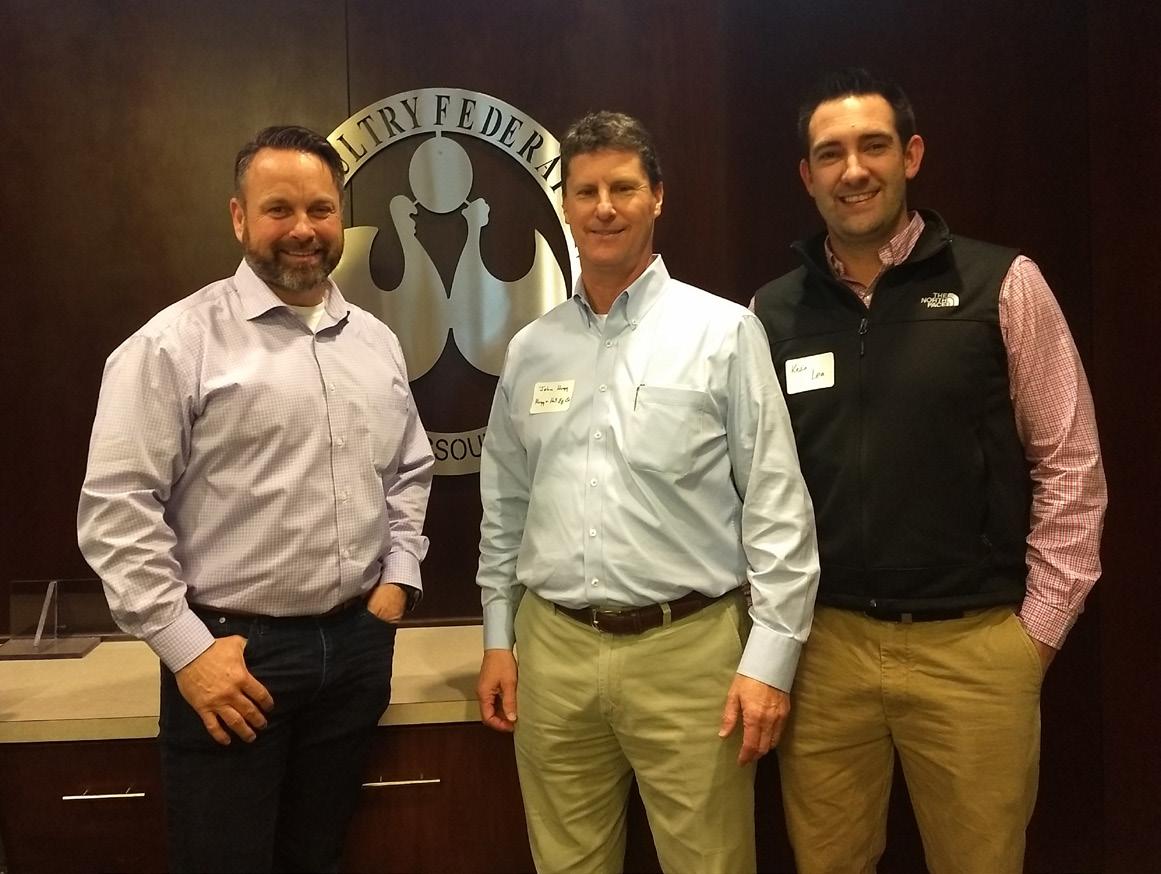



to our people. We work together to serve our communities with great care and great chicken. From investing back into the areas we serve to providing a great place to work for our dedicated team of 26,000 employees and 1,900 family farmers, Wayne-Sanderson Farms is committed to delivering a great quality of life that Arkansas can count on for the long haul.
waynesandersonfarms.com











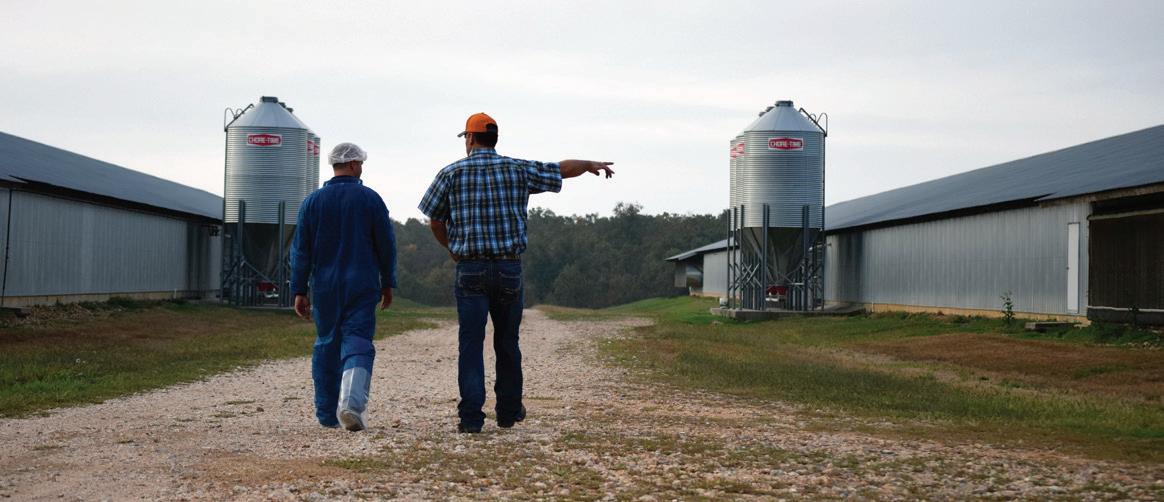













In April 2023, researchers at Cargill, a global protein provider based in Minnesota, completed a study in which they evaluated egg-wash sanitizers and reduction of salmonella contamination in turkey eggs.

The goal was to reduce any possible contamination in breeder eggs without impacting hatchability using an improved sanitation process. The study concluded that, of the six products tested, a certain peroxide was the most effective egg sanitizer by more than 73 percent. None of the sanitizers tested caused damage to the cuticle, and in each case, salmonella did not penetrate the egg.
This self-funded research represents just one example of poultry producers’ serious commitment to food safety. The Poultry Federation’s annual Food Safety Conference, which takes place each spring in Hot Springs, is one of the industry’s leading events related to food safety. Shane Acosta, assistant vice president and general manager at Cargill in Springdale, helped launch the event in 2013 and, as a longtime board member of the Poultry Federation, has led the conference each year.
“This conference supports the entire industry in providing resources to continue to improve the safety of our global food supply chain.”By Mark Carter
lied members, academia, food safety experts, food service and retail personnel to address key topics to improve the overall safety of our products from the producer all the way through to the end consumer,” he said. “This conference supports the entire industry in providing resources to continue to improve the safety of our global food supply chain.”
— Shane Acosta Cargill
The conference also represents the symbiotic relationship the federation enjoys with its member processors. Since its launch as the Arkansas Poultry Federation in 1954, the organization has taken on Missouri and Oklahoma and now represents 22 poultry and egg company members and more than 350 allied members across the United States that have operations within its footprint. Members represent all segments of the poultry and egg industry, from live production and hatcheries to marketing and ancillary service and support.
“The annual Food Safety Conference is one of the better conferences in the country that brings together industry leaders, al-
Simply put, for processors, the Poultry Federation is much more than a mere advocacy group.

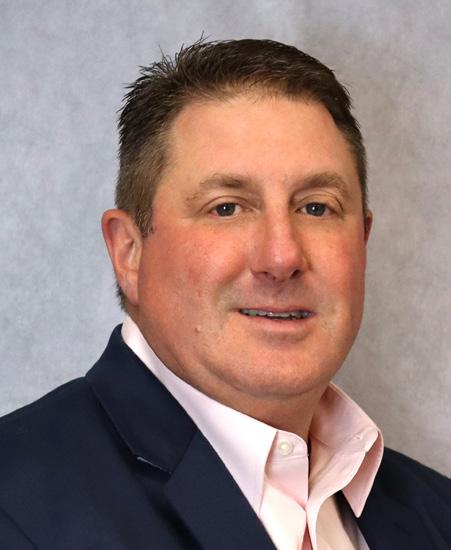
“The Poultry Federation serves as a cornerstone in molding and safeguarding the poultry and egg industry throughout Arkansas, Missouri and Oklahoma,”
Acosta said. “As a multistate trade organization, TPF assumes the vital role of being the linchpin between industry stakeholders, governmental entities and the wider community.”
Acosta said the foundation provides robust advocacy, educational initiatives, economic development endeavors, regulatory compliance assistance and fosters industry collaboration.
“TPF empowers its members to adeptly navigate challenges, capitalize on opportunities and actively enrich the prosperity of the communities they serve,” he said. “I have been a part of the board of directors for over 10 years and have never been a part of a more robust organization. At a state level, my biased opinion is that there is no other industry advocacy group with as much impact to the industry it serves as the Poultry Federation.”
Marvin Childers, president of the Poultry Federation, said Acosta has been a diligent advocate in his own right for the group.
“He has served in every officer capacity and led our Food Safety Conference since its inception,” he said. “Shane is always willing to take on the task, no matter what it is. Shane and Cargill are generous when it comes to food donations, and they provide annual gifts to various food pantries throughout the state. Shane is one of our most active members and provides leadership to our incoming board members.”
Toby Tapp, complex manager at Wayne-Sanderson Farms’ Danville facility, said the nonprofit group is a true champion for the industry.

“The Poultry Federation understands how important poultry is to our economy and the thousands of Arkansans who work in our industry,” he said. “Arkansas poultry farmers and producers like our company depend on the federation as an industry partner who understands our business and the challenges we face.”
Tapp said the federation is a unifying voice for the poultry industry and its audience, be it the public at large, the governor’s office and state legislature, regulatory and government agencies, or even local government in the communities served by the industry.
“The Poultry Federation makes sure our position is heard and the impact of our business is communicated to the people and organizations who influence decisions impacting the Arkansas poultry industry,” he said.
Tapp has been an active partner with the Poultry Federation, serving in multiple roles on its board and being one of its most active participants at the group’s annual Poultry Festival.
“Toby has been one of my closest allies when issues arise,” Childers said. “He participates in all of our events and makes sure the WayneSanderson Farms team is involved.”
In Danville, Tapp oversees an operation that can process 650,000 birds a week and includes a processing plant for fresh chicken products, as well as a hatchery and feed mill. Construction recently started on a new $43 million mill that will be able to produce almost 9,000 tons of feed weekly and serve the needs of 123 local farms when completed.
“We’re very excited to start construction on the new Danville mill,” Tapp said. “As the tallest structure in the area, it will be a local landmark. We expect to be operational and serving local growers in spring of 2025. The new mill will feature expanded storage and can mix and batch feed at 160 tons an hour. In 10 minutes, we can have a truck loaded and on the way to the farm.”
That is good news for the millions of chicken consumers in Arkansas and beyond. In 2022, broiler chicken was the most consumed type of meat in the United States, essentially doubling beef and pork, Statista states. The lead is expected to grow between now and 2033.
Turns out, chicken is what’s for dinner.
“Chicken is the most popular protein in the country, and demand continues to increase, so we’re looking forward to more growth and success in the years ahead,” Tapp said. “Working with the federation and our industry partners to address issues that affect our business, continuing to innovate and modernize farm and manufacturing processes, staying on top of consumer trends, and tapping into consumer desire for new products — these are both challenges and opportunities for us.”








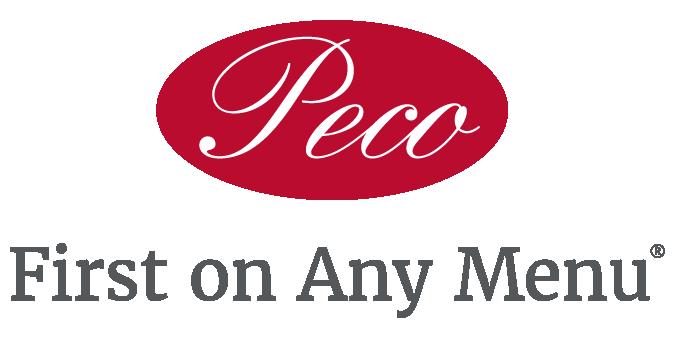






The poultry industry — the business of broilers, eggs and turkeys — has an economic impact of $6.7 billion in Arkansas, and Benton County is the No. 1 poultry-producing county in the state. It is home to Tyson Foods, which grew from a family chicken farm to the world’s largest protein producer, and George’s, one of the nation’s largest poultry and prepared foods producers, both of which were founded in Springdale and still maintain corporate headquarters there.
It is no wonder then that the Poultry Federation’s annual Poultry Festival has found a home in Rogers. Call it chicken country or poultry paradise — either tag applies to northwest Arkansas. The festival, more than any other event or conference, showcases the reciprocal relationship between the federation and its allied membership supporting the poultry industry.
The festival is one of the city’s biggest annual events and has an economic impact of more than $4 million, including more than $2 million in direct spending and more than 650 jobs supported. Last year, more than 4,500 tickets were sold for the two-day event and more than 3,000 attendees stayed the night in local hotels.
Rogers, said the producers and processors who make up the federation are good customers but have become good friends to the city, as well.
“Having a celebration of the poultry and egg industry in our community brings a spotlight on this very important sector in northwest Arkansas,” he said. “Without the poultry industry, northwest Arkansas would likely be a much different place than it is today. This industry brought — and brings — a wealth of jobs to northwest Arkansas, attracting all sorts of people to relocate here from all over, which has changed the fabric of our communities for the better.”
“Having a celebration of the poultry and egg industry in our community brings a spotlight on this very important sector in northwest Arkansas.”
— J.R. Shaw
Destination Rogers
More of the same is expected for this year’s festival, which is June 21 and 22 at the Rogers Convention Center.
Allied member J.R. Shaw, executive director of Destination
More than 300 allied members — two of whom serve on the Poultry Federation board of directors — support the organization and industry in numerous ways.
Marvin Childers, president of the Poultry Federation, called them the backbone of his organization.
“Our allied membership never ceases to amaze me when it comes to sponsorships, volunteers, committee members and participation,” he said. “We work hard to provide our members with networking opportunities, and the participation rate is always good. Our allied members support the festival in a big way,
especially the scholarship auction. We use 100 percent of the auction proceeds for scholarships in Arkansas, Oklahoma and Missouri.”
Hugg & Hall Equipment Co., which is based in Springdale and has been an allied member for close to 20 years, has become a festival mainstay that helps provide power for the festival barbecue competition and works with the scholarship auction.
“The partnership between Hugg & Hall and the Poultry Federation is a longstanding and integral aspect of both entities’ operations,” said Spencer Hale, utility services sales manager. “Hugg & Hall’s involvement with the Poultry Federation and its annual festival underscores the deep-rooted connection between the company and the poultry industry. As an allied member of the Poultry Federation, Hugg & Hall benefits from access to industry insights, networking opportunities and a unified voice in advocacy efforts.”
Hall said the festival provides a platform for all industry stakeholders to “come together, celebrate achievements and showcase innovation.” The partnership helps align the company’s business objectives with the needs and priorities of the industry and enhances its ability to serve clients effectively, he added.
“As Hugg & Hall continues to be an integral part of the poultry industry’s ecosystem, its partnership with the Poultry Federation remains a cornerstone of its business strategy, facilitating collaboration, innovation and growth within the industry,” he said.
Allied member Lindsay Brand Parker, territory sales manager with Novus International, a Missouri-based animal health and nutrition company, got started in the industry thanks in part to the Poultry Federation Allied Industries Scholarship she received as a graduate student completing her master’s degree in animal science at the University of Missouri.
She now sits on the federation’s scholarship committee.
“Shortly after starting my first job in the poultry industry, I was able to join the scholarship committee and further see the impact TPF has on students,” she
said. “The Poultry Festival is a wonderful event celebrating the success of the poultry industry from students to retirees and from academia to consumer. The amount of support TPF allied and integrator members provide to students and academia is phenomenal. The festival is a great opportunity to see the impact full circle, where many of the scholarship recipients network with an industry that truly invests in them and their future success.”
Parker said Novus’ involvement with the federation and the festival allows her and other employees to see its investment firsthand.
“It gives us full confidence that this industry is dedicated to improving poultry production and feeding affordable, sustainable protein to our families,” she said.
Parker’s late husband, Dr. Drew Parker, shared her passion for poultry. A Poultry Federation scholarship helped him pursue his degree in poultry science at the University of Arkansas in Fayetteville. He went on to earn a Doctor of Veterinary Medicine from Louisiana State University and a Master of Avian Medicine at the University of Georgia. The federation started a scholarship in his name last year.
“One scholarship can have a significant impact, and the memorial scholarship that honors Drew will provide financial support to a veterinarian student who no doubt will enjoy working in the industry as much as Drew did,” Parker said.
The relationship between the Poultry Federation and its allied membership is a mutually beneficial one. Shaw said aside from the festival’s financial impact, the city benefits simply from the exposure afforded by thousands of visitors from out of town.
“We’ve found the more people get exposed to our great quality of life, it really increases the odds of them moving here one day,” he said. “Rogers and northwest Arkansas will likely continue to need top talent in the poultry industry to relocate here for years to come to power our awesome local businesses.”
Northwest Arkansas is filled with poultry businesses, from producers and processors to service providers, he added.
“Due to the corporate offices of our poultry and egg companies being in Arkansas, our allied companies send their best and brightest here,” Childers said. “We are fortunate to have over 300 allied members who are very active in all of the federation's work.”

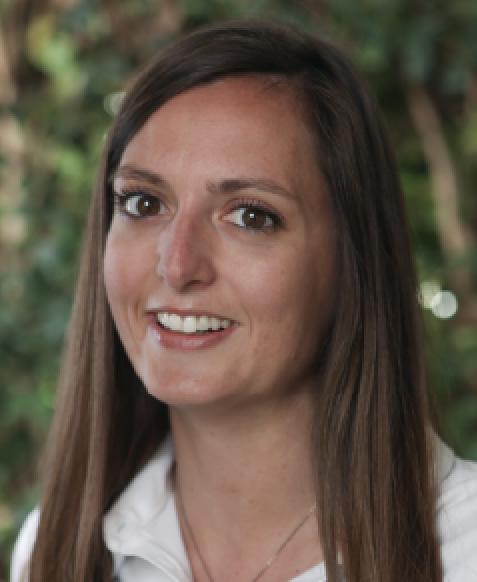
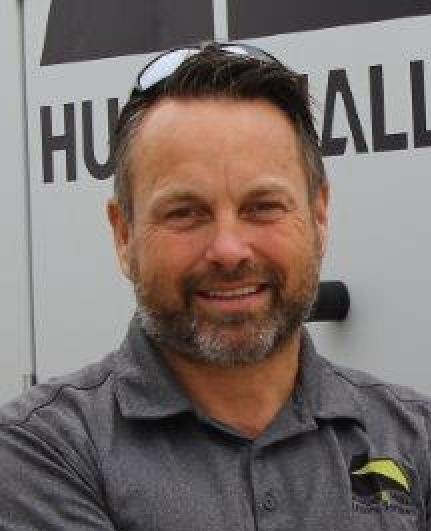
Two scholarship recipients make the most of their opportunitiesBy Dwain Hebda
The 2024 Poultry Festival, sponsored by the Poultry Federation, will bring together thousands of individuals involved in the work of raising, processing and supporting the poultry industry across three states. A cornerstone event during the festival will be the evening program June 21, which will not only hand out annual awards but feature an auction to support the Little Rock-based federation’s scholarship fund.
Of all the entertainment and events that are crammed into the two-day festival, the auction is arguably the most significant because the money raised goes to support the next generation of poultry professionals, from educators to scientists. In the 2023-2024 academic year alone, the Poultry Federation awarded scholarships totaling more than $147,000 to 30 students, said Holly Duval, director of marketing and business development. She said the goal for this year’s auction was to raise $130,000 to fund future applicants.
Savannah Wells-Crafton of Paragould is one prime example of the difference the scholarship program can make. While pursuing her undergraduate degree at Arkansas State University in Jonesboro, she learned about a dual-degree program with the University of Arkansas in Fayetteville that would require her to transfer to Fayetteville for her last year of college. Landing a Poultry Federation scholarship made it possible for her to do so, and it was at the U of A
that she discovered her true professional calling.
“When I started at Arkansas State University, I didn’t know what I wanted to do,” she said. “When I entered the [U of A] program, my interest in poultry stemmed from my interest in animal nutrition. I learned the two main components of poultry diet are corn and soybean meal, which is what my family produces on our farm, so it was like it all clicked together — this is the big picture. I loved it, and I just wanted to keep doing it.”

Now a doctoral student at the University of Arkansas who anticipates finishing in 2025, Wells-Crafton has received about $20,000 in various federation scholarships since her last year of undergraduate studies. She said she has not yet decided if she would ultimately teach or apply her education in the corporate world, but because of her ability to attend graduate school, those options and more have been brought into play. For that, she gave the lion’s share of credit to the Poultry Federation for helping to fund her education in the field she adores.
“Without this scholarship program, I wouldn’t be able to pursue my degree,” she said. “I always wanted to go to grad school, but I never wanted to go into debt to go to school, so cost was one of the big deciding factors of whether I was even going to pursue this program.
“The industry needs more people in the workforce, and I think that this scholarship program is a wonderful opportunity to help bring in students who may not have the means to afford college.”
Blake Nelson, who grew up in rural Clarksville, is also completing graduate work at the U of A. Nelson said he knew early on that he wanted a career in poultry, having come from a family that was heavily involved in the industry.
“My dad, my grandfather and my uncle all worked for Tyson Foods in various roles, and I’ve got an aunt that works for Simmons Foods,” he said. “I saw what this industry has done
for those folks in my life, and I wanted to be a part of that same industry.”
Now enrolled in the university’s doctoral program, Nelson has been the beneficiary of the Poultry Federation’s scholarship program at every step of his collegiate education. To date, the program has awarded him funds in excess of $30,000 for college, allowing him to concentrate on his studies rather than worry about how he pays for them.
“The scholarship has allowed me to put my full focus on my research and on my class studies, and I’ve been able to maintain a very high GPA as a result,” he said. “I was committed to coming to grad school anyway but probably not to the level that I have been able to because of the scholarship money I’ve received. I’m very fortunate to be allowed this opportunity.”
Nelson, who plans to enter the corporate world following completion of his studies, had one message for all who have contributed to the scholarship program.
“I would just like to tell them thank you,” he said. “They may not get to see how their contributions impact a student, but I could tell you firsthand that they’ve been put to a very valuable use. I would want them to know just how meaningful it is to be in a position like mine and to be a recipient of the scholarship and what it means to my education and future. It’s very essential.”



As humans, we all long for these rich experiences in life.”
Paul Barkley of Big Adventure Pools + Outdoor Living speaks with a passion that is hard to miss.“What we do at Big Adventure is all about giving you a space where those experiences can come to life,” he said. Paul Barkley has been in the contracting business for 25 years, 14 of which have been spent designing high-end pools and outdoor living spaces.
On the practical side, Big Adventure was created in order to give clients a one-call solution for their entire project. The team walks alongside clients every step of the way, from initial drawings to implementation and even up-keep.
At the heart of the business, though, is a dream that was cultivated over these years in the pool and outdoor living industry. “It boils down to this: when you’re sitting down on the front porch and you’re talking about the memories you’ve made, you want to look back on the big adventures of life,” he said.
Barkley explained that the mission statement of the business — experience more: quality, family, fun — is more than just words on a page or advertisement. “We’re asking, how do we help families create environments for rich experiences that provide quality, room for the family, fun and ultimately great memories?” As a luxury business owner, he understands that the true wealth of life doesn’t come from the things we buy. Rather, it comes from the life-giving moments we cultivate with those we love.
After witnessing the difficulties that often occur while creating a custom pool or outdoor space, Barkley set out to create a tailored experience for families where they can have confidence moving forward and joy in the process. This model stems from the company’s cornerstone verse, Colossians 3:23, which states, “Whatever task you must do, work as if your soul depends on it, as for the Lord and not for humans.” This value drives everything at Big Adventure Pools + Outdoor Living, from customer relations to attention to detail.
“We are very integrity focused,” Barkley explained. “Do the right thing, do it the right way, don’t cut corners, and give more than the client is expecting. I treat others as I want to be treated, and we try to do that from a customer standpoint as well. We make sure that we take care of customers to the best of our ability, as if it’s our own job.”
Fond recollections of families with finished pools and outdoor living spaces are fuel for the future at Big Adventure.
“I remember many times that the same day we’re plastering the pool, the little ones are running around while it’s still half-filled. I remember the excitement and zeal on their faces. Then, the first time we go back to those pools and check in, over and over I get to show up to kids playing in the pool and Mom and Dad hanging out on the patio with a glass of wine. There have even been times they’ve invited me to share dinner with them and enjoy what they’re enjoying — all because of what we helped them create.”
Big Adventure Custom Pools + Outdoor Living is in central Ar kansas, and serves clients primarily in Little Rock, Benton, Bryant and Hot Springs. Call 501-232-3762 or scan the QR code below to get started on your own Big Adventure.





Hospitals in Arkansas are near or at capacity, and the number of nurses needed across the state is lacking. That is not news to the health care industry, of course. What started as a trickle before 2020 became a flood of nurses leaving the profession because of an already aging workforce retiring, leading to nurses taking on more and longer shifts. That led to burnout and more nurses leaving, either by retiring early or choosing to take another career with fewer demands and greater compensation.
Now, four years after the onset of the COVID-19 pandemic, the nursing shortage in Arkansas persists, leaving the state’s hospitals grappling for ways to address the shortage and turn its course. In addition to retiring nurses, other factors contributing to the issue include too few new nurses being trained to replace those leaving and an aging population that requires more health care services.
To address that need, Arkansas hospitals and other health care entities are employing several strategies to encourage more nurses to enter and stay in the field.
Those strategies include increasing funding for nursing education programs to expand capacity and enroll more students; offering incentives such as scholarships, loan repayment programs and tuition reimbursement to attract individuals to the nursing profession and facilitating partnerships between health care facilities and nursing schools to provide clinical training opportunities for students. Employers are doing their part through initiatives to improve the working conditions and job satisfaction of nurses to retain existing workforce and expanding the scope of practice for advanced practice nurses to allow them to provide more independent care, which may alleviate some of the workload on physicians and other health care professionals.
Even so, the nursing shortage is not going away quickly. According to the American Nurses Association, nurses represent the largest group of health care professionals in the country, and that is with a nationwide nursing shortage of 1.1 million. In Arkansas, health care providers are working with policymakers, creating partnerships with educational institutions and health care organizations, and developing new ways of working to provide patients with the care they need.
Despite these efforts, the nursing shortage remains a significant challenge in Arkansas and across the nation and is a complex issue that requires ongoing attention and collaboration to
ensure an adequate supply of nurses to meet the health care needs of the population. Specialties such as telehealth, home health, long-term care, rehabilitation and outpatient care are in most need as the state’s population continues to age and deal with chronic disease.
Tammy King-Jones, chief nursing officer and associate vice chancellor for patient care services and clinical operations in the perioperative, interventional and imaging services division at the University of Arkansas for Medical Sciences in Little Rock, said the nursing specialties most in demand at UAMS are in the inpatient acute care nurses for medical-surgical and oncology units.
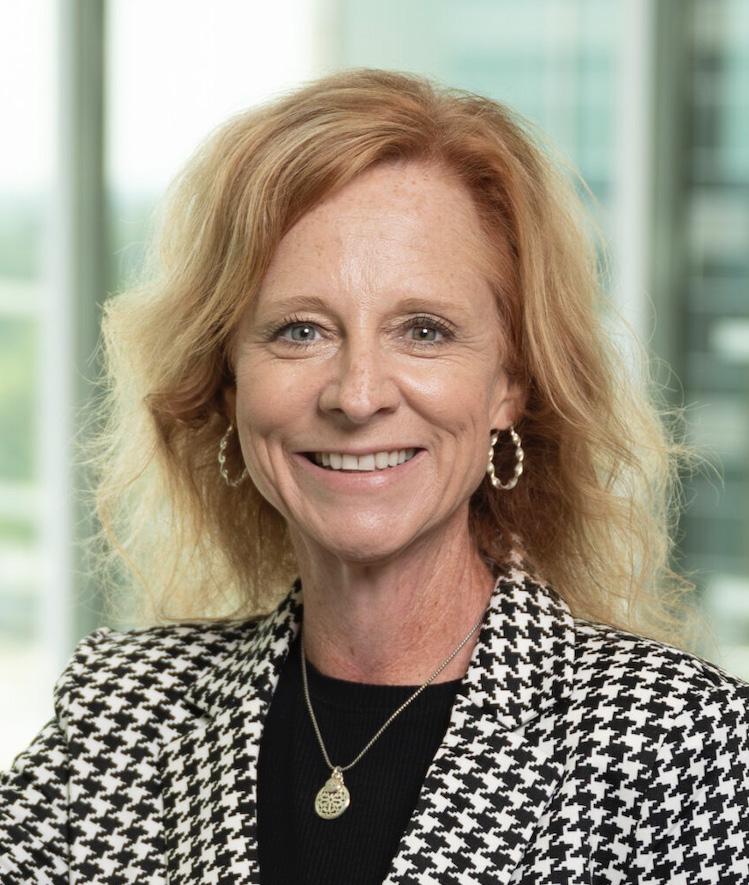
“We find that specialties such as [intensive care unit], emergency, women’s health and perioperative attract more nurses,” she said. “We have developed special incentives designed to draw experienced and new graduate registered nurses to these high-demand areas, and we are focusing our new graduate recruitment to these units.”
Other strategies UAMS is using to attract and keep nurses to fill these specialties include ensuring nurse-to-patient ratio is based on workload and acuity so nurses feel they are supported and equipped to render safe, quality care.
“Our ratios set us apart,” Jones said. “To do so, we have developed an in-house agency program and have also engaged outside contract labor to support these units while we are aggressively recruiting/onboarding. Like med-surg, those types of areas are where we need the specialties most. The thing about nursing is there are so many options that take you away from the hospital and the bedside, and while that is a draw for the profession, it does not meet the need at the place where it is most acute and critical, which is inpatient."
Jones said the way care is delivered has changed since the COVID-19 pandemic. She has been a nurse for more than 30 years, and both her parents were nurses. She said there is a nursing faculty shortage, as well as a need for more nurses, and attributed that only partly to compensation issues.
“This generation still sees nursing as a pretty foolproof way to have a career with decent pay, but beyond that is their desire for a work-life balance,” she said. “The job is not first and foremost. While compensation matters, it is their schedule and ability to have a lot of flexibility that matters most.”
Jones said UAMS looks for innovative ways to schedule and avoid negative downstream impacts.
“Beyond how we run our schedules is how we set up our staffing strategies,” she said. “For instance, one of the things I immediately saw to make more robust was hiring full-time employee nurses into what we call float pools. We have one for ICU, one for med-surg, one for women,
“This generation still sees nursing as a pretty foolproof way to have a career with decent pay, but beyond that is their desire for a work-life balance.”
— Tammy King-Jones University of Arkansas for Medical Sciences
one for perioperative, and now we’re creating one for oncology. What happens is these groups of nurses with the competencies and skills to work on these diverse specialties provide coverage where needed on a set of units, and they’re paid more because of it. We call this our in-house agency, and while we still use travel nurses because we have to keep safe patient assignments and practice areas, if we don’t supplement vacancies with contract labor, our nurses will leave because they are taking care of too many patients.”
Jones said the ability to work in different specialties also is a draw for a new generation of incoming nurses who want variety.
“Float pool allows them that flexibility because they can work three 12-hour shifts, maximize their compensation and still receive full benefits, and it gives them four days off to be with their family or pursue more education or whatever they’d like,” Jones said. “Frankly, if I’m looking at a resume for a nurse who’s wanting to get into leadership and they’ve worked in a float pool, what that tells me about them is they can roll with the changes. They adapt, and they’re not this creature of habit.”
Jones added that in the industry, nurses more frequently must “roll with the punches, or you don’t survive.”
“When you talk about nurse specialties, med-surg is one no one really thinks of as a specialty, but it is one our most difficult to fill,” she said. “The reason is you don’t know what you’ll be dealing with from day to day. Our ratios of nurse-to-patients in med-surg could be five one day or seven the next, and each patient has something completely different. One could have a gallbladder removed, another is dealing with sickle cell, another dialysis. You must use everything in your training — assessment skills, ability to work with patients and families. In a med-surg unit, the social dynamics may include working with the homeless
population. Med-surg is not glamorous, and while new RNs want to go to the NICU or labor and delivery, med-surg is where we need them. That’s our core, and they are on the front line.”
At the Arkansas State University College of Nursing & Health Professions in Jonesboro, nurse anesthetists are in demand. The program is currently accepting applications for the 2025 cohort, and the deadline to apply for the Doctor of Nursing Practice in nurse anesthesia is Oct. 1. A 36-month, 114-credit hour, full-time program, the DNP prepares registered nurses for entry into nurse anesthesia practice.
The nurse anesthesia program at ASU graduated its first class in 2005. Since then, the program has graduated less than 600 students. The most recent cohort, which completed the program in May 2022, had an attrition rate of zero percent. Every student that was scheduled for graduation that year successfully did so despite the effects of the COVID-19 pandemic. However, there was no graduating class in 2023 due to the transition of the program to the Doctor of Nursing Practice-Nurse Anesthesia in summer 2022. New administration of the nurse anesthesia program began in January 2023, and the first graduating cohort of the DNP nurse anesthesia will be in May 2024.
At Arkansas Children’s, the only hospital system in the state solely dedicated to caring for children, nursing specialties in emergency departments and intensive care units are most in demand. The Arkansas Children’s system is recruiting nurses for its hospitals in Little Rock and Springdale and is currently seeking almost 50 nurse positions in emergency and ICU alone. The system offers a variety of opportunities to learn and grow for new graduate nurses, and for experienced nurses, it offers an opportunity to grow professionally or continue their education to pursue leadership roles at the hospital, as well as in clinical settings.
Arkansas Children’s hosts an RN residency program for new graduate registered nurses, which is a formalized residency program that greatly benefits its participants, the hospitals and patients.
At CHI St. Vincent Health Care, working as a nurse provides a bounty of opportunities to advance a career. A part of CommonSpirit Health, the nation’s largest not-for-profit Catholic health care system,
CHI has locations in Little Rock, Sherwood, Morrilton and Hot Springs and serves the central and southwest regions of Arkansas while caring for more than 2 million lives a year.
“Our ministry offers the most comprehensive cardiology network in the state, internationally recognized neurosurgery team and the most advanced network of employed and affiliated physicians,” said Angie Longing, CHI St. Vincent’s chief nurse executive. “These services provide a wide variety of opportunities for nurses, from clinics to the float pool, medical-surgical and specialty areas, several different intensive care areas, and procedural areas such as surgery, [the post-anesthesia care unit] and the [cardiac catheterization] lab.”
St. Vincent seeks nurses who share the mission and core values of the ministry: compassion, inclusion, integrity, excellence and collaboration. The system can provide RNs and LPNs with all educational preparations, including diplomas, associate’s and bachelor’s degrees and more, while providing robust benefits to support nurses obtaining higher educational degrees.
While the nursing shortage is expected to continue, Arkansas hospitals are addressing it in innovative ways to make life more balanced for nurses while encouraging them to pursue more advanced education, take on leadership roles, and maintain an active life in their homes and communities. According to the Bureau of Labor Statistics, the registered nurse salary in Arkansas is $61,530 a year, and nurse specialties earn salaries from almost $130,00 for a hospital nurse practitioner up to more than $210,000 for a certified registered nurse anesthetist.
For those who can manage several tasks at once while working in an environment filled with adrenaline and the potential for lucrative compensation, nursing and nursing specialties represent viable career options in Arkansas, and positions are there for the taking.
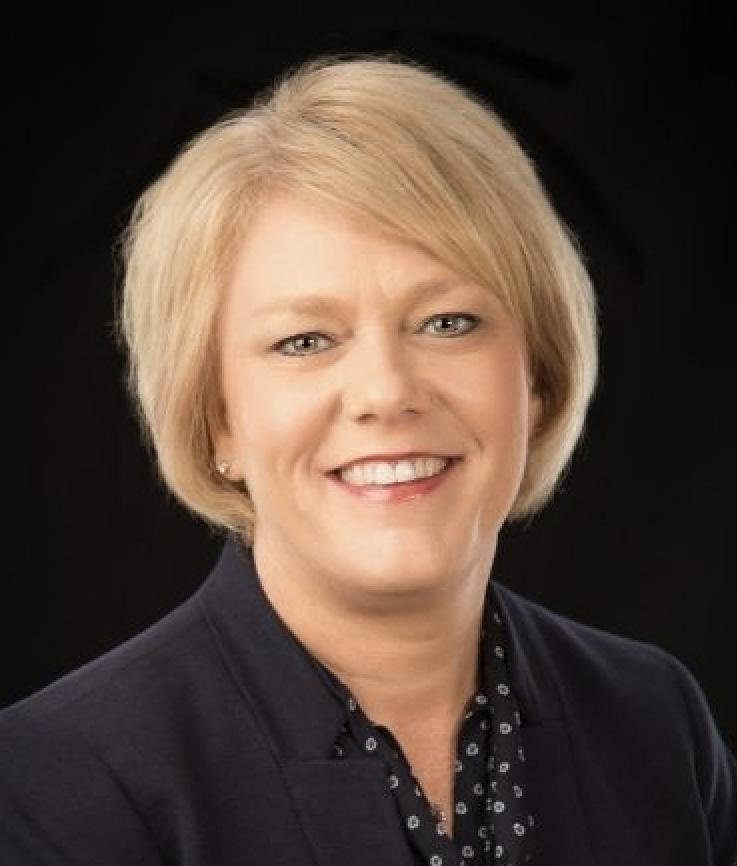
“These services provide a wide variety of opportunities for nurses, from clinics to the float pool, medical-surgical and specialty areas, several different intensive care areas, and procedural areas.”
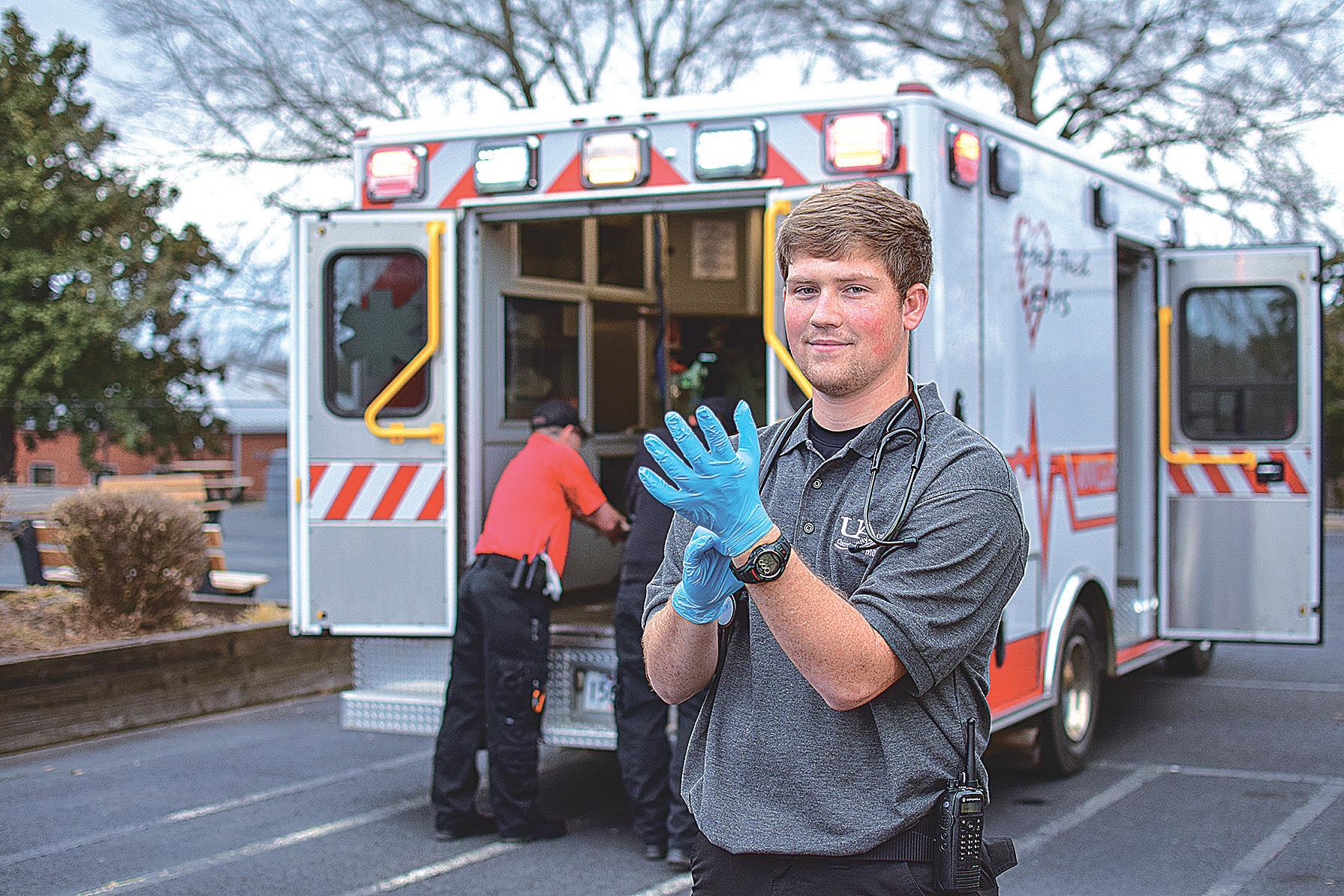
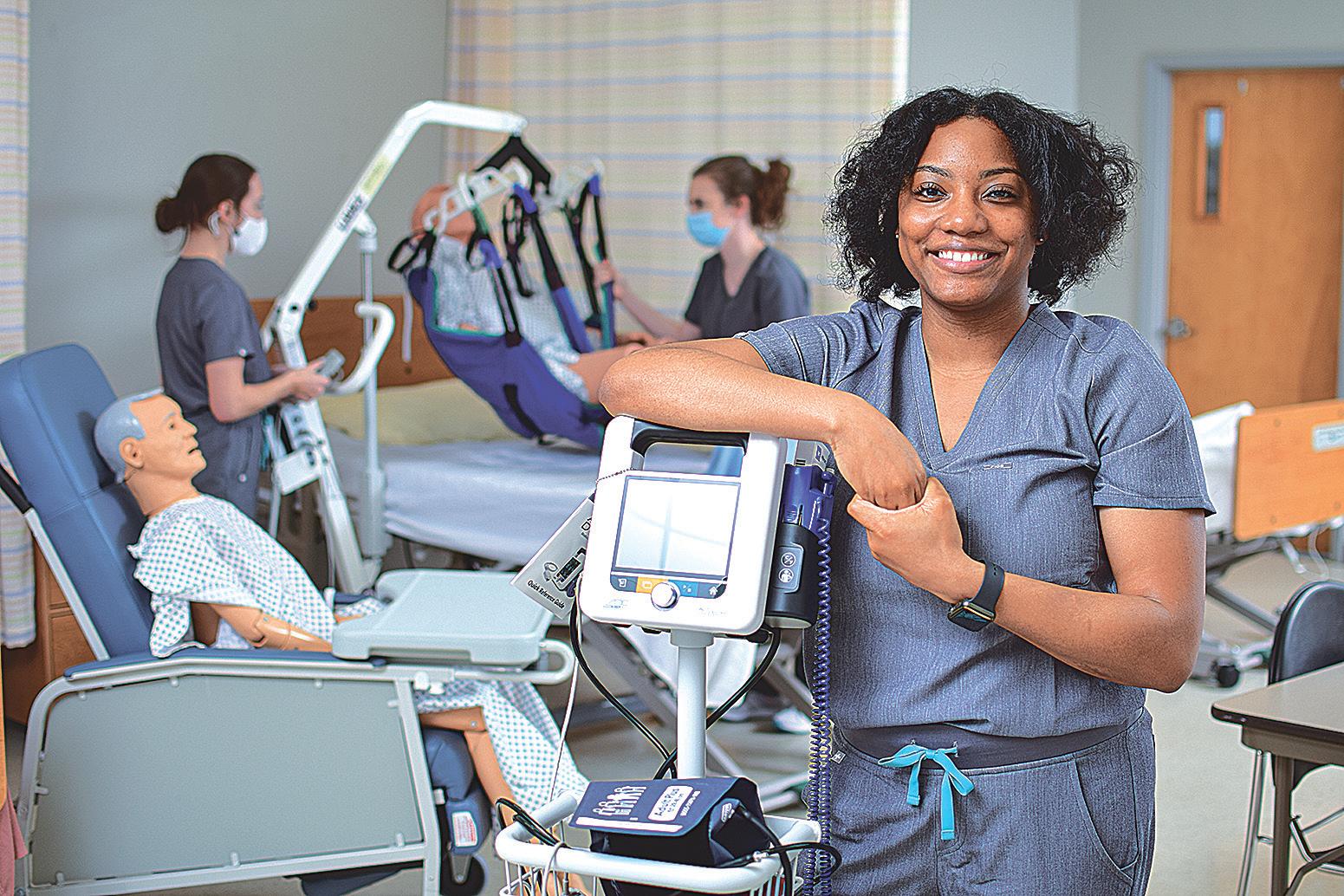
§
§
§
§
§

I am a St. Vincent Nurse.
Rachel provides care for patients in the Emergency Room.
“When you have patients who came in at their worst and then see them out walking around a few months later, it’s so rewarding to know we made a difference in their lives. Our team is very cohesive, and we rely on each other.” Join Rachel and become part of our
chistvincent.com/nurses
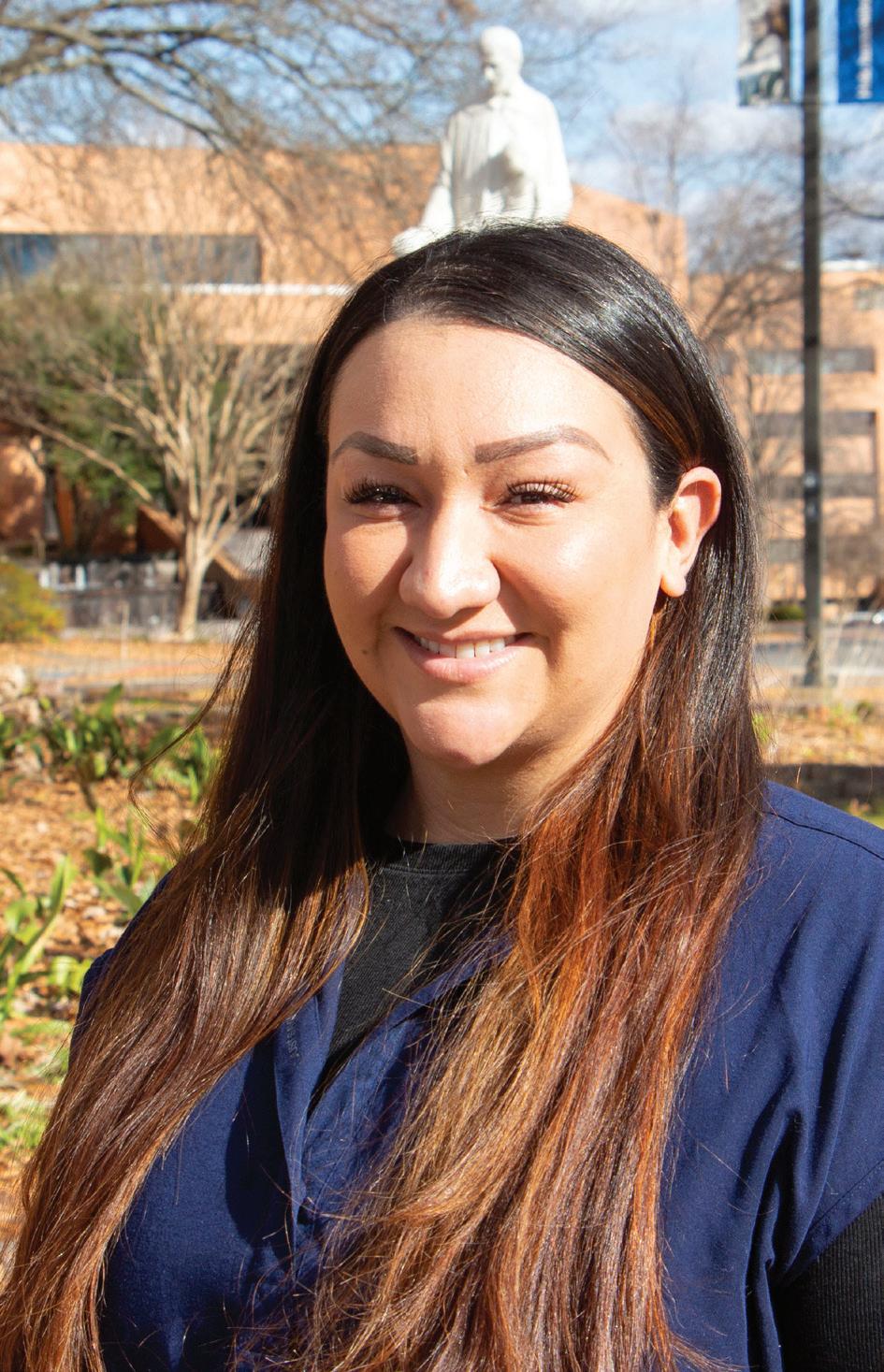
CONGRATULATIONS to our Champions for Children as “40 Nurse Leaders Under 40”

UNDER 40 Honorees Thank you for all you do to help make children better today and healthier tomorrow.
Candace Mayle, DNP, APRN, CPNP-AC, CPHON® Arkansas Children’s Hospital
Stacey Hawkins, BSN, RN, CPN Arkansas Children’s Hospital
Cassie Medlock, MNSc, RN, CNN, NE-BC Arkansas Children’s Hospital
Brooklyn Goade, MSN, RN, CPEN Arkansas Children’s Northwest
Colton Stice MNSc, MBA, RN, CPEN, NE-BC Arkansas Children’s Hospital
Lydia Sietsema, MHS, BSN, RN, CIC Arkansas Children’s Northwest
Nursing is changing, and nurses are changing with it
 By Sarah DeClerk
By Sarah DeClerk
There is no doubt that nursing has changed. Not only have the COVID-19 pandemic, a nursing shortage, and technology such as artificial intelligence brought changes to the field, but nurses themselves have become more diverse, better educated and more specialized.
“I mean, even the role of the nurse has changed,” said Janice Ivers, dean of nursing and health sciences at National Park College in Hot Springs, who joined the nursing field 40 years ago.
Patients are sicker when they get to the hospital and spend less time there, sometimes leaving nurses with just minutes to teach patients how to care for themselves at home, she added.
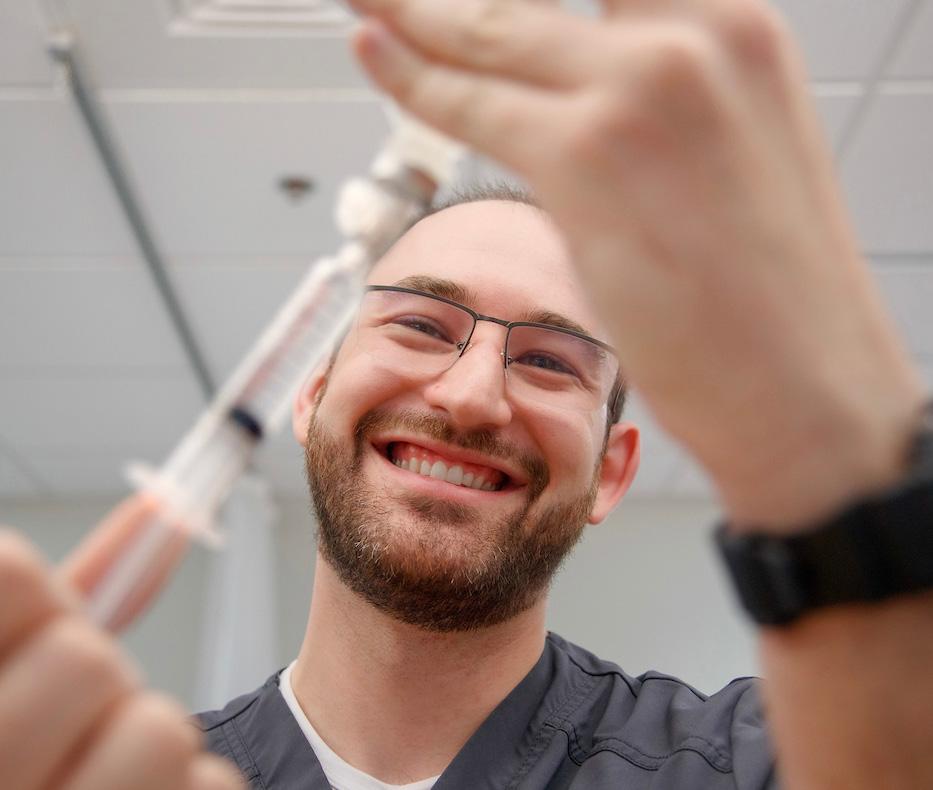
“The responsibilities of the nurse have changed over the years,” she said. “I learned how to make a bed, and by golly, that bed had better be tight. That’s not something that you spend that much time on anymore.”
Britney Lautsch, staff development coordinator at Conway Regional Health System, said nurses no longer simply fulfill doctors’ orders.
“Now the nurse is at the bedside with the patient more,” she said. “They have better knowledge of what’s going on with a patient, so whenever they report to the physician what is going on with that patient, they receive orders, of course, but they have more autonomy as a nurse now and more understanding of the patient and what care is needed.”
Those increased responsibilities are mirrored by increased education and specialization, and many nurses go on to become nurse practitioners and nurse anesthetists.
“We’re seeing a trend that nurses are going to school to be nurse practitioners, not bedside nurses, and so that’s where hospitals suffer because they’re short-handed, and so how do we keep nurses at the bedside?” Ivers said. “What’s going to happen? What is the look of nursing? Is it changing? Are we going
provided)
to see more AI-type things? I don’t know the answer to that, but I see it coming.”
From cutting-edge equipment used to care for patients to the electronic health records used to keep track of their medical histories, technology has had a profound impact on nursing.
“Nurses have to know a whole lot more about dealing with technology, not just in computerized charting, but all the equipment that is there for patients is now digitized,” said Sloan Davidson, director of the University of Arkansas at Little Rock School of Nursing, who joined the field more than 30 years ago. “It’s not the old-fashioned blood pressure cuff that we learned with.”
Nursing schools can train students using life-like mannequins and simulated scenarios to better prepare them for work in the field.
“We have very high-tech human patient simulators that we didn’t have 10 years ago,” Davidson said. “It helps our students to leave here more well rounded and more job ready, I guess you could say, because they learn how to take care of many different things on mannequins that they can’t do at the hospital as a student.”
As artificial intelligence continues to develop, nursing is exploring the technology’s health care applications.
“I think we’re going to start seeing, ‘Can we have nurse robots go in and do some of those things, go in and do vital signs on a patient?’” Ivers said.
Although patients could eventually interact directly with AI and robots, Amy Morris, interim dean of nursing at Baptist Health College Little Rock, said nursing is not likely to lose its personal touch.
“In theory, could you have a robot scale that is programmed to enter a room and electronically say to the patient, ‘Please stand on the scale,’ and you could collect their weight? Yes, in theory, I think that could happen, but at the end of the day, there’s going to have to be someone to interpret all the information and make clinical judgments.”
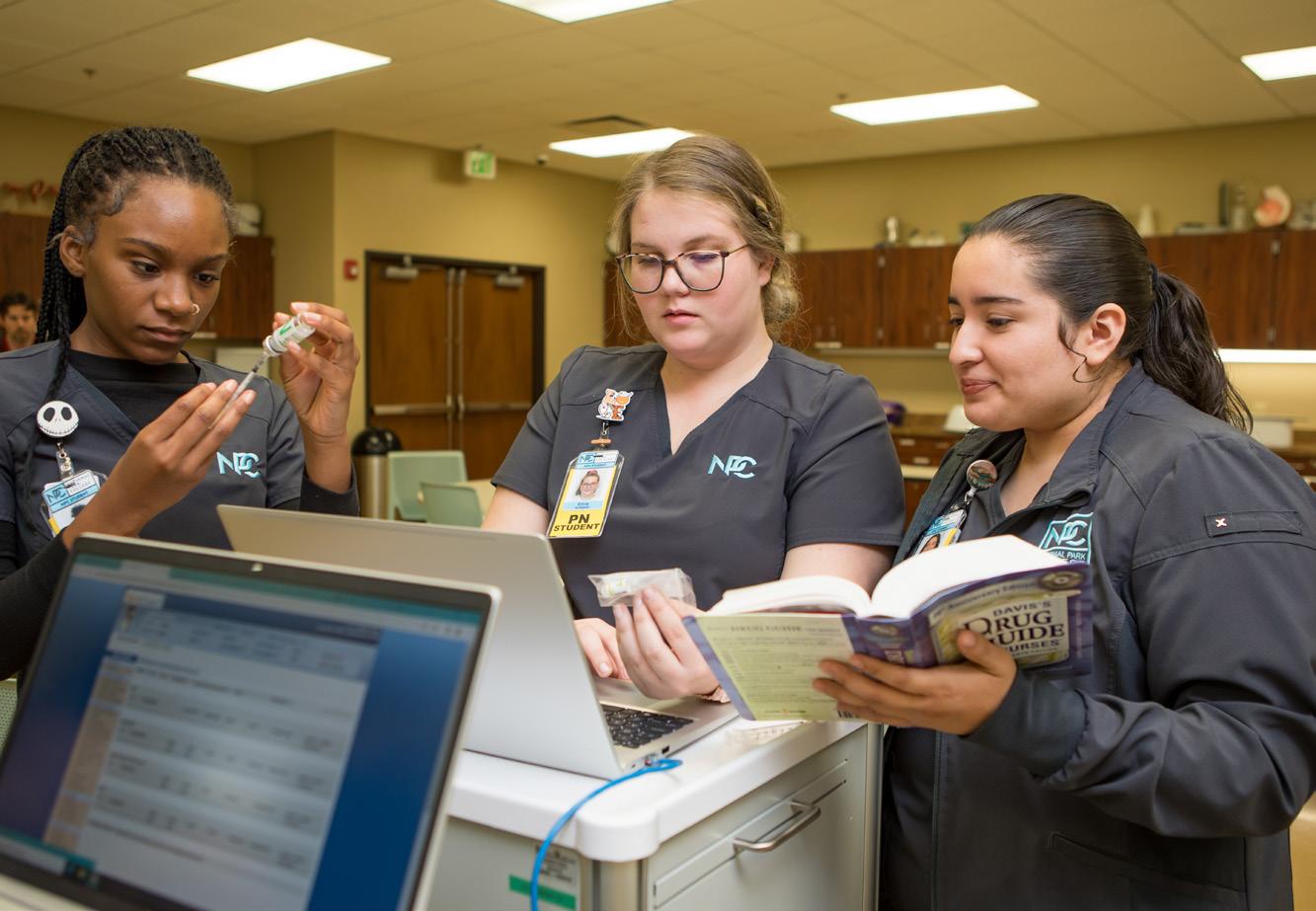
Nurses have also become more diverse. Ivers said when she was a student, her class was almost completely white and female. Now she estimated that her students are about 70 percent white, and there are more men these days.
Despite an uptick in minority students, the field still lacks diversity. The 2020 National Nursing Workforce Survey found that 81 percent of registered nurses in the United States were white, 7.2 percent were Asian, 6.7 percent were African American and 5.6 percent were Hispanic. The study also found that 9.4 percent of registered nurses were male.
Joel Hicks, president of Baptist Health College Little Rock, said its nursing program is 62 percent white, 28 percent African American, 5 percent Hispanic and 5 percent other races.
Inclusion is important because diversity can impact patient outcomes.
“The literature supports that patient outcomes are directly linked for patients that have nurses that look like them, for lack of a better word,” Morris said, “so you know, for a male, oftentimes, they have directly linked outcomes with them having male providers. You know, maybe they’re able to understand teaching better or have better rapport, build a more trusting relationship with same gender, same race. There’s a lot of literature to support that.”
Bilingualism is a component of serving patients from diverse cultures. Davidson said when she was working at a hospital in north Arkansas, there was a large proportion of Hispanic patients, but no one on staff spoke Spanish.
“We didn’t have an official interpreter. It was just hope
that a family member could help, and that’s just not OK anymore,” she said. “You have to have an official interpreter that’s licensed or certified in medical interpretation. You can’t just go with family as an interpreter, and that’s just grown as populations grow, especially the Hispanic population.”
She added that central Arkansas also has an abundance of patients who speak Asian and African languages.
“I think it’s very important to have that diversity,” she said. “You can really get a job anywhere if you’re bilingual, and you can get a certification to be a translator, as well.”
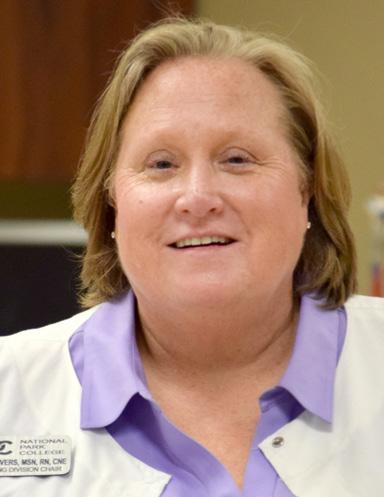
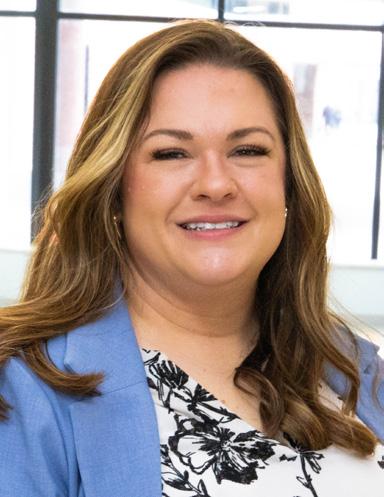

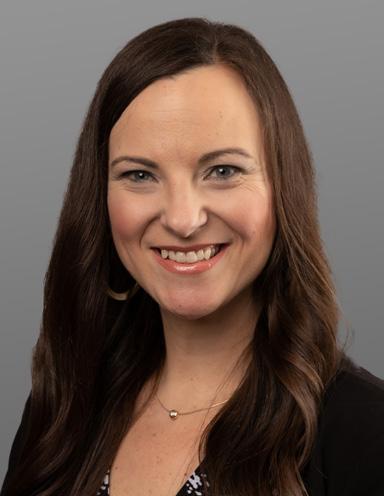

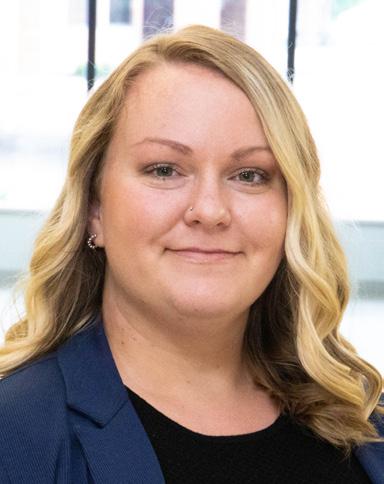
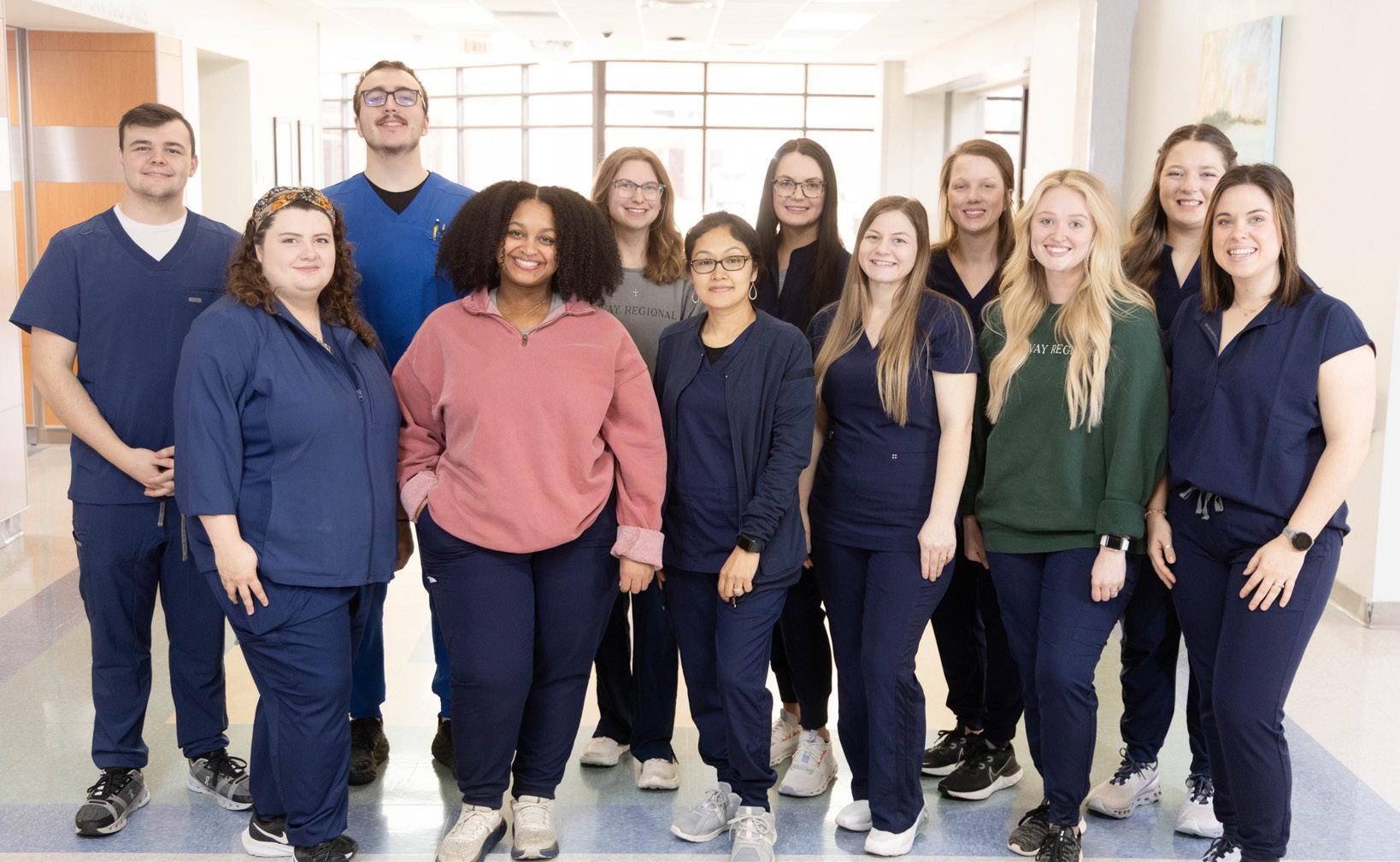
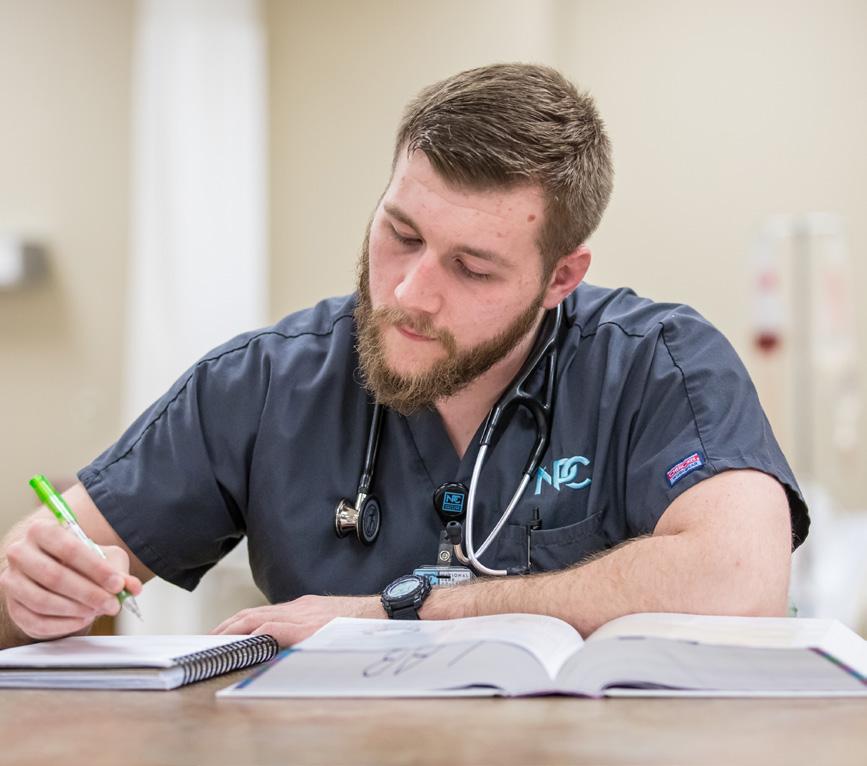
Ivers said she participated in a COVID-19 task force in 2020 and realized when a large Latino population tested positive for COVID-19 that no one on the task force spoke Spanish.
“Here we were, trying to educate people on protecting themselves and their loved ones from somebody who had positive COVID, and nobody could speak Spanish,” she said. “Well, we’ve got to get people that are able to communicate clearly and effectively with that culture, and so that was an example of, OK, this is inequity. This is a disparity we’ve got to fix.”
Baptist Health recently hired a Latino recruiter to bring more Latino workers to the system, Morris said, and Hicks said the college has implemented a cultural competency initiative to help students better interact with diverse patients. Baptist Health College and other institutions also work to recruit bilingual nurses, he added.
“Certain institutions offer courses, scholarships, support for students and support for bilingual nurses, health care workers,” he said, “and the cultural competence training, that’s not just
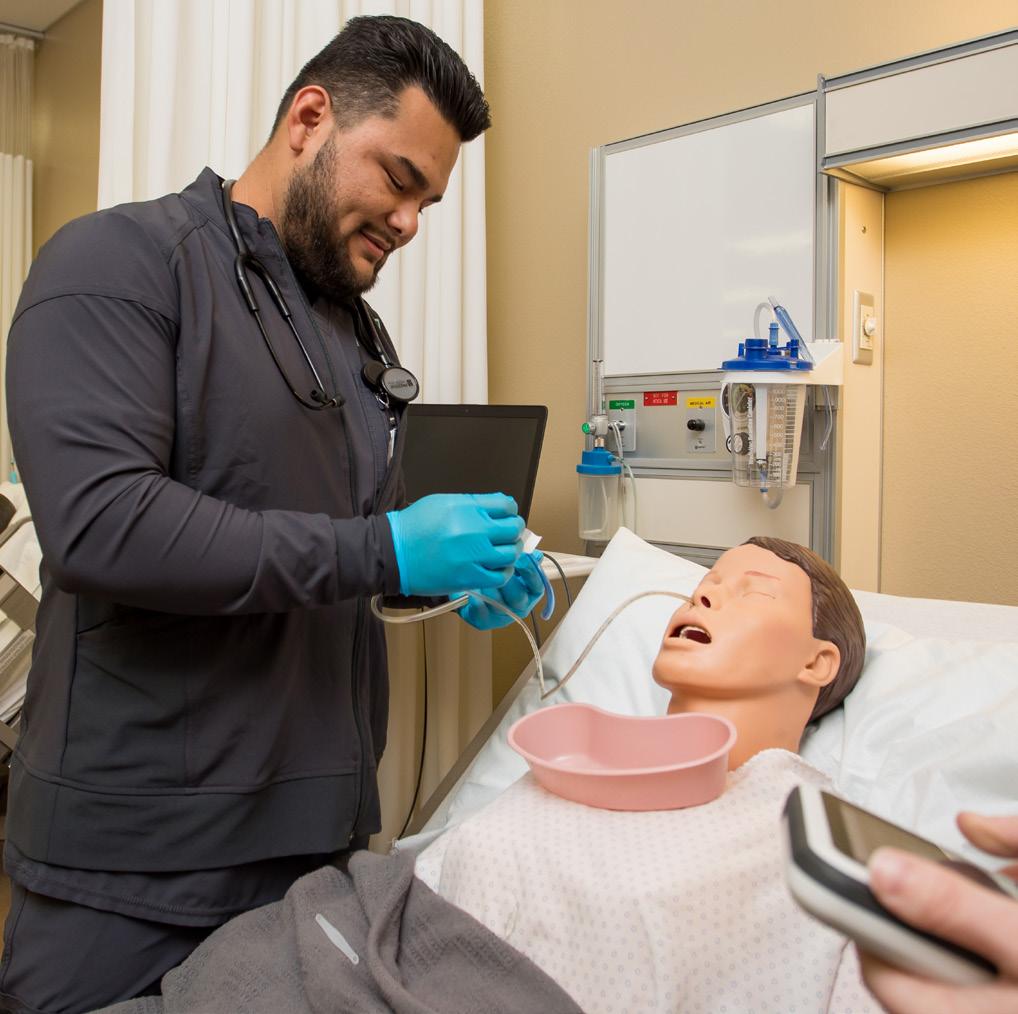
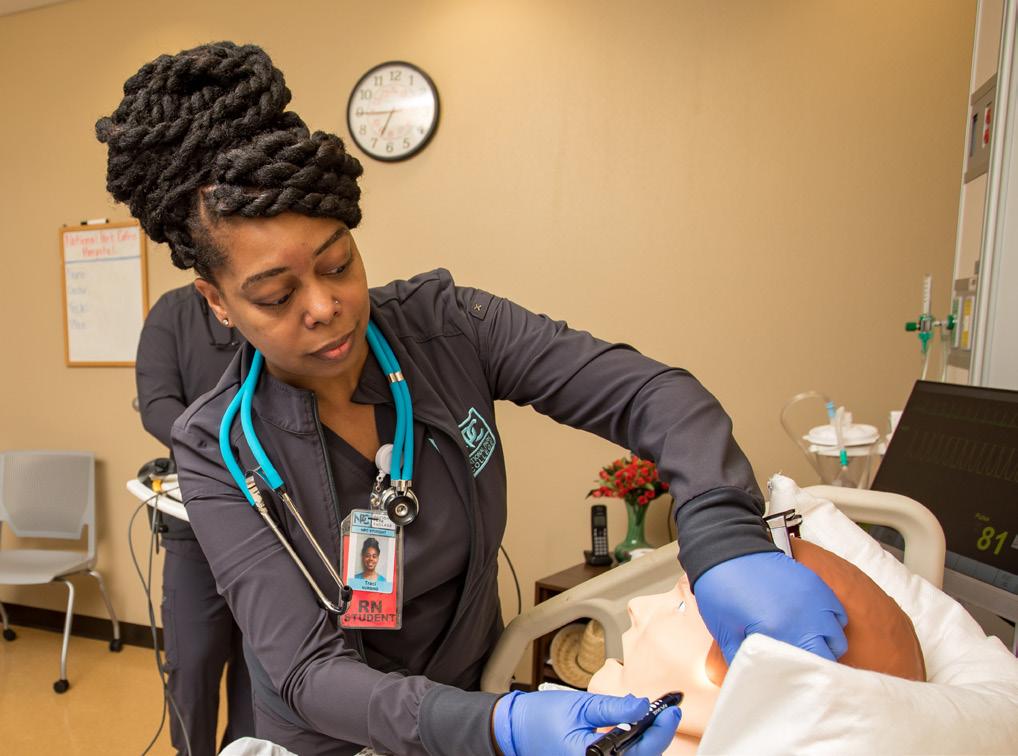
unique to Baptist Health College. That’s kind of across the board.”
Inclusive marketing, providing programs for students who speak English as a second language and providing pathways for those interested in caregiving to become certified nursing assistants and then further their careers in health care can help increase diversity in the nursing field, Ivers said.
“If we can increase the diversity within a nursing program, just think about how diverse we will be and how we will decrease the health inequities. We will increase the access to health care just by doing that because a lot of those people will go back to communities and be very vital to the health of those communities,” she said.
One of the keys is recruiting students as early as eighth grade, she added. Davidson agreed that early recruitment helps facilitate diversity.
“I think that we probably need to do more recruitment in the high schools to try to get more diversity into the field because there might be some that don’t even think about [nursing] being
a possible job, when in reality, it’s a great job,” she said. “We have many first-generation college students and many that are not primarily English speakers. They have English as a second language, so UALR in particular offers a lot of support for that.”
Morris said Baptist Health College has specifically targeted men for recruitment to the nursing program by hosting nights where male nurses share their experiences and discuss opportunities in the nursing field.
Ivers said the National Park College nursing program has more men than the national average. This year’s graduating class will be 15 percent male, and men make up 25 percent of the incoming class, she said.
“I think there are still some stereotypes for men in nursing,” she added. “The harmful one is rooted in the belief that nurses are inferior to physicians and that nurses are female and physicians are male.”
Davidson said she suspects male nurses face underreported levels of sexual harassment.
“We have a couple of guys here on staff, the faculty, that have said just how much sexual harassment they face in the workplace, in the hospitals, and they never report it because it’s just joked off as being funny,” she said. “In the end, it’s the same as if a female nurse is being harassed by her male co-worker, so I think that that is a misunderstood problem that is out there.”
JoAnna Olson, nurse residency coordinator at Conway Regional, said men bring a fresh perspective to the nursing industry.
“Obviously, there’s differences in communication styles,” she said. “There’s opportunities with different patients and families and committees where perspective and communication styles are important aspects of what we do as nurses, and so just having a variety of those at the table is important, and it brings value.”
Another factor increasing diversity among nurses is the use of nurses from overseas to combat the nursing shortage. Ivers said hospitals employed international nurses in response to a shortage during the 1980s, and the strategy is reemerging now.
“Hospitals need nurses, so these international nurses, how do we accommodate for that cultural shock that’s going to occur, you know, move to southern Arkansas here, and accommodate them to meet their cultural needs, both in the community setting and in the hospital setting?” she said.
Although Conway Regional has not employed international nurses, Olson said, the system uses contract staff such as travel nurses.
“The drawback is that they are here temporarily, and so it’s really hard to develop relationships with people who are only here for a certain amount of time. That can be a challenge, just in the day-to-day workflow for some of our staff,” she said. “Some of the benefits are, obviously, they bring a unique perspective because most likely they’ve traveled to other hospitals, and they’ve seen things done other ways.”
Lautsch said the nurse residency program at Conway Regional has helped mitigate effects of the shortage.
“I think with our nurse residency program, the goal of that is to retain our nurses,” she said. “Our retention rate is increasing
“We’re seeing a trend that nurses are going to school to be nurse practitioners, not bedside nurses, and so that’s where hospitals suffer because they’re short-handed.”
— Britney Lautsch staff development coordinator at Conway Regional Health System
with our nurse residency program, which is the goal of that. The goal is to keep nurses here, and therefore our shortage is not as noticed.”
Hicks agreed that nurse residency programs can relieve stress on hospitals caused by the shortage.
“In the hospital setting, nurse residency programs are one of the ways hospitals often work to retain nurses at the bedside,” he said, “so a nurse working with a more seasoned nurse and seeing the benefit of their knowledge and seeing how effective they can be in their role as a registered nurse is a great way to keep that nurse at the bedside.”
Because of work-loan programs and other incentives that have emerged during the shortage, there has never been a better time to become a nurse, he added.
“If someone has that calling to go into the nursing field, now is the time to do it because there are so many opportunities there,” he said. “A student can walk through a program practically debt free if he or she chooses to do that, and beyond the financial incentive, beyond the financial support, the academic support, some of the support systems that were put in place here in this college, the tutoring systems, the mentor systems, things of that nature, those students are going to have more support than ever before.”
Although the field lost many nurses during the COVID-19 pandemic, Olson said the number of nursing students has increased over the past few years.
“There was a lot of burnout and a lot of exhaustion, but we’re getting back to a place where people are excited to become nurses,” she said. “They’re excited to come to work to take care of patients. They’re going back to school not to leave, but to get a higher degree so they can continue to provide better care to their patients at the bedside.”
Morris said she would like to see legislators get involved in bringing more nurses to the field. During the COVID-19 pandemic, images of nurses as heroes brought additional students to Baptist Health College, but the message soon shifted to the difficulties of being a nurse, she said.
“I think there’s an opportunity not just for nursing schools, because we can want to get them here all day long, but for our society and for our state to promote nursing as a profession, as one that is valuable, one that is rewarding, as one that has such rich rewards to be a part of,” she said.




Voted one of AY’s Best Hospitals
FIVE YEARS IN A ROW!



Conway Regional has been the community’s hospital for more than 100 years, providing high-quality, compassionate care. As our communities grow, we are growing alongside you to ensure all of your healthcare needs are met right here in Conway. When your family needs medical care, you can trust our board-certified providers to provide you with the comprehensive care you deserve when you need it most.


The nursing shortage did not start or end with the COVID-19 pandemic, and it is not a lack of interest that is the primary cause of why not enough new nurses are being educated to replace those who have left the profession. So said Susan Gatto, a professor and director of the school of nursing at the University of Central Arkansas in Conway.
“The whole reason for the nurse shortage is because of the nurse educator shortage,” she said. “Nurse educator salaries are so much lower than on the clinical side. Nurses with master’s degrees can get a whole lot better pay on the clinical side than they can get as a nurse educator, so I do have trouble recruiting students into the Master of Science in nursing nurse educator program and recruiting faculty to teach in all of the UCA nursing programs. It is a nationwide issue with not enough nursing teachers.”
to make less money? Some newly graduated nurses with a Bachelor of Science in Nursing are making more money than nurse educators with a master’s degree and 10 years teaching experience.”
Gatto said it is particularly difficult to recruit men into nurse education, which has contributed to the UCA School of Nursing having a faculty that is 100 percent female. Most of the teachers are married and have another income in their household. The majority are mothers or grandmothers helping with families.
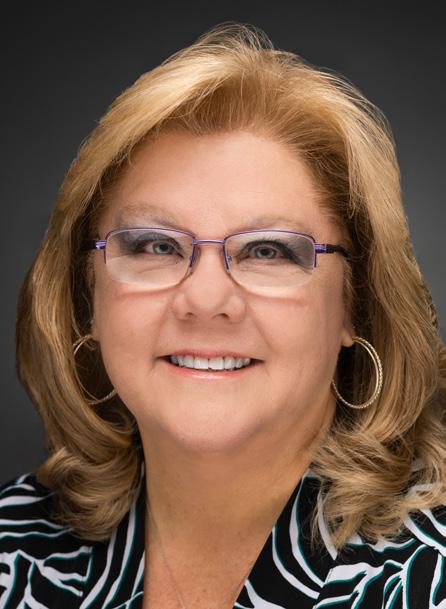
One nurse practitioner who took a job with the UCA School of Nursing in August 2022 took a pay cut of $40,000 per year, Gatto said. She added that the nurse practitioner took the job to have more time with her family, including summers off with her children.
“That worked out well for her family, but it is hard to take a $40,000 per year pay cut,” Gatto said. “For most people, why spend more money to get a master’s degree
Susan GattoIn 2022, Gatto had four nurse educator openings. She offered 14 people the jobs before four accepted.
Despite these challenges, nursing education can also be very rewarding, she said.
“It is very intellectually stimulating,” Gatto said. “Most people also do it because they feel like they are giving back to the profession. Instead of taking care of one patient at a time, they are educating a student who treats hundreds of patients over their career. I’ve been teaching 35 years, so that equates to a lot of patients through all the students I have educated. My faculty are so dedicated. They care about the students. They want them to meet their goals. They work hard to make them employable and meet all the competencies to pass the licensing exam.”
Gatto said there has been a nursing shortage since the 1980s. There has always been a gap in salaries, worsened by COVID-19, yet she is not sure whether it is primarily an overall nursing shortage or a question of nursing deserts. Those include rural areas that do not pay as well or attract as many applicants, and they also include acute care hospital settings where nurses work often grueling 12-hour shifts.
“Some nurses are choosing different things, rather than shift work in hospitals,” Gatto said. “I think that is why acute care settings are seeing more of a shortage.”
Students who want to become a nurse can receive their BSN degree at UCA. They do their freshman and sophomore years as pre-licensure BSN students taking prerequisite courses and then go through a competitive admission process for admittance into the BSN major for the final two years.
“Right now, we have more applicants than we can admit,” Gatto said. “In addition to not having more instructors, another reason we can’t admit them all is because of clinical placements. Students have to do clinical experiences all through the program to meet expected competencies. That is one of the biggest barriers to admitting more students.”
She also has trouble getting a full cohort for UCA’s postmaster’s Doctor of Nursing Practice degree, which has a focus on leadership development and process improvement for nursing administrators. UCA offers online information sessions to attract students and has a dedicated education counselor, Julie Ingram, whose job is to recruit and advise students in the UCA nursing graduate programs.
“We have been doing more with our graduate program recruiting than ever,” Gatto said. “Julie has been going to different
“Nurse educator salaries are so much lower than on the clinical side.
Nurses with master’s degrees can get a whole lot better pay on the clinical side than they can get as a nurse educator.”
— Susan Gatto, UCA School of Nursing
conferences, including in neighboring states, to recruit more students.”
UCA also offers a BSN to Doctor of Nursing Practice program with an emphasis as a family nurse practitioner.
Recruitment and retention of nurses continues to be one of the biggest challenges for health care organizations across the nation, said Meredith Green, chief nursing officer at Washington Regional Medical Center in Fayetteville.
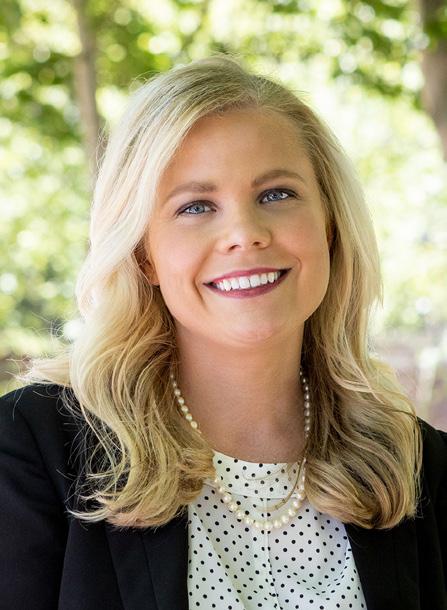
“There will always be a need for nurses to provide care at the bedside, and that is not unique to Washington Regional,” Green said. “That is why it’s important that hospitals collaborate with community nursing programs to find ways to grow the pipeline of skilled nurses. Washington Regional has built strong partnerships with area nursing programs to help better meet the needs of our community.”
Some hospitals, particularly in rural areas of the state, still need to hire travel nurses to fill staffing gaps. Travel nurse salaries are much higher and can be burdensome to hospitals that are already financially stressed. Green said Washington Regional's recruitment efforts are currently meeting staffing needs adequately.
“We are actively engaged with our community and area nursing programs to recruit and retain nurses,” Green said. “Washington Regional’s vision is to be the best place for patients to receive care while providing our nurses with an environment that is the best place for them to give care. For those looking to enter the nursing profession, Washington Regional can help them achieve their professional goals with the nurse tuition loan program. For approved applicants, the program pays for nursing school with the goal of offering them a job at Washington Regional after graduation.”
Green said newly graduated nurses can gain additional skills and knowledge during their first year through Washington Regional’s nurse residency program. The program helps nurses transition to professional practice and become confident care providers through a variety of sessions designed to strengthen their assessment, critical thinking, communication, teamwork and technical skills in a safe learning environment.
Nursing can be a profoundly rewarding career, she said.
“Nurses have the power to impact lives, and I believe they are some of the bravest and most needed people in our society,” Green said. “Washington Regional helps nurses create a fulfilling career and meet their personal and professional goals. We encourage our nurses to get involved in professional organizations and support them as they develop new skills to advance their careers. Whether it’s a nurse with decades of experience or a new graduate just beginning their career, we value the work our nurses do.”
At its quiet corporate headquarters on Northshore Drive in North Little Rock, Travel Nurse Across America houses an integrated enterprise dedicated to making health care systems more effective and health care professionals happier.
“We were founded by native Arkansans. We have an Arkansas feel. We’re friendly,” said Rose Fulton, senior vice president of recruitment. “We’re a best place to work in Arkansas and in the industry.”
Travel Nurse Across America’s core business is its agency that assigns nurses and allied health professionals to hospitals in all 50 states. The “travelers” are seasoned professionals who agree to 13-week assignments and typically go from one assignment to the next with breaks of a few weeks between quarter-long gigs.
Jill Eliassen, vice president of clinical services, described the type of rugged individuals that fit the TNAA culture and requirements, as well as the specific standards of health care system clients.
very professional and very travel-logistics savvy.
Eliassen added that when a client hospital’s plans change, TNAA staffers are “all hands on deck” to provide best-in-class support to help travelers make that big, unexpected change of venue.
“There are a lot of disruptions that can happen to a traveler in this process,” she said. “The hospital could have seven people return from [family and medical leave], and all of a sudden, they might not need [the traveler] anymore. Then our teams are scrambling to divert this person to another assignment. That’s where I love to brag about TNAA. Our support teams are fantastic.”
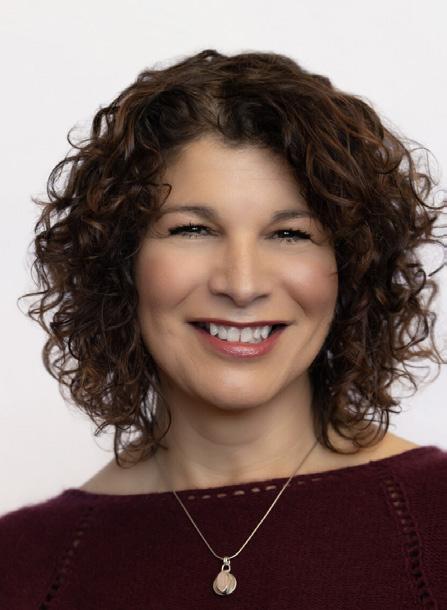
“We have to have health care professionals, generally, that have at least one year of baseline experience in an acute care setting,” she said. “They can’t come fresh out of school and become a traveler because they are expected to hit the ground running, to be the experts on the unit, not the person who’s asking a lot of questions, seems lost and can’t keep up with the really intense pace that’s out there. The ones who are most successful are those who are very adaptable, very flexible,
Rose FultonTNAA launched in 1999, when Little Rock tax attorney Mike Lax saw an opportunity to start a health care staffing firm after Lax’s wife, a nurse at a local hospital, mentioned that British travel nurses were working in Little Rock. After carefully analyzing the potential for a traveling clinician staffing firm, Lax and a business partner launched TNAA from an office in downtown Little Rock. In 2001, the company moved to a west Little Rock location before settling into its present headquarters in North Little Rock in 2009. Today, Lax continues to serve the firm as a board member alongside former president and CEO Gene Scott. In 2019, Tim McKenzie succeeded Scott as CEO.
James Quick, president of SimpliFi, a managed service provider TNAA acquired in 2017, further helped streamline the process of connecting nurses with the hospitals and health care systems in need of their services.
“SimpliFi is the single point of contact for a health system to all their contract labor,” he said. “Instead of a health system contracting with 10 or 50 or 200 specific staffing agencies, they contract with us as a one-stop shop. We can command all the talent from those agencies, and then we become a talent champion for the health system.
more than 24,000 clinicians over the past 12 months. Keeping that far-flung travel nurse community connected is a smart array of social media and company-owned online networks.
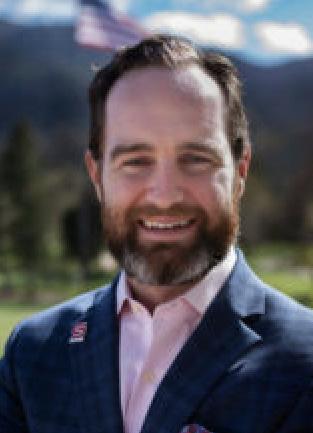
“We curate a panel of agencies for every client. SimpliFi is hired by a health system with very certain [key performance indicators]. SimpliFi is the face to the health systems and helps health systems maximize their labor utilization. TNAA’s primary customer is the nurse, and every day, they’re thinking about how we serve the nurse with excellence.”
The demand for nurses and other clinicians has mushroomed in the past decade. According to the Center on Budget and Policy Priorities, the implementation of the Health Insurance Marketplace, a key component of the Affordable Care Act, reduced the number of uninsured Americans by more than 40 percent from 2013 to 2022, thus increasing the demand for care. In addition, the COVID-19 pandemic caused historic health care worker shortages and burnout.
TNAA was an early adopter of the remote working model, employing advanced videoconferencing technology long before the advent of Zoom. That positioned TNAA to select talent from across the nation, and it created an agile culture that was ready for the work-from-home norms of the pandemic.
“The size of the market is much larger than it was in 2019,” Quick said. “Travel nursing alone, not counting travel allied health, grew from $6 billion in 2019 to $24 billion in 2023. There still are some critical labor shortages with allied health, particularly with [radiologic technologists].”
The enterprise does not stop there. Last year, TNAA acquired Stogo, a mobile app platform that connects health care systems with local clinicians to fill critical, immediate staffing gaps.
At last count, TNAA’s website listed more than 3,400 travel nursing and allied health positions available, and Quick said the company has placed
Now in its 25th year of business, the company continues to push innovation. To prepare highly qualified nurses, SimpliFi developed the Confidence Accelerating Practice program, in which highly experienced nurse teachers known as preceptors train new nurses.
“If you put a new graduate into a program and they have a negative experience with their preceptor or they’re not prepared adequately and they get into practice and they opt out, that sets you back for years as a health system,” Quick said. “Our CAP program is helping health systems to expand their capacity to onboard more new grads so that those new grads are retained.”
Eliassen also emphasized the importance of advanced education among TNAA nurses, adding that more highly educated nurses produce better patient outcomes.
“We offer a [registered nurse] to [Bachelor of Science in Nursing] program at TNAA with 100 percent reimbursement,” she said. “That’s something other agencies don’t do, and 68 percent of our current travelers on assignment hold a BSN degree or higher.”
The formula has worked not only for the company’s many clients, but as recognized by the industry. In addition to numerous awards for bestin-class satisfaction among travelers, employees and customers, TNAA has earned a certification with distinction from the Joint Commission, the oldest and largest accrediting organization in health care. That is just one more well-kept secret about an Arkansas success story.
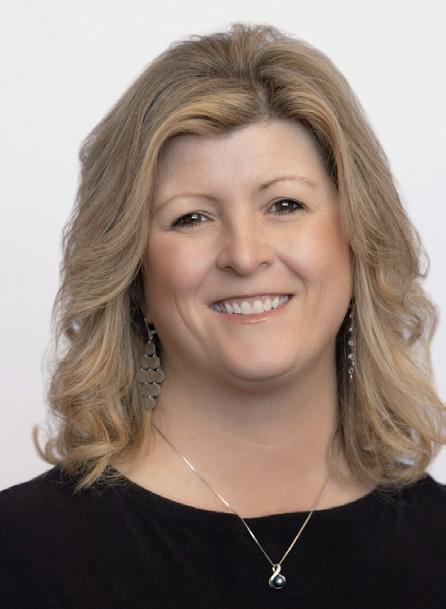
“We are leading the way in our industry by innovating, by doing things that are cutting-edge,” Quick said. “We’ve been pretty quiet about that.”
Eliassen said the dedication of the traveling nurse corps is inspiring to those who work behind the scenes whose job it is to smooth as many bumps as possible out of a demanding profession.
“It's a challenge to get ready and uproot from where you live, potentially leave your family and drive thousands of miles to a hospital where you’re contracted to work for 13 weeks,” she said. “We’ve got teams to help and walk them through the process, but it’s still a lot to think about.”

It should come as no surprise that Arkansas has a significant demand for home health care nursing services. The aging population coupled with the state’s vast rural areas place substantial stress on an already overtaxed health care industry.
According to the Arkansas Center for Nursing’s 2022 report, State of the Nursing Workforce in Arkansas: Nursing Education, Supply and Demand, the COVID-19 pandemic dramatically impacted nursing education in Arkansas and across the country. Early in the pandemic, academic operations were affected by the suspension or cancellation of didactic courses and clinical sites, as well as increased student and faculty attrition. As the pandemic wound down, clinical sites reopened, and faculty and students have adapted to the circumstances. The full effect of this disruption in nursing education is still unknown.
The report further notes that nursing faculty salaries, on average, are well below the average salaries of other postsecondary faculty. Long-term employment projections suggest the demand for nursing faculty will increase due to growth and the replacement of expected retirees.
Industry officials agree that the need for nurses, particularly in home health care, will only increase.
The Arkansas Center for Nursing further reported that until 2021, Arkansas’ nursing education programs had more applicants than available seats. A decline in applications resulted in unfilled seats in some nursing programs in 2022. According to data released by the American Association of Colleges of Nursing, student enrollment in entry-level baccalaureate nursing programs increased by 3.3 percent in 2021, which is the slowest growth in nursing program enrollment since 2015.
in Arkansas, the ACN states. Nationally, the total supply of registered nurses decreased by more than 100,000, the steepest decline in the supply of registered nurses in four decades. The exodus from the nursing workforce disproportionally affected hospitals, where there was a 3.6 percent decrease in RN employment. The report also found that in 2021, the national RN turnover rate was 27.1 percent, and there was a 17 percent vacancy rate. While turnover and vacancy rates of registered nurses in Arkansas facilities were not available, 90 percent of acute care facilities reported that demand exceeded supply for both new and experienced registered nurses.
The good news, however, is registered nurses, nursing assistants and nurse practitioners are among the fastest-growing occupations in Arkansas. That trend is expected to continue as the population ages.
While nurses working in home health in Arkansas play a crucial role in providing medical care and support to patients in their own homes, their expertise and broad range of abilities are in acute need. Responsibilities for nurses in the industries include administering medications, monitoring vital signs, dressing wounds, providing patient education and coordinating care with other health care professionals. Home health care nurses in Arkansas must also adhere to state regulations and licensing requirements, ensuring they meet the necessary qualifications and standards of practice.
“You must be able to function independently with the patient, the caregiver and the providers in the home setting.”
— Julie Jones, R.N. Conway Regional
Despite increases in the number of newly licensed nurses, there was a net loss of actively licensed nurses
The most daunting part of their jobs, however, may be working closely with patients’ families to develop individualized care plans that meet the unique needs of each person receiving care at home.
Julie Jones, a registered nurse who works in home health care at Conway Regional Home Health, said this category of nursing requires a strong foundation of expertise and clinical judgment to be successful.
“All the technology and the support, the bells and whistles of the hospital setting are removed,” she said. “You must be able to function independently with the patient, the caregiver and the providers in the home setting. Patients are often discharged from

hospitals quicker and in worse health, presenting multiple complex health issues and lacking necessary disease-management education. These factors create challenges that home health care nurses address through their clinical knowledge and ability to operate independently, which are crucial for positive patient outcomes.”
Jones said she became a home health nurse because she wanted to meet the needs of the patients where they are most comfortable and familiar — their home.
“They are in their safe space,” she said. “Being a home health care nurse takes great communications skills, critical thinking, attention to detail, and, of course, patience and empathy. Meeting one in their own home has a way of healing them not only physically, but emotionally. To know that you have made a difference in their lives, in their own environment, can truly help their overall well-being beyond their physical health.”
Being a successful home health nurse requires a unique blend of skills, qualities and attributes that enable nurses to excel in providing care in patients’ homes with compassion and empathy as the foundation, Jones said. Good home health nurses must genuinely care about their patients and understand the challenges they face while establishing trusting relationships with patients and their families, she added. Plus, home health nurses typically work without direct supervision.
Another necessary attribute is adaptability because environments can vary significantly from one home to another.
“The key to successful home health care nursing is building relationships with patients,” Jones said. “Flexibility is essential as the home environment can present unique challenges such as space limitations and resource availability. Autonomy is a significant aspect of the role, often being the sole health care professional on site. This requires thorough preparation, including bringing necessary supplies and having a well-thought-out backup plan. A positive attitude and a supportive approach are important in enhancing patients’ comfort and facilitating their recovery at home.”
Being the sole caregiver to a patient may happen more often
in rural settings, particularly in Arkansas, where access to health care services can be limited. Home health nurses play a crucial role in delivering health care to patients in such underserved communities and helping improve access to care and health outcomes.
The demand for home health nurses is expected to continue growing in Arkansas, driven by factors such as an aging population, advancements in medical technology and efforts to reduce hospital readmissions. This trend underscores the importance of home health care as a cost-effective and patient-centered alternative to institutional care.
The high demand for home health care nurses in Arkansas is being driven by several factors, including:
• Aging population: Like many states, Arkansas has an aging population. As people age, they often require more medical care and assistance with daily activities.
• Chronic illnesses: Chronic illnesses such as diabetes, heart disease and respiratory conditions are prevalent in Arkansas, contributing to the demand for health care services to manage their conditions and prevent complications.
• Cost-effectiveness: Home health care can be more cost-effective than hospitalization or nursing home care for certain patients.
• Patient preference: Many patients prefer to receive care in familiar settings, surrounded by their loved ones. Home health care allows patients to maintain their independence and dignity while receiving the necessary medical attention.
• Hospital discharges: Nurses in home health care can provide post-discharge care, monitor patients’ conditions and prevent complications that could lead to hospital readmissions.
Overall, the demand for nurses in home health care in Arkansas reflects the broader trends in health care delivery, including the need for personalized, accessible and cost-effective care for individuals in various settings, particularly in the context of an aging population and the prevalence of chronic illnesses.
CARTI’s mission is making trusted cancer care accessible for every patient we serve through compassion, innovation and purpose. Serving more than 50,000 patients annually, we are continually seeking skilled individuals to join our growing team.
CARTI is seeking a Director of Clinical Nursing Services as well as experienced registered nurses

• Profiles of business and political leaders
• In-depth feature stories — the who, how and why
• The latest industry news, from health care to manufacturing
• Shining a positive light on Arkansas industry
• Content from award-winning designers, photographers and writers


From widening Interstate 30 in downtown Little Rock to building a bypass in Springdale, several highway projects are set to relieve traffic congestion and enhance travel in the Natural State.
Jared Wiley, chief engineer of pre-construction at the Arkansas Department of Transportation, said the department is nearing the completion of the Connecting Arkansas Program, the cornerstone of which is the I-30 widening.
“We had, historically, a lot of congestion in the corridor,” he said. “We had travel-time delays daily. We had increased crash rates. We had documented incidents of high crash rates, and so we wanted to tackle that.”
He added that the project also allowed the department to replace the aging I-30 bridge, an undertaking that will expand the bridge from six to 10 lanes and is expected to be complete in late summer or early fall.
The department recently broke ground on phase 2 of the Springdale Bypass, he said. The project will include the con-
By Sarah DeClerknector from the bypass to the Northwest Arkansas National Airport. The four-phase project will have a total cost of about $1 billion, he added.
ARDOT has plenty of other projects in the works. The department is widening I-30 in Saline County and U.S. 67 in Jacksonville, and ARDOT is working to develop projects to widen I-40 from Little Rock toward Lonoke, he said.
The department is also working on future I-57 from Walnut Ridge to Missouri and plans to take bids on the Corning Bypass in the next six months to a year, he said, adding that the goal of the interstate is to provide an interstate connection from Little Rock to St. Louis and Chicago.
He added that a $1.3 billion, 14-mile I-49 expansion will connect Alma to Barling and include a new bridge across the Arkansas River.
“That’s going to help us get one step further to connecting that piece down to Texarkana,” he said.
In addition, Cabot will soon see major interchange con-

struction projects at Arkansas 5 and Arkansas 89, and Wiley said ARDOT will begin taking bids for those projects in the next year or so.
The Connecting Arkansas Program is a 10-year program that uses funds from a half-cent sales tax to complete more than 30 projects for a total of about $2 billion in improvements across the state, he said.
The department received additional sales-tax funding in 2020, when Arkansans voted for the Renew Arkansas Highways Program.
Workers make progress on the widening of Interstate 30 through downtown Little Rock. (Photos and images provided)
provements,” he said. “To date, they’ve been able to secure about $200 million in additional funding for highway improvements across the state for some of our more expensive or more difficult projects.”
Wiley said the department devotes about 75 percent of its funding to maintaining existing infrastructure and about 25 percent to congestion relief and capital improvements. The department uses data such as traffic counts, mobility information and travel-time delays, as well as Federal Highway Administration standards, to determine which roads to widen, he added.
“We determine where those congested areas are, and we look to see what’s needed there to remedy those situations,” he said. “Of course, as you might expect, there are always more needs than funding available, so then we work to try to prioritize those based on certain criteria, including safety, mobility, freight movement — a variety of factors.”

ARDOT also receives federal funding, the most significant source of which comes from the Infrastructure Investment and Jobs Act that runs through 2026, he said, adding that the department received grant money from the act to widen Arkansas 5 in Bryant and plans to pursue additional grants for I-49.
“We’ve also been very fortunate to have senators and congressmen who push hard for transportation infrastructure im-
Denis Guillette, vice president of the heavy highway division at RedStone Construction Group in Little Rock, said the state has done well when anticipating roadway funding needs.
“I think that the highway department’s done a really good job,” he said. “They’ve been in advance, and so has the industry. A lot of states don’t have funding. Arkansas really started, back almost 15 years ago, knowing that there was a big need coming up, that they needed to step it up.”
Steve Forsgren, owner of Forsgren, a construction company in Fort Smith, said, funding from the Renew Arkansas Highways Program has led to more business for highway construction companies.
“We’re seeing a lot more projects, a lot more overlays of existing roads — new roads, too, and widening projects — but also just maintaining the roads we have and keeping them in good
Top: The I-49 bypass in Fort Smith will be extended and cross the Arkansas River, connecting Alma and Barling.
Below: state officials broke ground on road improvements leading to Northwest Arkansas National Airport in Bentonville.
working order, which is very important, as well,” he said. “That’s something we never had funding for in the past, and [ARDOT has] done a really good job of distributing that around the state and making sure every part of the state benefits.”
Both Guillette and Forsgren named inflation and a labor shortage as two of the biggest challenges facing the roadwork industry.
“Wages are starting to go up,” Forsgren said. “That’s a good thing to attract better people and get more people involved, and that’s something that probably needed to be done that the industry tried to fight for a long time.”
Changing recruitment strategies to include social media is one of the ways RedStone is combatting the shortage, Guillette added.
Technology has improved industry efficiency in a number of ways. During the bidding process, firms can use software to estimate project costs, Forsgren said, adding that once projects begin, cloud-based software can help project managers keep track of job costs in real time. In addition, GPS technology has allowed for more precision when operating equipment such as bulldozers and motor graders, he said.
Guillette said paper plans have fallen by the wayside as construction firms use iPads and other devices to access plans that incorporate augmented reality to view projects in 3D, which can prevent some problems crews might run into during a project. Such technologies might help recruit new workers to the construction industry, he added.
“I think that will help us connect with the younger generation that are used to being exposed to that environment,” he said.
ARDOT has also embraced technology by using social media to connect with the public and implementing managed-lane systems like those on I-430 in Little Rock that utilize shoulders
The Arkansas Department of Transportation devotes about 75 percent of its funding to maintaining existing infrastructure and about 25 percent to congestion relief and capital improvements.

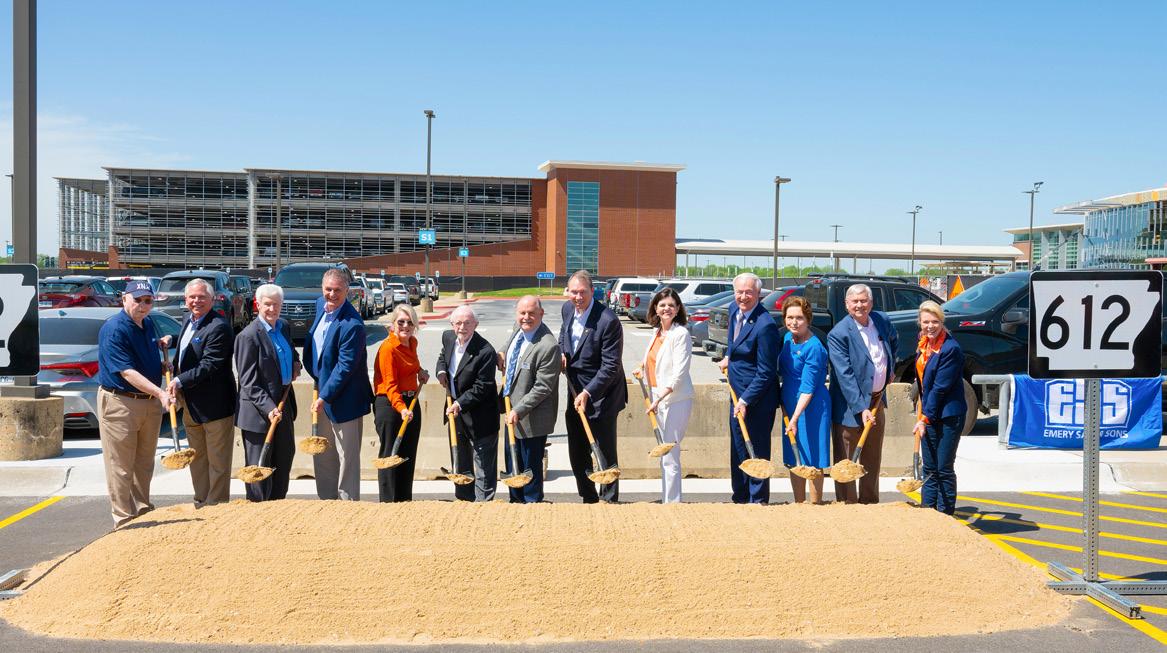
during peak travel times, Wiley said, adding that there are plans to deploy wrong-way crash detection programs on I-40 between Little Rock and Memphis that will alert drivers if they enter the interstate the wrong way and notify interstate drivers if a wrongway driver is detected.
“That’s exciting, just seeing some of that new technology and it's enabling us to save lives,” he added.
Technology has also allowed the road construction industry to become more sustainable. Asphalt is the most recycled material in the U.S., he said, adding that his company recycles about 5,000 truckloads of asphalt a year. In addition, new chemical additives used in asphalt production have reduced the amount of heat required to dry the aggregates, thus reducing greenhouse gas emissions, he said.
Forsgren agreed that recycled asphalt is one of the main ways in which the industry works to be eco-friendly, adding that measures to protect stormwater runoff, prevent pollution and preserve air quality, such as controlling silica dust during concrete construction, have helped the industry become more sustainable.
Wiley said ARDOT works to preserve endangered species by placing restrictions on clearing trees where endangered bats might be hibernating and diving for mussels, which it moves to a safe location if necessary.
“There are many things there that we do,” he said. “We just recently adopted a policy to ensure that we do our best to protect the habitat of migrating monarch butterflies to make sure that we’re not causing a problem for them on their migration, so we
do a lot of neat things, and we’re proud of that.”
The U.S. is currently working to expand its electric vehicle infrastructure through the National Electric Vehicle Infrastructure program, which provided Arkansas with about $54 million, Wiley said, adding that the state is using the money to build out alternative fuel corridors along the interstates before allocating funds to other well-traveled areas of Arkansas.
“I think we’ll see where this new EV movement takes us,” he said. “I think we’ll see some adoption of that. Now I think the private sector and the fair market’s going to drive that, the speed at which EVs become mainstream, but we see Arkansas, I think, becoming an even stronger player.”
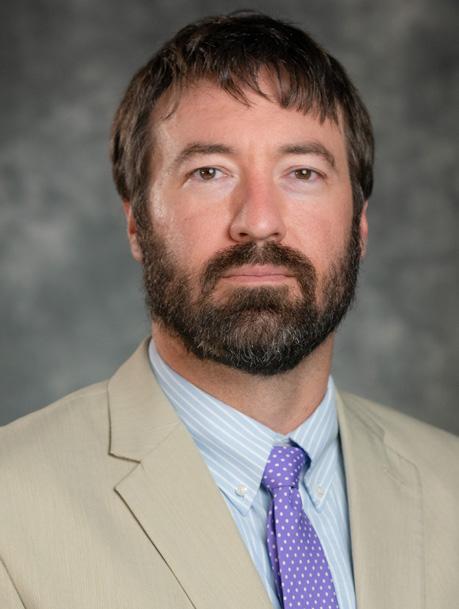

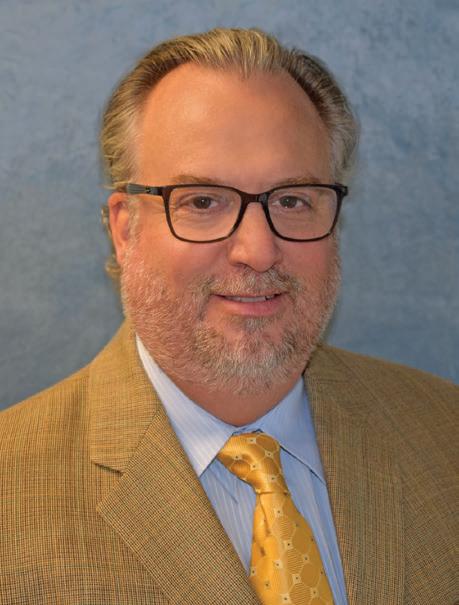
ARDOT recently launched the Transportation Performance Dashboard to keep drivers up to date on pavement conditions, the status of construction jobs, safety data and other metrics across the state.
“The future is bright,” Wiley said. “I think we can’t go very far today without seeing new asphalt, pavement, resurfaced roadways, or bridges being repaired or replaced, so ARDOT, I think nationally, we typically rank in the upper tiers of condition of the system, even though we do have a large system. I think we’re only going to see that continue to improve, given the investment we’re making in taking care of what we have.”
In Hot Springs, a water supply project
more than a decade in the making is nearing completion. Geared toward ensuring an adequate water supply that not only meets local needs but attracts businesses to the area, the project will include an additional water plant that draws water from Lake Ouachita and is set to be complete by the end of 2025.
“The amount of planning and work that’s gone into this project for not just me personally, but for everyone that’s been part of it in the city, we’re very proud of it,” said Bill Burrough, city manager. “It’s been something that will be here long after we’re gone, so anytime you’re able to work on a project like this, you’re truly leaving a legacy behind.”
It took at least 10 years to have Lake Ouachita reallocated as a provider of potable water, an effort the city undertook with the assistance of the Mid-Arkansas Water Alliance, he added.
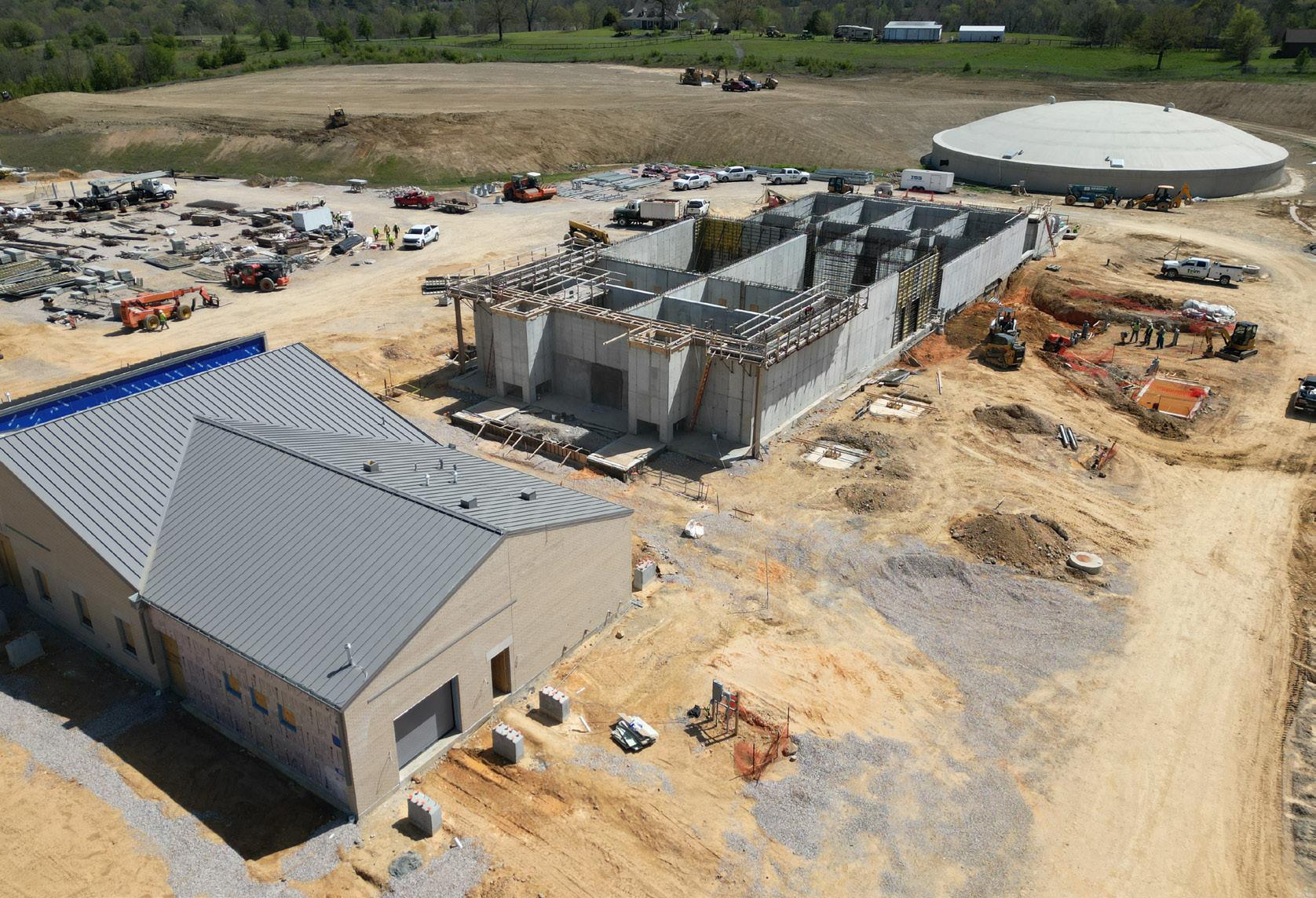
Previously, the city had two water sources. A plant at Lake Rix, a privately owned city lake in Hot Springs, can draw 5 million gallons of water from the lake a day, he said, and the socalled “Lake Ouachita” plant, which actually draws water from Lake Hamilton, can bring in 20 million gallons of water a day.
Accounting for the water needed for processing, the city was able to produce 23 million gallons of water a day, Burrough said.
“I don’t think we can sustain that over a long period of time, and there were times we were exceeding 80 percent of our water supply capabilities,” he said. “Really, once you get that 80-percent threshold with your peak demand, you need to start looking for additional water supply, and that’s really what started us down this path.”
In 2012, the water system exceeded the threshold 56 times, he said. Since then, wetter, cooler summers have reduced water demand, but there are no guarantees when it comes to weather. Meanwhile, the amount of water system users in Hot Springs and Garland County grows by about 1 percent a year, he said.
“This particular project is the largest infrastructure project in our city’s history.”
— Bill Burrough Hot Springs city manager
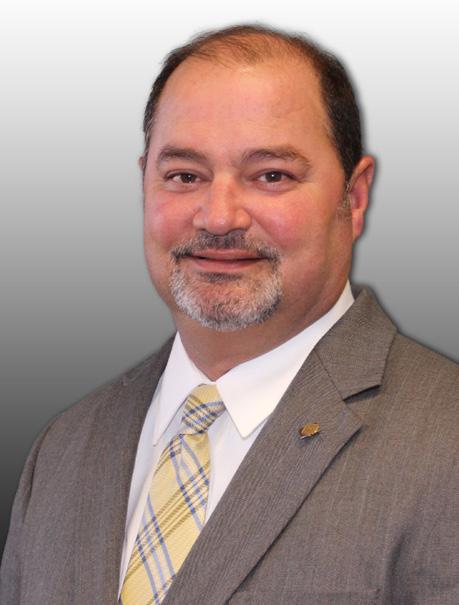
“This particular project is the largest infrastructure project in our city’s history,” he added. “I think history will be kind to the board of directors that currently sit, as well as those previously that served and made the decision to move forward with this plan.”
The $150 million project includes four components: the intake site that draws water from the lake, lines that transport untreated water to the treatment plant, the water treatment plant and lines that transport treated water from the plant to the water system.
“The intake itself is something that we’re very proud of,” Burrough said. “That was a project that’s not been done in North America in the past.”
The city drilled a half-mile through Blakely Mountain to install a 60-inch diameter casing pipe and connect to Lake Ouachita at such a depth that the head pressure of the lake feeds the water into the pipe without the need for pumping.
“That’s going to save, really, a lifetime of costs when it comes to that endeavor,” he said.
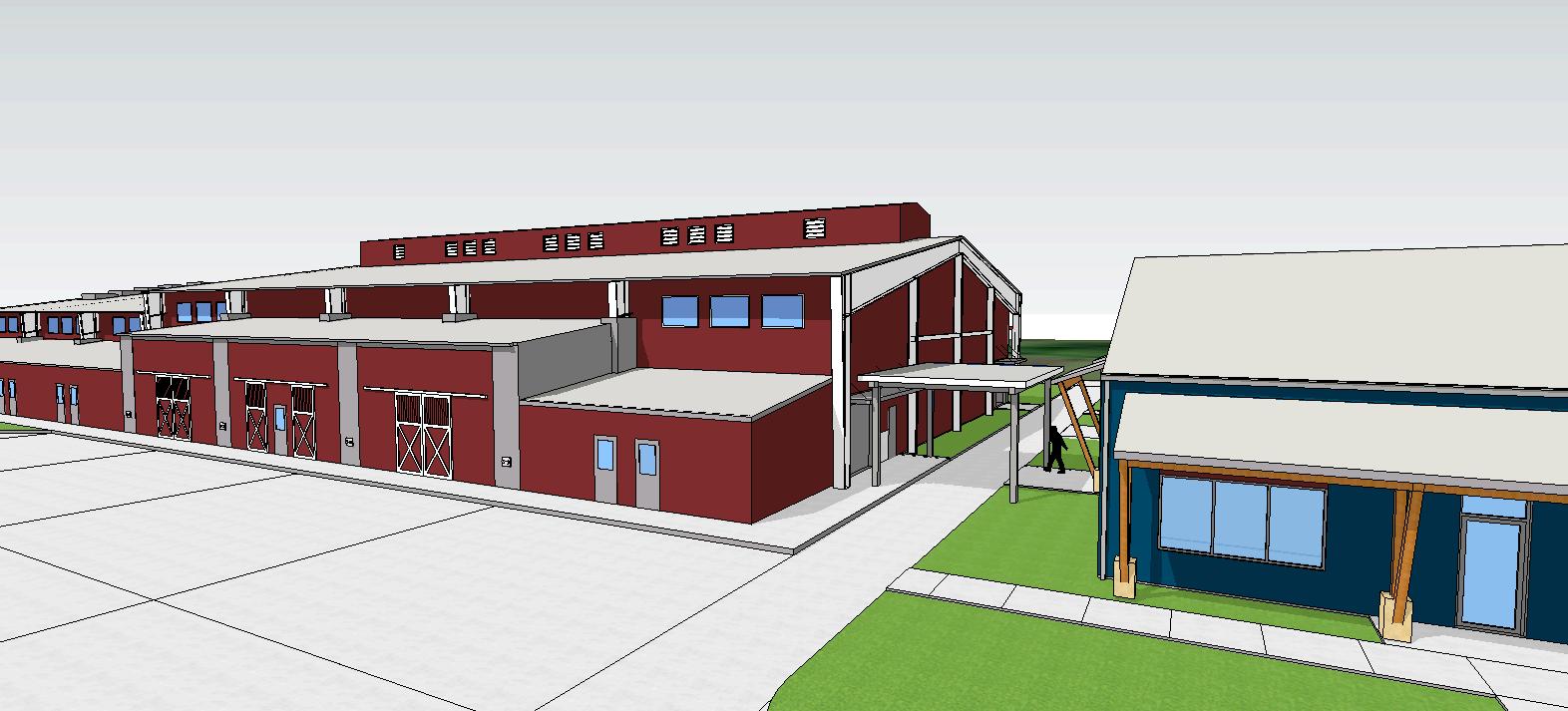
Other feats of engineering included boring beneath Lake Hamilton in the Big Mazarn Creek area and crossing the main channel using a float-and-sink method in which the pipe was constructed on land, connected to the other side of the lake, sunk and held to the bottom of the lake.
“There’s been float-and-sinks but I don’t think to the magnitude of what we’re doing,” he said. “When we crossed under and bored under the lake, I don’t think that’s been done in Arkansas in the past with a line and length of what we have.”
The new 1,720-square-foot plant will produce 15 million gallons of water a day, he said, and situated on a 40-acre parcel of land, there is plenty of room to build a second plant in the future.
“We’re in a good position to build a second plant when the time comes,” he said. “This 15 million gallons a day, though, is going to take us for, you know, several decades before we’ll need to build another plant.”
One of the plant’s more unique aspects is that it will be fully enclosed, so the water will be protected from the elements. From the outside, the plant will not look like a typical water treatment plant. City officials decided to style the building as a barn.
“There’s a lot of pastureland out there, so it won’t be an intrusive building that looks out of place,” Burrough said. “It will be large, but it’s going to look like a large, red barn.”
As other communities in Arkansas experience water supply problems, the project will make Hot Springs attractive to waterintensive businesses, Burrough said.
“This is going to put us in a very good position for the future, not only for our residents and visitors, but for the business community because we will be one of those cities that does have not only ample water supply, but enough capacity to support industry,” he said.
Ensuring the taps flow freely for Hot Springs residents, businesses and visitors will help ensure the city’s success for generations to come, he added.
“We’re very proud of where we are,” he said. “We’ve already accomplished those milestones, and now it’s a matter of just finishing the finished water lines and finishing the plant. This is something, though, that what we do today, our grandkids will benefit from, as well as those who currently live and play in Hot Springs.”












 By Becky Gillette
By Becky Gillette
Amajor factor behind the divide between internet access in rural regions compared to urban areas has been the expense of providing high-speed internet in areas where customers are widely spread out.
The state’s first internet service provider, Aristotle Unified Communications, works to bring broadband internet to areas that have been traditionally overlooked.
“Our network currently covers 14 counties in the Arkansas Delta and central Arkansas, including Arkansas, Desha, Drew, Lee, Lonoke, Monroe, Prairie, Saline and St. Francis counties, as well as portions of Pulaski County and Little Rock,” said Aristotle CEO Elizabeth Bowles. “Aristotle’s network covers 33,000 households in 14 counties in Arkansas and portions of Mississippi, Missouri, Oklahoma and Illinois.”
Aristotle signed up its first dial-up customer and launched its first website on Aug. 15, 1995, at a time when the internet was brand new. Initially, many people questioned the need for internet services, but now most people cannot imagine how they ever managed without it.
“The internet moved from being a luxury to a necessity,” Bowles said. “Not even 10 years ago, there was an intractable 20 percent of Americans who didn’t think they needed or wanted internet access. This changed with the [COVID-19] pandemic, when many services could only be accessed by those who could get online. When work, school and other opportunities moved
to an online environment, the disparity in access between those in urban areas and those living in rural communities became stark. For example, children in the Delta did not have the same access to education as children living in urban centers, and elderly patients did not have access to non-critical medical services as clinics shuttered due to COVID-19.”
In 2020, Aristotle moved quickly to meet this need by using $31 million in CARES Act funding through the Arkansas Rural Connect grant program to deploy a hybrid fiber-fixed wireless network to nine counties and five cities in the Arkansas Delta. Bowles said Aristotle accomplished this deployment in less than 10 months despite being told that would be impossible.
“We are proud that we were able to bring connectivity to thousands of rural residents who otherwise would be unserved even today,” she said.
Overall, the price for internet service is coming down, although Bowles said it may be more accurate to say that consumers can now get higher speeds for the same price. Even so, she sees a need in lower-income communities for assistance affording internet services. Until recently, providers could offer lowerincome households a $30-per-month discount through the Affordable Connectivity Program.
“Unfortunately, the ACP program expired at the end of April, stranding households nationwide that otherwise cannot afford broadband,” Bowles said. “Because the majority of Aristotle’s
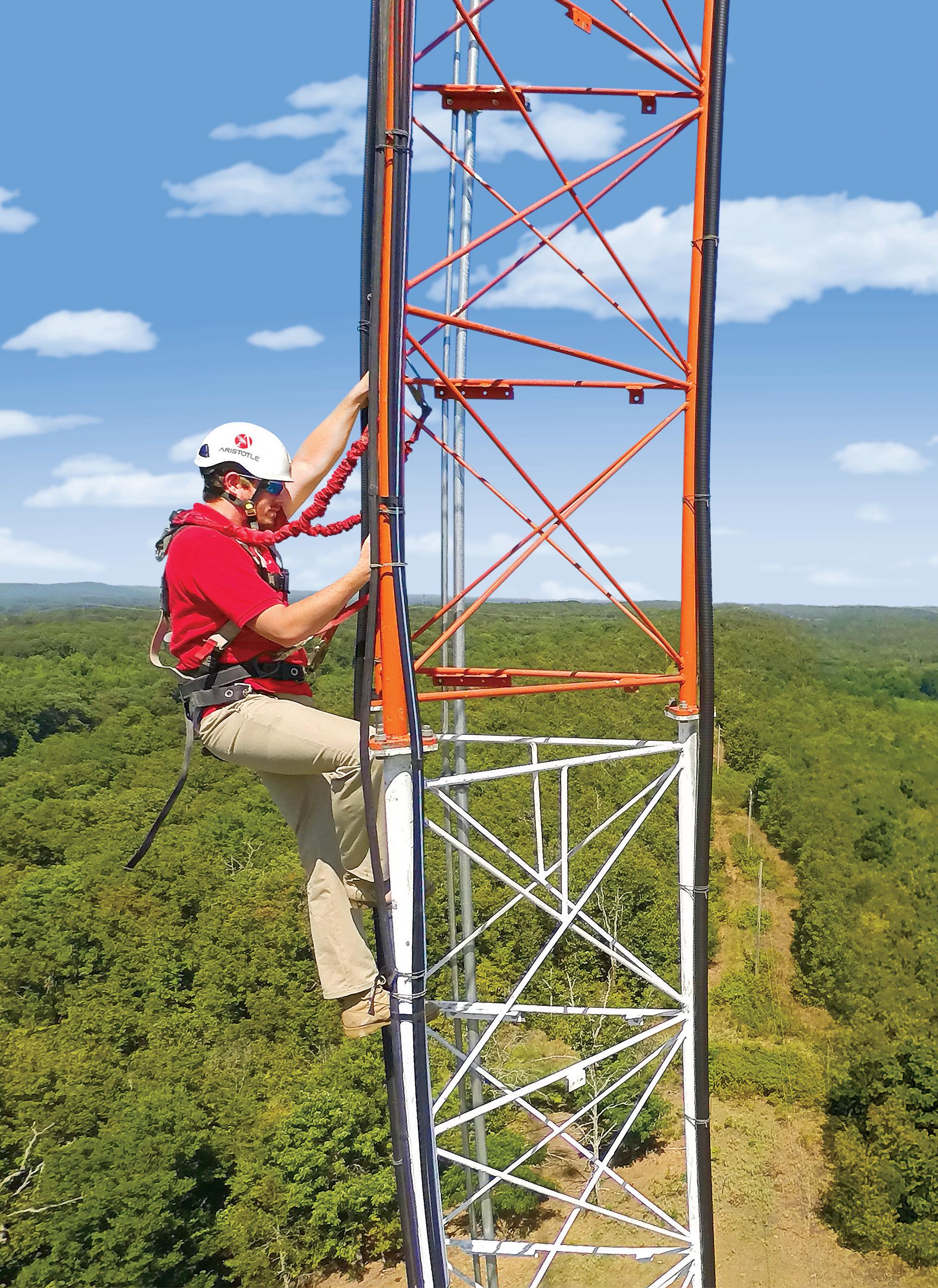
network covers persistent poverty counties, we are keenly aware of the need for ACP to continue. We have been working with the [Federal Communications Commission], as well as our congressmen and senators, to pass legislation that will extend this much-needed program.”
Although Aristotle has never had data caps, data caps are still in use industry wide — particularly with mobile and satellite services — but most federal programs require those caps to be sufficiently generous so as to not interfere with the way customers normally use the internet.
The internet is now being used for multiple applications that were unimagined in the past. Who knows what additional functions will be developed in the future?
“What is clear is that the need for high-quality broadband
An Aristotle Unified Communications worker climbs a cell tower on the outskirts of west Little Rock.
(Photos provided)
services will only increase,” Bowles said. “Currently, through the Infrastructure Investment and Jobs Act, the federal government has allocated $42 billion specifically for broadband deployment, of which Arkansas will receive more than $1 billion. These funds, which will be distributed as grants to companies like Aristotle to serve households that currently do not have access to the internet, will provide fiber-to-the-home services to every unserved Arkansan. While the money is often referred to as ‘once in a generation’ funding, the truth is that the need for additional funding — to sustain the as-built networks, for digital literacy and for upgrades to network infrastructure — will be ongoing.”
Fiber is undeniably the gold standard in internet technology, said Lori Haight, director of markets for Hot Springs-based HyperFiber.
“It is like a firehose of data from the world directly to your home, unlike traditional cable connections or DSL, whose bandwidth is restricted,” Haight said. “Their pipe is not as big or clean as fiber optic. Technologies such as satellite or wireless rely on antenna and receiver technology. Fiber-optic internet transmits data using light pulses through hairthin glass or plastic strands. This equates to data being transferred at nearly the speed of light, providing unrivaled speed and bandwidth.
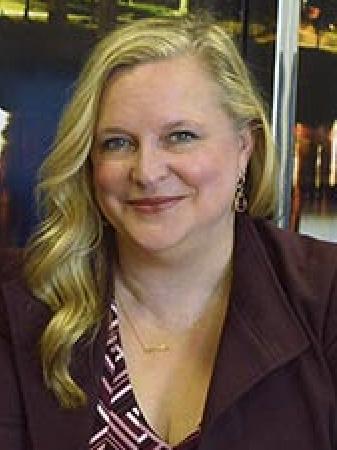
“Fiber also means faster, symmetrical speeds for download and upload. Incumbent technology is not symmetrical. Symmetri- Elizabeth Bowles
cal means a more seamless connection experience, whether you’re streaming, gaming, browsing or getting work done from home. Think of it this way: you can download a twohour, high-definition movie in seconds, compared to waiting 30 minutes or more over a 20 Mbps traditional internet service.”
Haight said fiber also offers users low latency for a lag-free, responsive internet experience, which is especially important today when users need instantaneous responses for work, school or entertainment. Cable and DSL connections may also suffer from signal degradation over long distances.
“Fiber, and more specifically, HyperFiber’s all-fiber optic network, maintains its performance regardless of your location,” Haight said. “Lastly, fiber tends to be more environmentally friendly. Fiber optic cables are inherently more energy-efficient than traditional copper or coaxial cables. The infrastructure for fiber is thus more technologically advanced and eco-friendly. When fiber is laid underground, the network is protected from service disruptions caused by weather and other environmental factors. This means fewer outages for consumers.”
Haight said it is an exciting time to be in the rapidly evolving world of telecommunications. Technological advancements such as 4K resolution and artificial intelligence are driving the demand for more bandwidth.
“Increasing demand for highspeed connectivity is revolutionizing how we communicate and interact,” Haight said. “As a company, HyperFiber recognizes the significance of this era. We are witnessing a transformative period where innovations in connectivity are shaping the future. The ability to connect people globally and deliver faster, more reliable internet services has tremendous potential for various industries, from health care to education to entertainment.”
consumer demand grows, prices become more competitive,” she said. “Additionally, the expansion of fiber infrastructure across the country has led to greater accessibility, creating a more competitive marketplace. This increased competition can drive providers to offer more competitive pricing models to attract and retain customers.”

However, Haight cautioned that it is important to note that pricing trends can vary based on geographic location and the specific service providers in each area. Factors such as market competition, local regulations and the cost of infrastructure development can also influence pricing fluctuations.
“What is clear is that the need for high-quality broadband services will only increase.”
— Elizabeth Bowles CEO, Aristotle
Haight said the company is proud to contribute to the landscape by providing reliable high-speed fiber optic internet solutions. She predicted these advancements in the telecommunications industry will continue to empower individuals and businesses alike by unlocking new possibilities and driving economic growth.
“We are dedicated to staying at the forefront of these rapid changes and ensuring that our customers can take full advantage of the opportunities presented by this dynamic telecommunications era,” Haight said.
Based on recent research and industry reports, there is evidence that fiber internet prices have been experiencing a downward trend in some regions. The decreasing cost of fiber optic technology and increased competition among service providers have contributed to this trend.
“As more providers expand their fiber infrastructure and
“At HyperFiber, we believe in delivering a future-proof, simple product at simple pricing,” Haight said. “We want to make it easy for customers to clearly understand the benefits of what they’re getting by switching to fiber. In a sea of cable internet providers all vying for attention, we want HyperFiber to be the last internet decision a consumer will ever need to make.
“We are a hassle-free provider. Our only product is fast, reliable fiber internet. In an era where the internet supports much of our daily life, from health care, employment, education, entertainment and remaining connected to those in our lives, a high-speed, reliable internet connection is a necessity. In recent years, access to the internet has been increasingly seen as a fundamental right, akin to water or electricity.”
However, not all internet is the same. Haight said fiber broadband, with its unmatched speed and bandwidth, is much more capable of supporting remote workers and students who need instantaneous responses with zero lag time, no matter where they are located. People and businesses often depend on access to high-speed, quality connections to maintain a livelihood.
Telehealth and telemedicine are also on the rise after the pandemic proved the technologies’ efficacy. However, a portion of the U.S. population, particularly in rural areas, does not have access to fiber broadband internet. AARP reports that number to be at least 20 percent of rural residents. Haight said ISPs, government agencies and community stakeholders are working toward ensuring rural populations of the U.S. have access to high-speed fiber internet connectivity which, in today’s world, is essential for many Americans.
No one can deny that the internet touches every aspect of daily living, whether it be working from home, telemedicine, virtual education, accessing vital services or simple streaming and entertainment. According to marketing research company Nielsen, 3.4 billion people surf the internet every day and spend an average of 6.5 hours online. Pew Research Center found that “31 percent of U.S. adults now report that they go online ‘almost constantly,’ up from 21 percent in 2015.”
Despite the obvious need for quality internet, many areas still lack the basic infrastructure required to keep residents connected, or their options are limited to outdated cable or satellite providers. In some cases, slow or unreliable internet can be worse than no internet at all.
Fiber internet provider HyperFiber has moved into Arkansas to close those gaps and give communities a choice when it comes to fulfilling their connectivity needs. Rather than packages and bundles that can be more confusing than convenient, HyperFiber focuses on providing a simple product — unmatched high-speed fiber internet — at a simple price.
“We recognize the significance of the era that we’re in right now, where innovation and connectivity really are shaping our future,” said HyperFiber Director of Markets Lori Haight. “Everything in the home can be connected, and the technology is making it easier for everyone to understand how to use it, but the core of that technology has got to be a reliable connection, and fiber is going to be your most reliable connection.”
Unlike traditional cable connections and satellite internet, fiber optic internet uses pulses of light to transmit data through hair-thin strands of glass or plastic, enabling unrivaled speed and bandwidth for lag-free performance. Fiber also has the advantage when it comes to symmetrical speed, meaning that both downloads and uploads are fast enough for those working from home or running an online business. While traditional providers have slowly come around to the idea of upgrading their networks, HyperFiber’s streamlined approach allows the company to offer improved connectivity more quickly and seamlessly than its competitors.
“We’ve worked hard to cut through all the noise and clutter of all the other internet and cable companies,” Haight said. “Our business model is to build where there is not a fiber to the home option. It’s going to be a dedicated connection to your home, and you have three packages to choose

from — no data caps, no contracts, no equipment fees, no installation, no taxes. Everything’s included in that price.”
With HyperFiber’s “Gig for Life” plan, a customer’s price will never change for as long as they remain with HyperFiber. That reliability speaks to the company’s commitment to service in more ways than one. HyperFiber does not simply install fiber infrastructure and leave; the company works to be a true partner with the communities it serves.
“We have an immersive community experience. People like me go in and meet the decision makers of the community and also with the chamber of commerce and those that are influencers,” Haight said. “We want to know where their need is. Do you have fiber to the home now? What areas need it? Where can we be most helpful to you?”
HyperFiber supports customers through every step of their fiber internet experience, and HyperFiber employees often live and work in the very communities they serve. Technicians are available to help set up streaming devices and offer technical support for any issues. The company’s Green Team works with residents to mitigate the effects of installation, providing restoration services after construction.
“Our promise to communities is that we’re going to leave their yards as good or better than we found them,” said Haight.
Education is another huge part of HyperFiber’s work, and the company partners with homeowners associations and real estate agents to help explain to residents the long-term benefits of fiber. On average, a fiber-to-the-home connection will increase the home value by slightly more than 4 percent, Haight said. Since most of the infrastructure itself is buried underground, fiber is also a more resilient option in the face of extreme weather conditions, especially for customers in the South.
“We take an area, and we field it. We knock on doors. We talk to people and make sure that there’s definitely an interest and explain to them the difference,” Haight said. “Many people have suffered with the pain of the packages and the service that they’ve had, and they don’t know how much better it can be.”

Visitors can often tell the quality of a community and its commitment to infrastructure projects merely by looking at the roads.
Is the roadway striping clear and new? Are there good traffic signals that work in correspondence with each other? Are there cameras atop poles at busy intersections that allow city officials to monitor traffic flow?
These are all indications of a city’s progress, said Jerry Holder, senior vice president and enterprise solutions director at Garver, an engineering, planning and environmental services firm based in North Little Rock.
“I can tell how proud a community is just by driving through it,” he said.
With the release of more federal grant money, increased local sales-tax revenues and matching grant funds, cities are seeing more opportunities for improvement. The investment is cyclical, too, Holder added. A city can become more attractive by improving its look, drawing more people in and collecting more sales taxes.
“It takes money to make money,” Holder said.
Overall, $20.5 billion in federal funds have been disbursed to the country through the Rebuilding American Infrastructure with Sustainability and Equity grant program, and Arkansas cities have benefited. The funds are earmarked to overhaul the country’s public transportation systems to allow residents better access to work, school, health care and appointments.
U.S. Secretary of Transportation Pete Buttigieg called the program the largest ever federal investment in a press release announcing the funding.
Two Arkansas cities recently received nearly $49 million in RAISE discretionary grants to make them more attractive.
In Bryant, $25 million of RAISE funds will go toward reconstructing Arkansas Highway 5. The project will restructure 3.6 miles of Old Stagecoach Road, create a shared-use path, improve storm drainage, add continuous sidewalks and build necessary utility work.
The project’s plan said the new sidewalks and shareduse paths will give commuters “active transportation
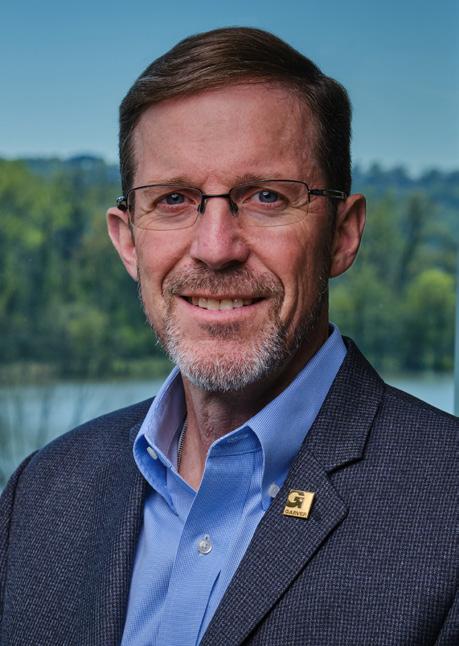
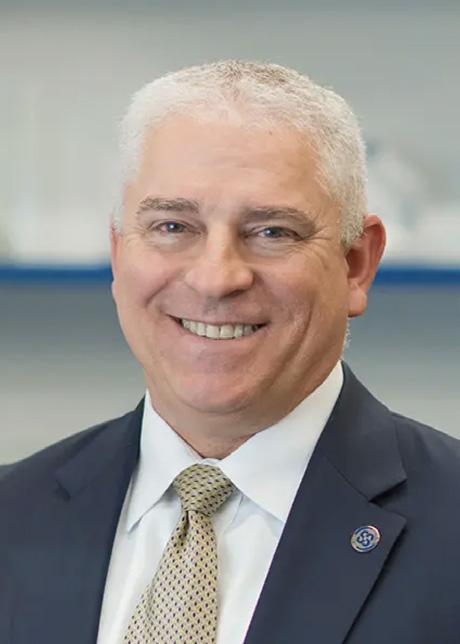
options” that promote health and reduce the chances for accident rates on Bryant’s roadways.
The work is also intended to alleviate traffic from nearby Interstate 30 during peak congestion times.
The walkway will also connect with the Bryant Parkway, a bicycle and pedestrian corridor that connects north and south Bryant and will eventually attach to the Southwest Trail.
Russellville will spend $23.8 million to create 13 miles of new active-transportation infrastructure consisting of 10-foot-wide multi-use trails and side paths.
The system will connect schools, parks, medical facilities and downtown shopping. Plans also call for a bicycle and pedestrian bridge over Interstate 40.
Both RAISE projects prioritize safety, quality of life, mobility, community connectivity and economic competitiveness.
In 2022, Conway received $25 million in RAISE funds to build a greenway trail project through the city. Plans call for the city’s greenway trail to someday connect with existing trails and new bicycle and pedestrian paths throughout cities in central Arkansas.
In addition to the federal RAISE funding, other grants are available to communities.
Fort Smith, Fayetteville, Hot Springs, Russellville and Oklahoma City, the firm has a long reach. Many of the towns and cities it serves are dealing with infrastructure problems.
“Towns are dealing with old sewers and streets, and they need to rebuild them,” he said. “We’re seeing a lot of quality-of-life improvements.”
Several cities have focused on building projects to attract youngsters. Conway has built softball and baseball fields with federal grant money.
“Youth sports are a mechanism for creating a destination spot,”
“Towns are dealing with old sewers and streets, and they need to rebuild them. We’re seeing a lot of quality-oflife improvements.”
— Matt Crafton president and CEO Crafton Tull
Little Rock will receive a $2 million grant to study building a parking deck with a public park on top over Interstate 30. Several cities have also received funding to improve water systems, wastewater treatment plants and airports.
Since 2022, the Bipartisan Infrastructure Law has funded $241 million in water infrastructure projects in the state.
In all, $2.7 billion in Infrastructure Law money has funded 141 projects in the state. Of that, $2.3 billion was invested in bridges, roads, public transit and parks.
“Infrastructure projects didn’t slow down during the COVID-19 pandemic,” Holder said. “There were some essential projects. Getting people to work with better transportation was one. It’s like that saying in the movie Field of Dreams: ‘If you build it, they will come.’ Alternative means for transportation is big. Bicycles, trails, freight, ports — there’s a lot of work going on.”
Matt Crafton, president and CEO of Crafton Tull, an architecture and engineering firm based in Rogers, said his company is also seeing infrastructure projects on the rise.
With satellite offices in Little Rock, Jonesboro, Conway,
Brad Lacy, president of the Conway Area Chamber of Commerce, said in a news release about the parks’ construction.
The city built five softball parks and nine baseball fields.
Jonesboro is creating a $50 million sports complex on Race Street in the south-central portion of the city. Work should begin on that project later this summer. It is expected to generate about $22 million a year in hotel taxes and salesand-use taxes once completed.
The complex will feature a 22,000-square-foot outdoor aquatic pool, as well as basketball, volleyball and pickleball courts.
Searcy leaders are also studying the benefits of a sports park and community center.
“It’s no secret that youth sports is a hot business,” Crafton said. “We’ve seen the transfer to that in the last 20 years. Cities have held bond issues that were paid back with sales taxes with sunset clauses. They use the revenues they earn [through additional taxes] from the infrastructure they made. A lot of people like living in a place that reinvests in itself and isn’t stagnant. They like the continual growth.”
Holder said the improvements help better the image of towns and give them a sense of progressiveness.
“There’s an impacting benefit,” he said. “If you improve the streets and put in sidewalks, it’ll get kids out of walking home from school in the streets. It improves safety. It brings up values of homes and it lowers crime. It changes the mindset of a town when you have these kinds of improvements.”
Crafton said he does not foresee any changes in federal infrastructure investment, regardless of how the upcoming presidential election turns out.
“We’re seeing a big payoff,” he said. “I don’t see that trend changing. I think we’ve proven that.”
















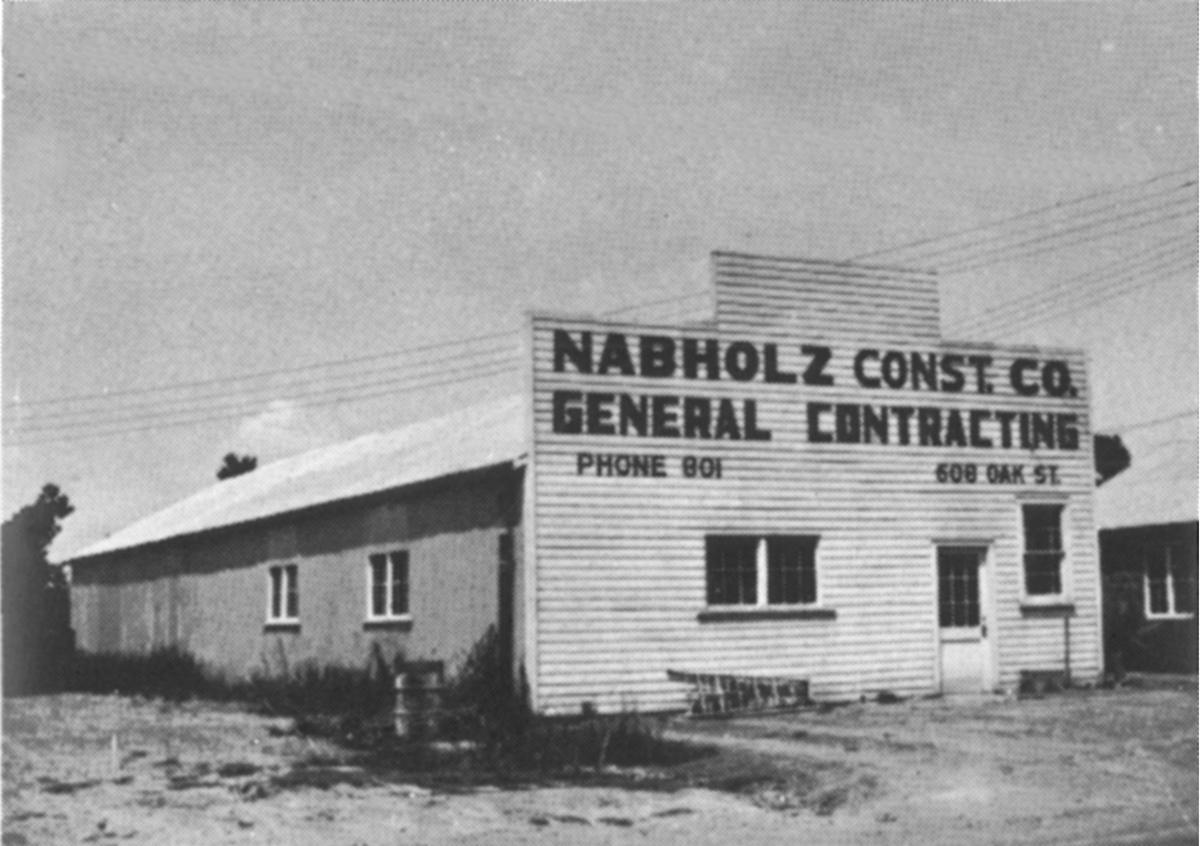





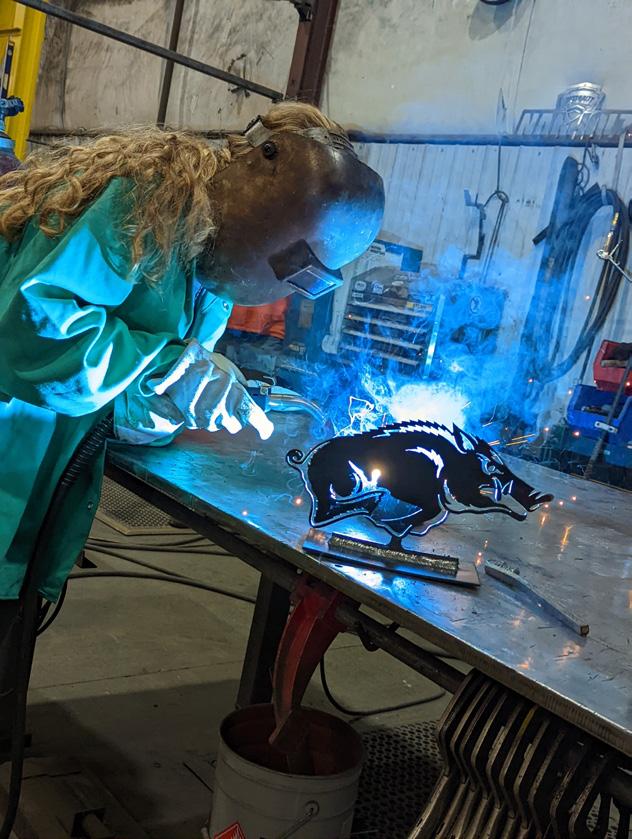

When asked what has remained essential to the longevity of Conway-based Nabholz Construction Corp., which celebrates 75 years in business this year, CEO Jake Nabholz chuckled.
“When I get asked to describe our culture, I always joke that I use a lot of F-words, and people get nervous,” he said. “It’s things like food because we love to eat together. We love fellowship, familiarity. We really take the time to get to know each other.
“Those things are really important to us, and when you have that at your core, it leads to a great work environment. I think we’ve done a good job of maintaining that culture. It’s evolved, but at our core, our team and the people that work here are the most important things about this company. That has not changed over the last 75 years.”
Much like the buildings it has constructed during its run, what one sees from the outside of Nabholz Construction shows only part of the picture. The rest is handed down in good stories by good people. There is the one about how the company launched practically by accident: In 1949, R.D. “Bob” Nabholz was just finishing building a home for himself and his bride-to-be when a passer-by gave him an unsolicited offer to buy it. He took the money, and word soon spread of a new homebuilder in town, birthing what was to become one of Arkansas’ best homegrown success stories.
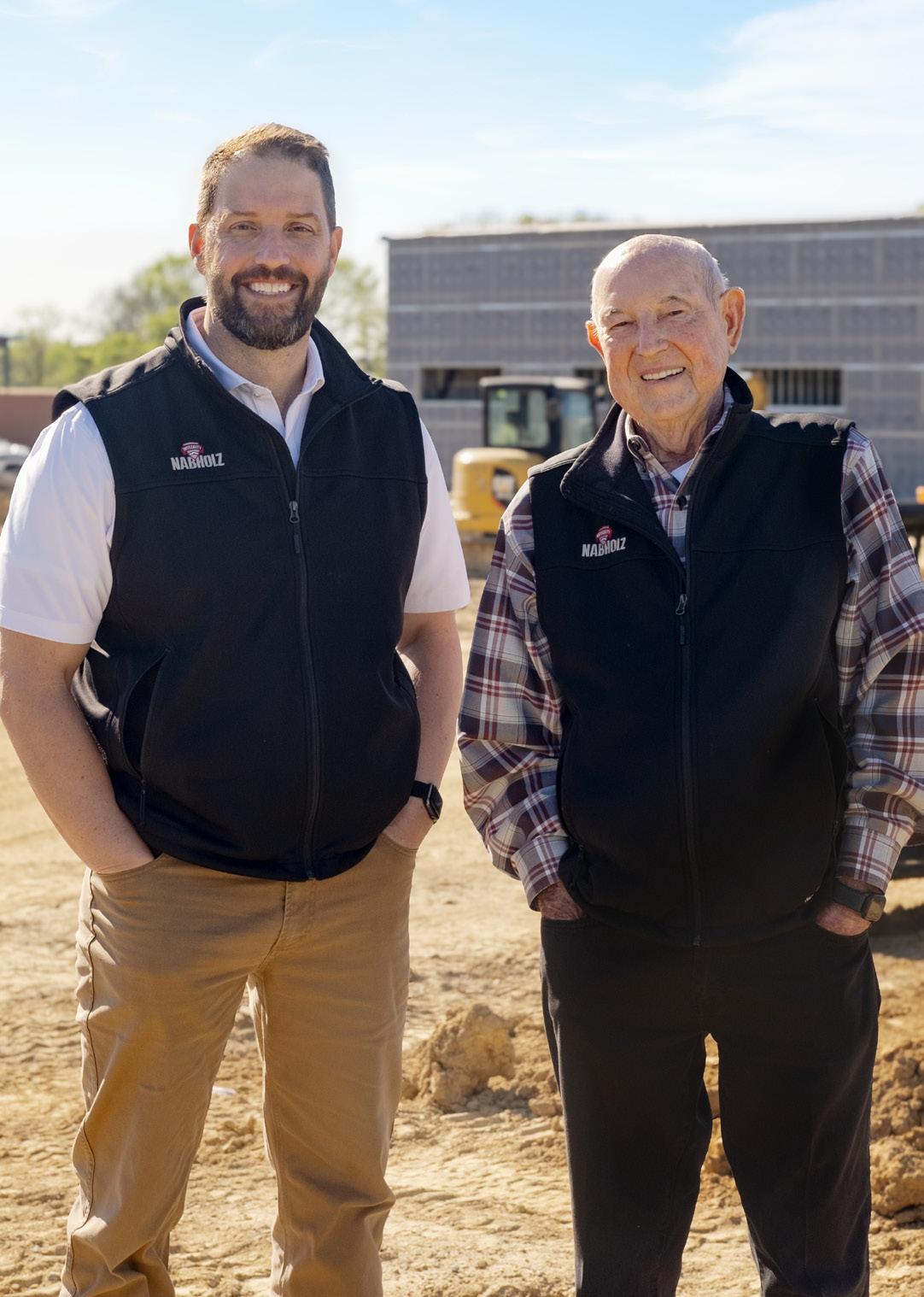
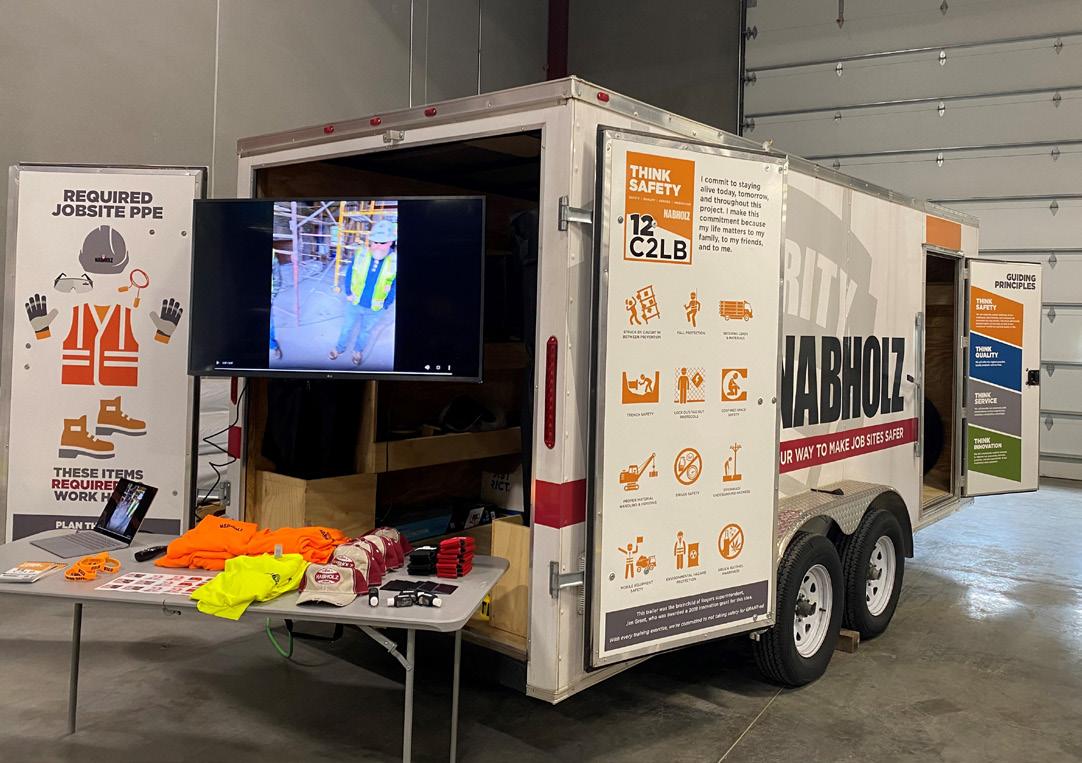
Once formally in business, Bob Nabholz tapped into a ready labor pool made up of his own stock of 11 siblings. From this nucleus of people he trusted most and knew best, Nabholz Construction grew to larger and larger projects. Throughout the years, Nabholz has provided countless jobs for thousands, some of whom, like the family whose name is above the door, include multiple generations.
Palace intrigue has been known to kill the golden goose at such companies, but Nabholz Construction avoided all that thanks to leadership’s well-honed touch for maximizing human capital. The simple but skillful act of placing the right individuals into the right roles and then developing them into the kinds of leaders even they might not have imagined themselves to be worked wonders.
“Grandpa did a really good job setting an example early on that the company has to come first in all the decisions that you make,” Jake Nabholz said. “From that example, kudos to my dad and his uncles, they always put themselves in positions where they could excel and put other people in the positions that they needed to be based on their skill sets. That’s been one of our keys to success.”
Egos were also largely held in check by the ironclad corporate value, intact to this day, of rewards based on merit. Now, as then, no job done well is too menial and no executive more important than the front-line jobber on the worksite which, incidentally, is where many started out.
“I started off as a laborer,” Nabholz said. “I started working with the company when I was in high school and just fell in love with it, particularly the people that work here. It was fun being outside, working outside, working with your hands. I was never pressured to go into the family business. I just really fell in love with it.
“Matter of fact, and my brothers would probably tell you the same thing, when we’d be gone on a job site when we were younger, we wouldn’t tell anybody our last name. We’d always introduce ourselves as Jake or Matt or Nick and we would earn our respect. People would figure it out after a few days, but it showed we were there to work and do what we were supposed to.”
As steeped as company culture was in the value of individuals, leadership spent as much or more time and resources over the years developing those individuals into a cohesive team, often through ahead-ofits-time thinking. Nabholz University, launched in 1973, was one such innovation, being the first in-house carpentry apprentice program in Arkansas to receive certification from the U.S. Department of Labor. The four-year program, still going strong today, provided the blueprint for other initiatives the company has in play to deal with today’s extremely tight labor market, Nabholz said.
“About half of our workforce is craft professionals,” he said. “We’re not just a construction broker. We actually do a lot of our own work. It’s important for us to recruit the professional side, whether that’s legal or human resources, that side, but also recruit people that can actually work with their hands. That, hands down, is our industry’s biggest issue.
“I think what we’re seeing that we’re doing differently and where we’re having success is we’re really putting a lot of effort in our recruitment of people at a much younger age than what we used to. We’re going back all the way to the high school level, trying to get people interested in construction, showing them that there’s an alternative
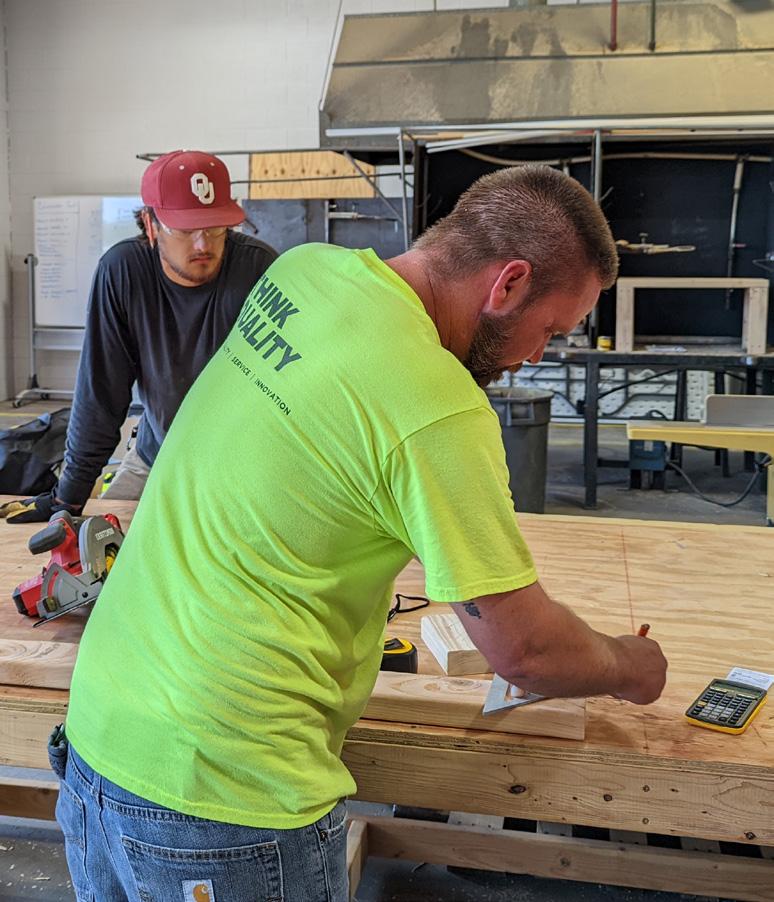

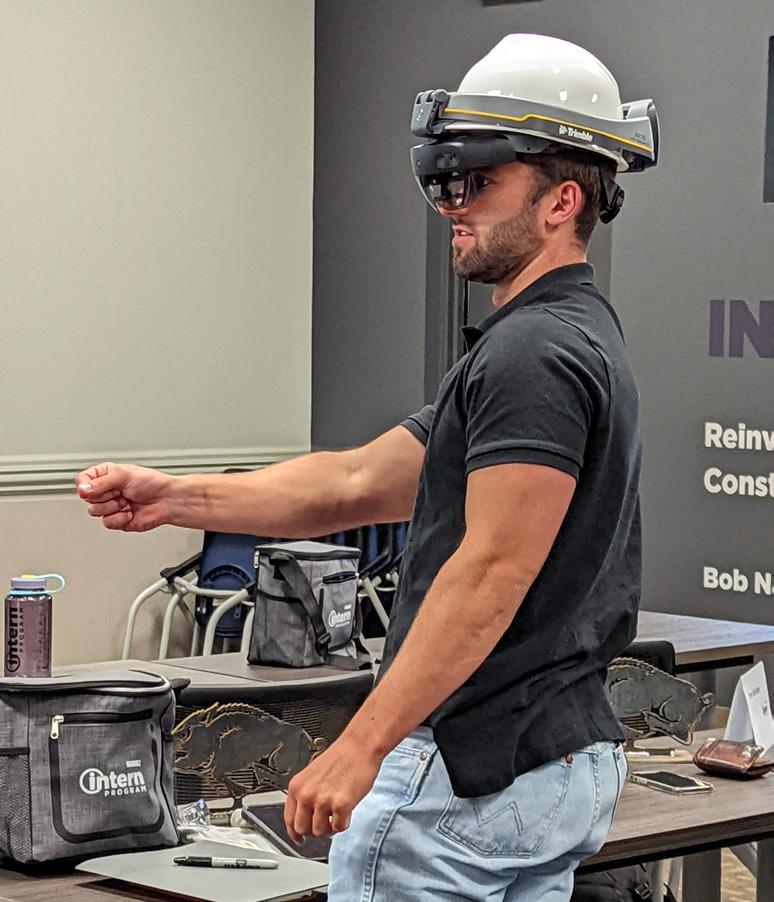
path. I think what you’re seeing that’s different now is that a lot of schools are realizing that and encouraging these kids to go down that path.”
Other ideas that were unique at the time they were introduced included appointing a formal safety director in 1972, years before Occupational Safety and Health Administration mandates, and establishing the Nabholz Charitable Foundation in 1987 as a way to give back in thanksgiving of all the company had received, especially in Arkansas.
“Arkansas is very much a relationship state,” Nabholz said. “Actually, most of the states that we work in — Oklahoma, Kansas, Missouri, Tennessee — are the same as far as that goes. This is why we’re successful in that footprint. People in those communities value hard work and relationships, so when you’re successful and you produce a project in those communities, it builds on top of itself.”
As forward-thinking as Nabholz continues to be, there is still a tangible sense of something old-world in its ethos, an idealism that insists that for as technologically advanced as the industry is becoming and as complicated as jobs may be, executing on fundamentals still wins.
“We tend to not chase projects or clients. What we’re after is someone that likes to do business how we do business, which is on a relationship basis,” Nabholz said. “As far as projects that we’re really good at, I will tell you the more complicated it is, the more someone’s going to look to us to tackle that project. That’s just from being in the market and having that experience and the right people to execute those projects.
“Grandpa was good about saying ‘When you have a big project, everybody’s your friend.’ Well, we don’t want to just serve a client on a big project. We’re built to take care of a client whether they have a large project or whether they just have a small re-
model. If they have a solar project, we’re able to take care of that. If they have environmental needs, we have an environmental company that can take care of that. Our whole business model is set around serving the whole needs of the client, not just a big construction project. I think that’s the difference, the diversity of services that we have. We’re not just a construction company; we’ve got all those other capabilities.”
Perhaps more than anything else, it is this pragmatism that still sings the loudest in the 75-year aria that is Nabholz Construction.
Bob Nabholz, who died in 2002, and his baby brother, Charles Nabholz, today chairman emeritus, were both inducted into the Arkansas Business Hall of Fame, and with thousands of employees and millions of dollars in annual revenue, Nabholz Construction is a force in the construction industry, particularly regionally.
Yet a visit to headquarters just off of the downtown district leads one along a quiet side street to a comfortable building that gives no hint as to the corporate institution it houses. In fact, were Conway a large metro, one might miss one of Arkansas’ most successful companies altogether and be oblivious to it, much like the people who come and go daily into their creations, which range from hospitals and schools to office buildings. Somehow, though, one gets the feeling that it is enough for the builders to know about the work and care that went into those projects yesterday, today and, especially, tomorrow.
“Every time you have a milestone like this, everybody wants to celebrate the history,” Jake Nabholz said. “We’re doing that, but I think what we’re doing differently with our 75th anniversary is we’re honoring what Grandpa did and his forward-thinking attitude and how we’re still doing the same thing now, having that mentality that the decisions and the investments that we make today have got to set us up for the next 75 years. This anniversary is a good chance for us to reinforce that.”





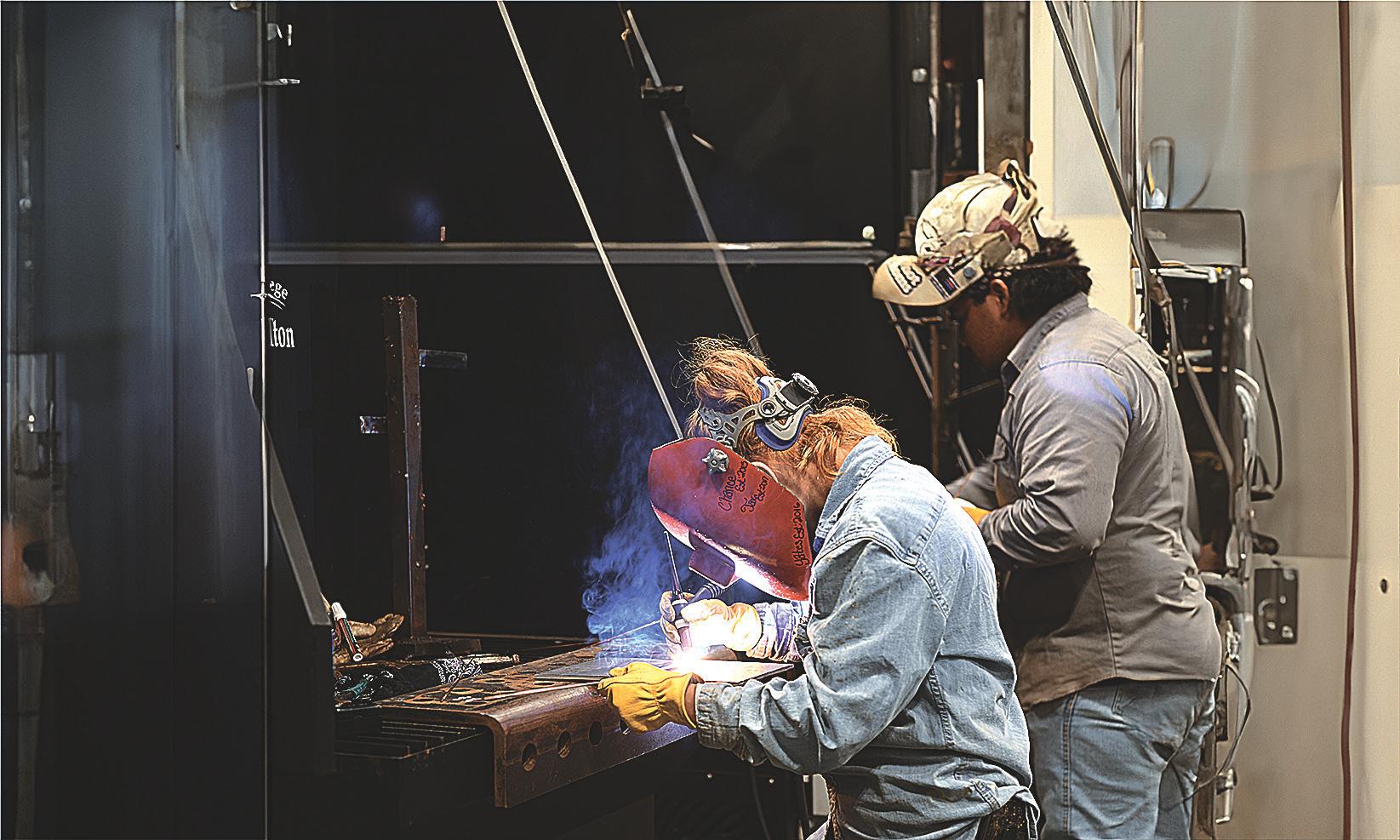
§ Hands-On Training in Modern Labs
§ 2+2 Plans For University Transfer
§ Financial Aid and Scholarships
§ Comfortable, Nurturing Environment
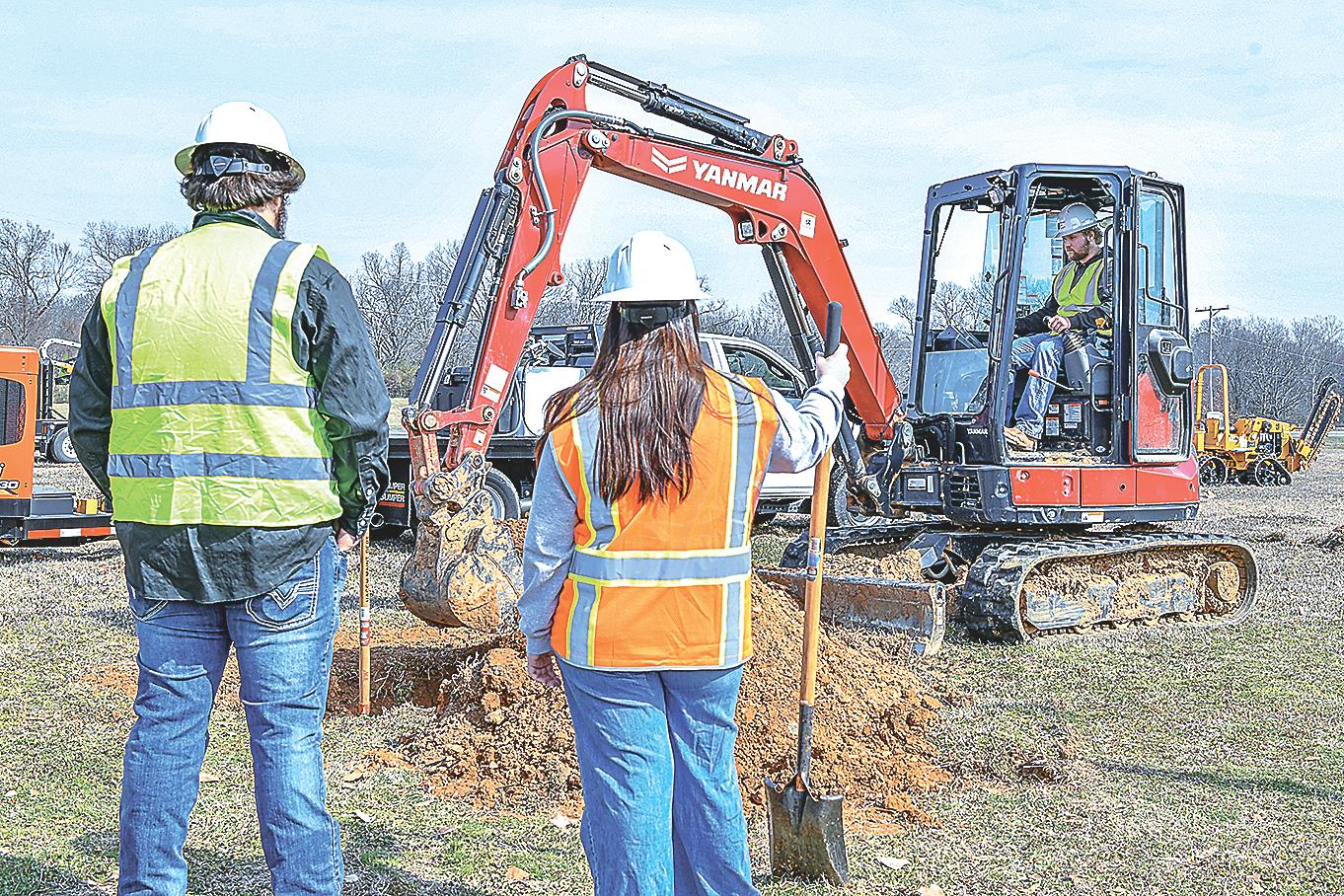
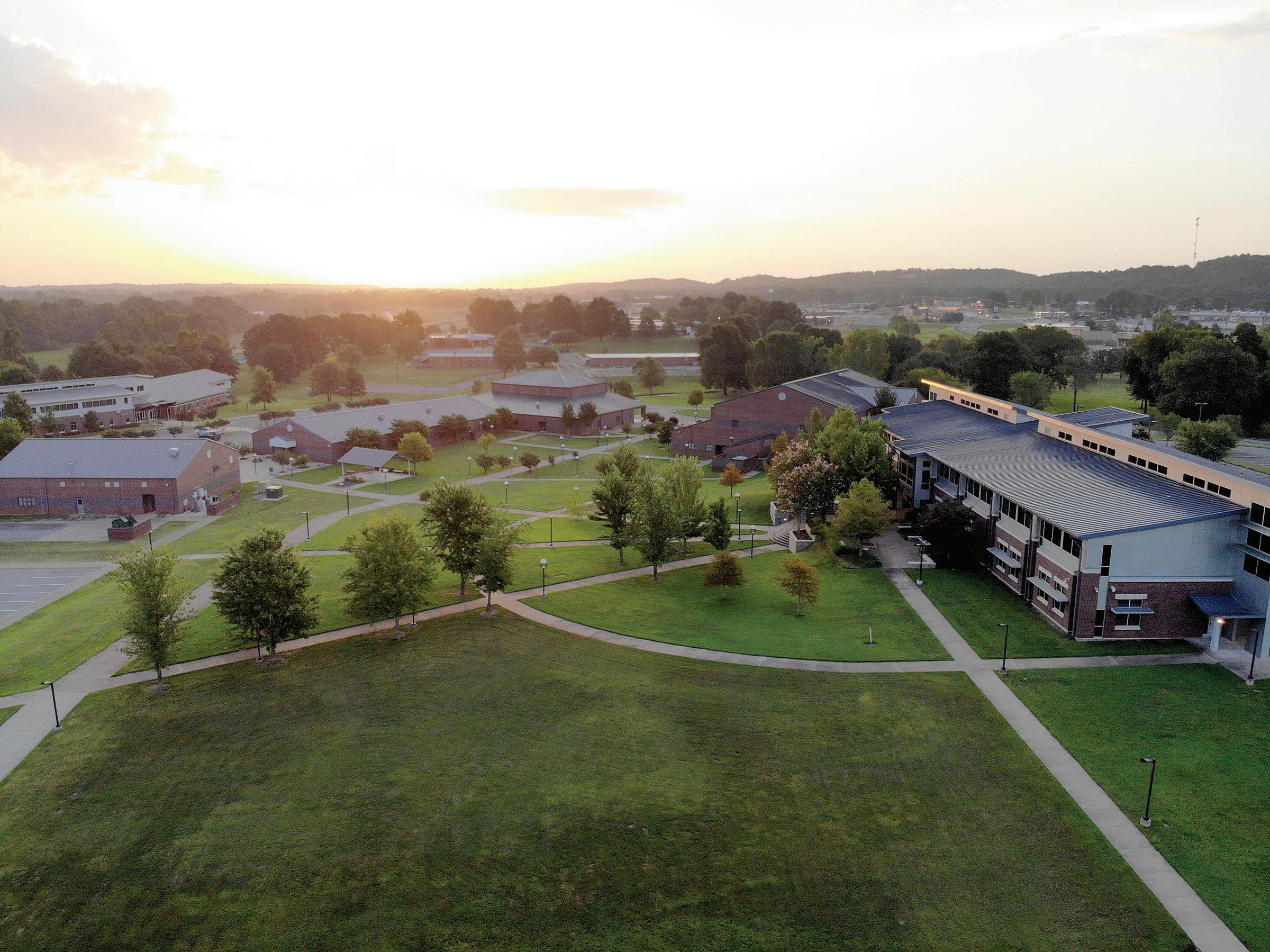


UACCM Congratulates Nabholz on 75 Years of Exemplary Service!
Family is big in Arkansas, and it stands to reason that family businesses are, as well.
Generational businesses are the backbone of business in the Natural State, and while we don’t claim to have a comprehensive list of every family operation out there, we nevertheless can shine a spotlight on some of the state’s prominent family-run stores, companies and firms.
Arkansas Money & Politics is proud to once again recognize generational businesses in Arkansas.
By AMP StaffGES, the business behind Edwards Food Giant and Edwards Cash Saver stores across central and eastern Arkansas, is truly a family affair. Founder Oral Edwards began his grocery career in 1959, moving from Tennessee to Missouri before settling down in Forrest City. From there, Edwards opened stores in Helena, Marianna and several other locations, eventually consolidating them under the banner of GES in 1968.
Oral’s son, Steve Edwards, graduated from Arkansas State University in Jonesboro in 1975 and joined his father’s business shortly after. In the years since, Food Giants and Cash Savers have popped up in Arkansas cities from Brinkley to Bryant.
While the company has had to weather a few storms, such as competing against larger corporations and navigating the supply chain headaches felt everywhere during the COVID-19 pandemic, Edwards has come back stronger through it all. Down to only three stores at one point in its history as the supermarket landscape shifted to accommodate the rise of industry giants, GES now has 15 locations between its Food Giant and Cash Saver brands. Since expanding into Little Rock in the 2010s, Edwards has been able to open or remodel 12 locations over 15 years.
Key to the company’s success is its people-first customer service ethos. Even executives not related by blood have found themselves drawn to that facet of the Edwards brand, including Gary Proffitt, vice president of operations, who joined the company 27 years ago and oversees the retail operations team.
“Steve and Oral taught me how to operate a family-owned company and do it right,” Proffitt told Arkansas Money & Politics in 2023.
GES has also set itself apart thanks to its commitment to innovation and a keen eye for the market segments other stores might have overlooked. When Edwards first implemented its “Pick 5” deal, other grocers were actually moving away from in-house meat cutting and processing. Seizing the chance to fill that gap for consumers, Edwards branded the company as “The Meat People” and pioneeried a deal that can now be found imitated by other independent grocers.
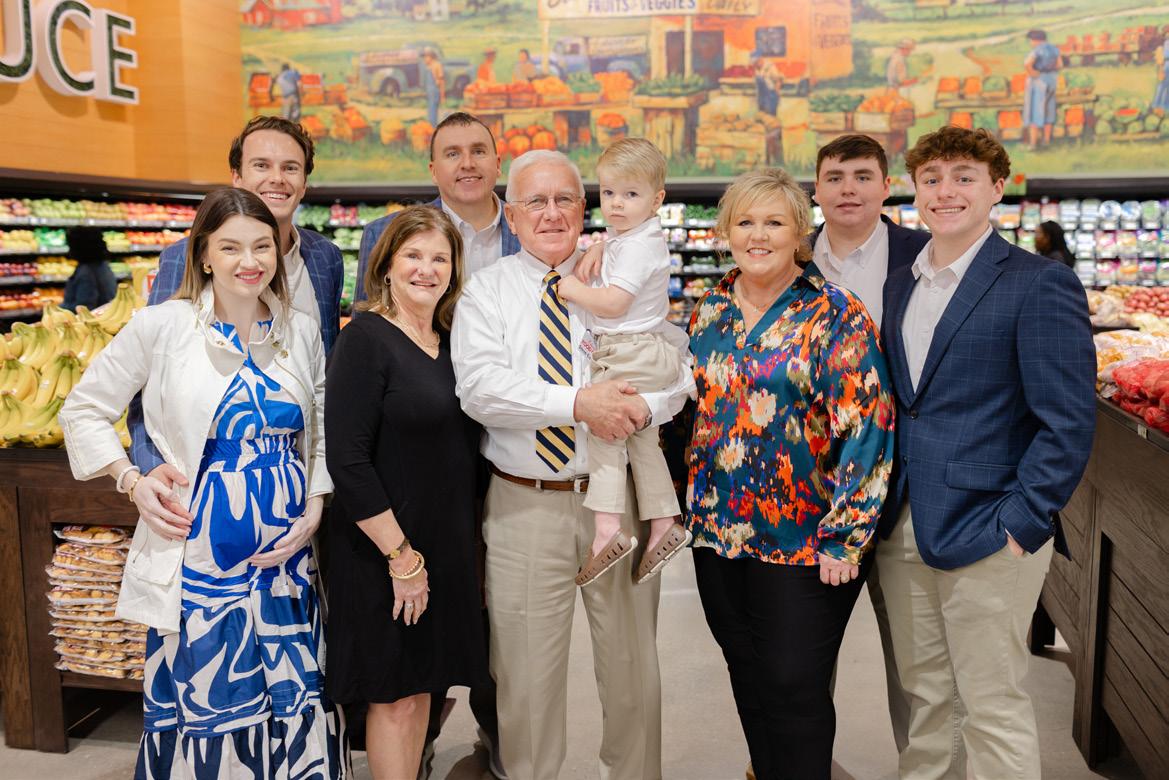
“It really takes a lot of hard work to open a new store,” Steve Edwards said. “Our team does a fantastic job and is focused on offering quality products at an affordable price.”
Though Oral Edwards died in 2017, Steve has continued building on his father’s legacy as president and owner of GES.
In keeping with the family-owned tradition insisted upon since the company’s founding, Steve’s son-in-law, Paul Rowton, joined the company in 2002 and serves as executive vice president. Steve’s son, Steve Edwards Jr., joined the company full time in 2017 and is special projects manager.
Rowton, who served as a store manager throughout the 2000s,
previously worked at the Hershey Co. A fellow graduate of A-State, Rowton brought with him in-depth industry knowledge about manufacturing and wholesaling when he joined the company, and his expertise serves him well as he oversees the executive operations of GES.
Steve Jr. grew up around the business and, like his father, joined the company after finishing college, this time at the University of Arkansas in Fayetteville. Once involved full time, he oversaw the launch of the Edwards Curbside online shopping platform and he continues to lead the company’s rewards and catering programs and marketing efforts.
“My parents would be really excited about the future of the company. We currently have second, third and fourth generations working in the stores, and that is exciting,” he said. “Being able to teach the younger guys many of the things my parents taught me is very rewarding.”
The latest addition to the Edwards family of stores is a new Edwards Food Giant, which opened in April in North Little Rock’s Lakewood Village. The new location is Edwards’ ninth Food Giant and 15th store overall. A comprehensive overhaul of the former clothing store made the new location an example of the company’s ambitions for the future. A wider selection of organic and specialty items are available, in addition to the brand’s continued focus on fresh and ready-to-eat foods.
“As a family-owned and -operated business, we still focus every day on many of the things ῾Papa᾽ focused on in 1959,” Rowton said. “A lot has changed over the past 65 years but taking care of the customers and our dedicated team members is still our No. 1 priority. We will always sell fresh foods, but more than anything else, we are in the people business.”
Those seeking a taste of Arkansas history nearly 100 years in the making need look no further than Petit Jean Meats in Morrilton, a fourth-generation family-owned business that began in 1928.
“For a family business to survive four generations is something we are very proud of,” said Edward Ruff, president.
In 1922, Felix Schlosser immigrated to Little Rock from Germany. He worked at a meat packing plant before moving to Conway and then Morrilton, where he lived near his widowed cousin, Mary Ruff.
There, he partnered with Ellis Bentley to open a small retail meat market and bought out Bentley after two years. The business then caught fire, and Schlosser reopened in 1928 as Morrilton Meat Market and Sausage Factory.
Mary Ruff’s sons, Edward and Lonnie, began working at the business at a young age and watched the business add a wholesale line, become Morrilton Packing Co. and begin using the Petit Jean Meats brand name. In 1943, the business remodeled its plant and closed its retail market.
The business weathered the Great Depression and received a government contract to butcher starving cattle from drought-stricken states to the west. Challenges continued when most working-age men went to war during World War II, and in 1946, a fire destroyed the company’s facilities. The company reopened that year.
The company stopped slaughtering cattle and selling dressed beef to focus on its pork products in 1968. Schlosser died the same year, and the brothers managed the company until Lonnie died in 1979. That year, the business experienced another fire.
Edward’s son, David, became plant manager in 1984. Two years later, he oversaw the construction of a new 48,000-square-foot plant, which allowed the business to add
sliced and vacuum-packed lunch meats and other products in consumer-size packages to its offerings.
Edward died in 1990, and David became president. He led the company until his death in 2018. His son, Edward Ruff, the current president, said that although he has two children, he wants them to pursue whatever makes them happy, rather than feeling obligated to continue the family business.
He added that small businesses play a large role in communities.
“In small communities that are comprised mostly of family businesses, most business owners know each other,” he said. “Their children go to school together and are involved in extracurricular activities together. They support each other. When family business is lost, a part of that community is lost with it.”

Guiding families through some of the most challenging times of their lives has been the Roller family calling for three generations. After a time spent working for McClure Funeral Home in Mountain Home, Denver Roller purchased the business in 1938 and founded the first Roller Funeral Home alongside his wife, Christine. As the only mortician in a six-county area during World War II, Denver was tasked with serving on the homefront by continuing in his vital profession.
The Rollers then relocated to Little Rock in the 1950s, where they acquired Drummond Funeral Home. The acquisitions of Pence, Doolin and McNutt in Conway and Citizens in West Memphis between 1965 and 1968 were part of a series of expansions that would see the Roller name added to funeral homes across the state.
In addition to building up a network of quality funeral directors, Roller pioneered funeral care in Arkansas in other ways, as well. Roller Funeral Homes became the first in the state to offer prepaid funerals in 1968. Today, the Assured Peace Funeral Plan is still the leading plan of its kind in Arkansas, and through the affiliated Citizens Fidelity Insurance Co., Roller Funeral Homes offers families a variety of life insurance and pre-planning options to help cover final expenses. Roller also established the state’s first crematory in the 1970s.
By the time of Denver’s death in 1985, Roller Funeral Homes had grown to 13 funeral homes, five cemeteries and two crematories united under the white dove logo. The company now sits atop the industry as the largest provider in Arkansas of death care and has 24 funeral homes, nine cemeteries, two crematories and two flower shops.
company after Denver’s death and built Citizens Fidelity Insurance Co. into one of the state’s largest domestic companies. Renata’s husband, Tim Byler, is vice president of management information systems at Denver Roller.
“Being the third generation of my family operating Roller Funeral Homes is not just a responsibility; it’s a profound honor,” Jenkins Byler said. “It speaks volumes about the loyalty and trust that families have placed in us over the years. I’m honored to be here to carry on the legacy and receive their loyalty, knowing that we have made a positive impact on so many families.”
She grew up in the profession and has become a leader in the funeral industry in her own right, as well. She has held positions within the Arkansas Funeral Directors Association and has served as the state’s representative for the National Funeral Directors Association’s Policy Board. The Roller family established the Arkansas State University-Mountain Home funeral science program, and Jenkins Byler continues to serve on the ASUMH board of visitors, an advisory board to the chancellor. She also serves on the University of Arkansas-Pulaski Technical College Foundation and Baptist Health Foundation boards.
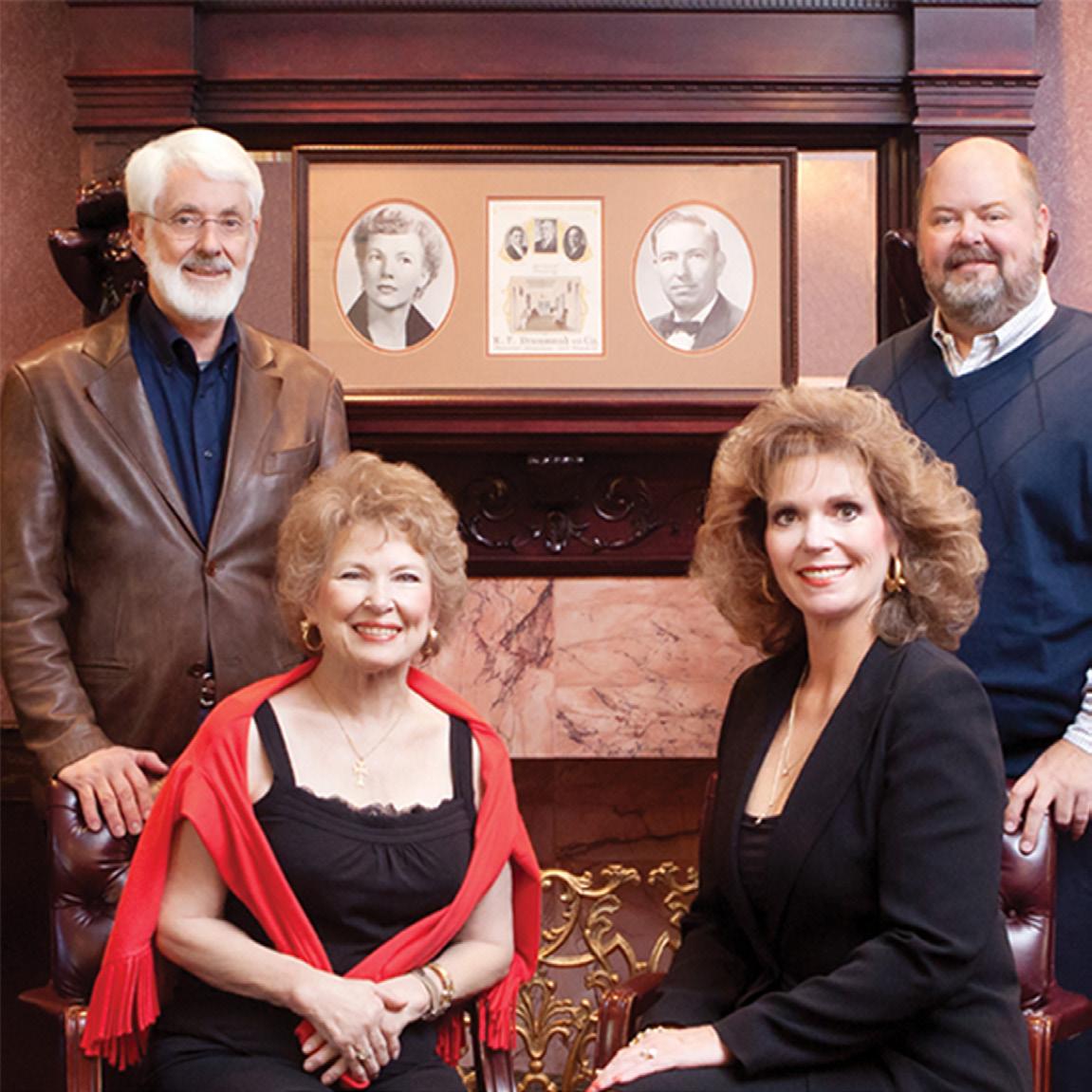
Roller Funeral Homes demonstrated its commitment to its neighbors in particularly dramatic fashion in 2023, when the EF3 tornado that swept through Little Rock on March 31 severely damaged the Roller-Chenal Funeral Home. Roller was able to continue serving families thanks to a swell of local support, and the newly rebuilt Roller-Chenal location is expected to be complete next year.
“For us, being family-owned is more than just a business model — it’s a reflection of our values and our commitment to the communities we serve,” said Renata Jenkins Byler, third-generation owner and vice president of marketing and facilities at Denver Roller. “My family’s ownership ensures that I get to keep that important one-onone connection with my coworkers. My door is always open to them.”
Each generation of the Roller family has had a hand in extending the company’s wide-ranging services. Sue Roller Jenkins, daughter of Denver and Chistine, and her husband, Lynn Jenkins, guided the
“My vision for the future of Roller Funeral Homes is deeply rooted in the lessons I’ve learned from my grandfather, whose vision extended far beyond the first funeral home,” Jenkins Byler said. “I envision us expanding our reach across Arkansas while remaining steadfast in our commitment to personalized service and attention to detail, ‘With All Our Respect.’ Like my grandfather, I believe in never getting too comfortable and always being prepared to grow, ensuring that we can continue to serve our communities with excellence for generations to come.”
There are generational businesses, and then there are iconic generational businesses. Few businesses in Arkansas, retail or otherwise, have been around longer than Little Rock’s Tipton & Hurst, the floral and gift retail juggernaut launched in 1886, and fewer embody the company’s generational spirit.
Tipton & Hurst is as iconic an Arkansas brand as any and, through its longtime flagship store in the city’s Heights neighborhood, has grown into a true Little Rock institution.
Third-generation owner Howard Hurst credits family, appropriately enough, for the company’s success. That family is represented by his co-founder grandfather and his father, who took the company reins, as well as other family members before him who helped make the operation a success.
For Hurst, though, “family” extends to Tipton & Hurst’s faithful customers and longtime employees, some of whom have worked at Tipton & Hurst for decades. He said one former employee embodied the spirit of his family business as much as anyone: the late Jane Whitney.
“She solidifies the story of what we’re all about,” he said. “She was an institution.”
Whitney worked for Tipton & Hurst as sales manager and clerk at the Heights store for more than 40 years before her death in 2010. Her dogged determination to ensure customer satisfaction and genteel spirit left an impression, Hurst said. The diminutive Whitney never met a stranger and seemed as delicate as a flower but would turn terrier if anyone took on her family, which included Tipton & Hurst as an institution and its employees, he added.
Growing up working at the Heights store, Hurst came to look at Whitney as another mother. He said he remembers her as an innovator who was willing to challenge the status quo and for the butterfly pins she wore on her lapel every day. He still brings her up in staff meetings and strives to emulate her approach, he added.
“I went to market with her since I was about 14,” he said. “Jane and so many of our longtime employees saw me grow up as a kid.”
Such longtime employees who helped make the store an institution include company vice president Chris Norwood, whose tenure at Tipton & Hurst extends into the decades.
“Chris has been with us 35-plus years, and we have a couple of others who were here over 40 years,” Hurst said.
As steeped in history as it is, Tipton & Hurst has not rested. Now with more than 100 employees across its four locations in Little Rock, North Little Rock, Conway and Pine Bluff, the company has adapted with the times while maintaining the qualities that attracted so many devoted employees, he said.
“We have to change constantly,” he said. “Trends come and go, and maybe you have to reinvent something with a different twist, but you have to stay on top of the trends.”
Hurst said he empowers each of his employees to do whatever is necessary to make customers happy because “we’re held to a higher standard than anybody.”
“There is no risk in doing business with us,” he said. “We don’t

cut corners and only buy the best. That’s what everyone’s expectations are, and ultimately, that’s what matters.”
Tipton & Hurst employees deliver immediate satisfaction to customers, Hurst said, but also receive it when they see the results of their work on customers’ faces.
“We see the end results of what we do pretty quickly,” he said. "These are very important moments in customers’ lives, and so it’s also an immediate gratification for the people who work here.”
Hurst said Whitney came to mind in a recent staff meeting when discussing how to adorn a new arrangement. The new arrangement included butterflies.
“Generational is what it is all about, and that doesn’t mean you just rest on your laurels,” he said. “You’ve got to stimulate people. Change is exciting. We’ve taken care of generations of customers, and for us, having key people who love what they do has been a big part of our success.”
ACE Glass
Windows/Glass, Little Rock
Agency GWL
Advertising, Little Rock
Akel’s Carpet One
Carpet/Flooring, Little Rock
Albright Ideas
Advertising, Little Rock
Alford’s Carpet One
Floor & Home
Decor, Fort Smith
Anthony Timberlands
Wood Supplier, Malvern
Arkansas Graphics Printing, Little Rock
Arkansas Land Co.
Real Estate, North Little Rock
Arkansas Mailing Services
Mailing Services, North Little Rock
Arrow Plumbing Plumbing, North Little Rock
Bank of England Banking, England
Bell & Co.
Accounting Firm, North Little Rock
Blackmon Auctions
Auctioneer, Little Rock
Blakeman’s Fine Jewelry
Jewelry, Rogers
Bray Sheet Metal
Sheet Metal, Little Rock
Brown Boys Roofing
Home Improvement, Bentonville
Bruno’s Little Italy Restaurant, Little Rock
Capitol Glass Co.
Auto Glass, Little Rock
Established in 1950, Capitol Glass Co. is the oldest locally owned and -operated glass company in the Little Rock area.
For more than seven decades, the company has maintained the reputation of quality and safety earned by longtime owner Jack Grimes. The company now is owned by Grimes’ son, Glenn Grimes, who grew up in the
business and started working full time
at Capitol Glass in 1972.
Cavender’s Seasoning
Culinary, Harrison
CBM Construction Co.
Construction, Little Rock
C.C. Jones Trucking
Trucking, North Little Rock
Chi’s Chinese Cuisine
Restaurant, Little Rock
Clark Machinery Co.
Construction Services, Fort Smith
Cogswell Motors
Auto Dealership, Russellville
Cooper Family Dentistry
Dental, Jacksonville
Coulson Oil Co.
Petroleum Distribution, North Little Rock
Coy’s Southern Eats
Culinary, Hot Springs
Cozy Caverns Storm Shelters
Emergency Prep, Austin
Crews & Associates
Banking, Little Rock
Crow Burlingame
Auto Parts, Little Rock
Curry’s Termite, Pest &
Animal Control
Pest Control, Little Rock
CustomXM
Printing/Promotional, North Little Rock
Daniel & Jones Orthodontics
Dental, Little Rock
DASH Heating, Cooling & Plumbing
HVAC, Little Rock
DataPath
Employee Benefits/Tech, Little Rock
David’s Burgers
Restaurant, Conway
Diamond Center
Jewelry, Fayetteville
Dillard’s Clothing, Little Rock
DJ’s Auto Repair
Auto Repair, North Little Rock
Doe’s Eat Place
Restaurant, Little Rock
Dryden Pottery
Pottery, Hot Springs
Don’s Supply
Restaurant Supply, Little Rock
Duffield Gravel Co.
Quarrying, Mineral Mining, Russellville
E.C. Barton & Co.
Retail, Jonesboro
Edwards Food Giant
Grocery, Marianna
Feltner’s Whatta-Burger
Restaurant, Russellville
Ferstl Valuation Services
Real Estate Appraisal, Little Rock
First Arkansas Bank & Trust
Banking, Jacksonville
First Security Bank
Banking, Searcy
Five Oaks Duck Lodge
Hunting Lodge, Humphrey
Fort Thompson Sporting Goods
Sporting Goods, Sherwood
Freyaldenhoven Heating and Cooling
HVAC, Conway
Fuller and Son Hardware
Hardware, Little Rock
Garrett Excavating
Construction Services, Benton
Gaston’s White River Resort
Resort, Lakeview
Generations Bank
Banking, Fayetteville
George’s
Food Manufacturing, Springdale
Graham Hardware
Hardware, Wynne
Grandeur Fasteners
Manufacturing, Danville
Gwatney Chevrolet Co.
Car Dealership, Jacksonville
Harps
Grocery, Springdale
Harrell Bancshares
Banking, Camden
Hathaway Group
Real Estate, Little Rock
Hopkins Braces
Orthodontics, Searcy

Equipment Rental, Little Rock
The company known today as Hugg & Hall was founded in 1956 and purchased by Charles Hugg in 1970 and by John Hugg and Robert Hall in 1990. Over the years, the firm expanded into neighboring states and now has 19 locations in Arkansas, Oklahoma and Louisiana.
Hum’s Hardware and Rental Construction Services, North Little Rock
Humphrey Funeral Service
Funeral Home, Russellville
Innerplan
Office Interiors, North Little Rock
Iriana’s Pizza Restaurant, Little Rock
K Hall & Sons Produce Grocery, Little Rock
Keith Smith Co.
Egg Distribution, Hot Springs
Kitchens Pediatric Dentistry
Pediatric Dentists, Little Rock
Kittle’s Garage
Automobile, North Little Rock
Leonard’s Hardware Hardware, Russellville
Lewis Ford Sales
Car Dealership, Fayetteville

Construction, Little Rock
The late Tom Schueck founded what became Lexicon in his Little Rock garage in 1968 with $200 in the bank and a pregnant wife at home. Thanks to his family’s dedication to building America, Lexicon has grown into one of the nation’s leading fabrication and construction companies and has more than 2,000 employees. On March 3, 2020, Schueck passed away at age 78. He was the chairman of Lexicon.
Today, under the guidance of president and CEO Patrick Schueck, the Lexicon family of companies combines a
commitment to excellence with cuttingedge robotic technology, an emphasis on safety and superior craftsmanship to complete iconic steel fabrication, construction, energy, industrial, commercial and public projects. Those companies include Custom Metals, Heritage Links, Lexicon Energy Services, Lexicon Fabricators and Constructors, Lexicon Industrial Contractors, Prospect Steel and Steel Fabricators of Monroe.
Lift Truck Service Center
Heavy Equipment, Little Rock
Lindsey’s Hospitality House Restaurant, North Little Rock
Maple Leaf Awning & Canvas Outdoor, Sherwood
Martinous Oriental Rug Co. Decor, Little Rock
Mays, Byrd & O’Guinn Legal, Little Rock
McCauley Services
Pest Control/Electrical, Bryant
McClendon’s Appliance Repair, Benton

Mercedes-Benz of Little Rock
Car Dealership, Little Rock
Mercedes-Benz of Little Rock began as Riverside Motors in Little Rock’s Riverdale neighborhood in the 1970s, launched by auto enthusiast, philanthropist and former Arkansas Gov. Win Paul Rockefeller. Today, the dealership remains in the family as part of Winrock Auto Group, which includes the Little Rock Mercedes-Benz, Porsche, Land Rover, Volkswagen and Subaru dealerships, as well Honda World of Conway and Honda of Jonesboro.
Myers Supply and Chemical
Janitorial Equipment Supplier, Hot Springs
Miller’s Drug Store
Pharmacy, Malvern
Moon Distributors Distribution, Little Rock
Nabholz Construction Corp.
Construction, Conway
Nabholz Construction Corp., started in 1949 as a small, family-owned construction company, has grown into a large, multi-discipline, employee- and familyowned firm still focused on one thing — integrity. The Nabholz name has been synonymous with integrity since R.D. "Bob" Nabholz founded the business 75 years ago, and it remains the firm’s guiding principle and the foundation of every project the company touches.
National Custom Hollow Metal Doors & Frames
Hardware, Little Rock

Network Services Group
Computer Support and Services, North Little Rock
Network Services Group got its start in 1989 as an outgrowth of a telecommunications consulting firm. From the start, NSG has been committed to delivering quality products and service — a focus that has not changed in more than three decades, even as the technology and systems they work with have evolved at a rapid clip.
Ryan Flynn was named president of Network Services Group in 2013, after 15 years with the company. Over the decade since, NSG has grown from 11 employees and a single location in North Little Rock to more than 65 employees and three locations in Arkansas.
Oaklawn Racing Casino Resort Gambling, Hot Springs
Parrish Delivery Services
Mail/Courier, Little Rock
Peneprime of Arkansas
Asphalt, Little Rock
Peters Family Living Furniture, Russellville
Petit Jean Meats
Food Processor, Morrilton
Pettus Workplace Solutions Office Supplies, Little Rock
Phelan Orthodontics
Orthodontics, Little Rock
Phil Wright Autoplex
Auto Dealership, Russellville
Pine Bluff Sand and Gravel Co.
Construction Services, White Hall
Poe Travel Travel, Little Rock
Post Winery
Winery, Altus
Power Technology
Lasers, Alexander
Precision Print Solutions
Printing and Promotional Items, Little Rock
Ranalli Farms
Grocery, Farm Equipment, Feed, Springdale
Red River Auto Group
Auto Dealership, Jacksonville
R&E Supply Co.
Hardware, Little Rock
Richards Honda-Yamaha
Automotive, Little Rock
Rick Ferguson
Custom Homes
Home Builder, Little Rock
Riggs Cat
Heavy Equipment, Little Rock
Ritter Communications Telecommunications, Searcy
Roller Funeral Homes
Funeral Home, Little Rock
Russell Chevrolet Co.
Automotive, Sherwood
Simmons Foods
Manufacturing, Siloam Springs
Founded in 1949, Simmons Foods, a processor of poultry, pet and animal food, has grown to become one of the top 15 poultry producers in the nation. Simmons and its affiliates have more than 8,000 employees and serve customers in all 50 states and more than 40 countries. Simmons is led by third-generation CEO Todd Simmons.
Sissy’s Log Cabin
Jewelry, Little Rock
Smith Ford
Automotive, Conway
Smith Family Funeral Homes
Funeral Home, North Little Rock
Sol Alman Co.
Recycling, Little Rock
SportStop Inc.
Sports Apparel, Little Rock

Stallion Transportation Group Transportation, Beebe
Stallion Transportation Group traces its roots back to 1992 and Butch Rice with Stallion Enterprises. In 1998, Rice transitioned the company to an asset-based full truckload carrier, Stallion Express.
From its beginnings in a one-room office in North Little Rock, Rice grew Stallion into a total transportation company with its corporate office in Beebe. Stallion Transportation Group stands on the foundation that Rice’s father taught him, and dedication and loyalty drive his passion for success.
Star Bolt
Fasteners, North Little Rock

Stephens Inc.
Finance, Little Rock
Stephens is a leading family-owned investment firm comprised of the businesses of investment banking, advisory services, sales and trading, research, insurance, and wealth management. Stephens’ U.S. operations are headquartered in Little Rock. There are additional locations in strategic domestic markets, and Stephens has a European presence in England and Germany.
W.R. “Witt” Stephens founded the company in 1933 and was joined by his brother, Jackson T. “Jack” Stephens, in 1946. Jack became president of the company in 1956. His son, Warren Stephens, was named president and CEO in 1986 and chairman in 2005.
T&S Sawmill
Sawmill, Clarendon
The Cashion Co.
Insurance/Bonding, Little Rock
The Faded Rose
Restaurant, Little Rock
The Venesian Inn
Restaurant, Tontitown
The Wilson Law Group
Legal, Little Rock
Tipton & Hurst
Floral, Little Rock
Triple-S Alarm Co.
Security, Little Rock
Tyson Foods
Food, North Little Rock
Underwood’s Fine Jewelers
Jewelry, Fayetteville
Walmart
Retail, Bentonville
War Eagle Boats
Aluminum Boat Manufacturing, Monticello
Wardlaw Orthodontics
Orthodontics, Little Rock
Warren’s Shoes
Women’s Shoes, Paris
Welsco
Welding, Little Rock
Whisinvest Realty
Commercial Real Estate, Little Rock
Wiederkehr Wine Cellars and Wiederkehr Weinkeller
Restaurant
Winery, Altus
Wilson Real Estate Auctioneers
Auctioneer, Hot Springs
Wooley Auctioneers
Auctioneer, Little Rock
WT Equipment
Farm/Outdoor Equipment, Fayetteville
W&W | AFCO Steel
Construction Steel Fabrication, Little Rock
Xpress Boats
Boat Manufacturing, Hot Springs






Arkansas is full of dynamic duos, those couples and partners in business who’ve made lasting impacts on their communities. These individuals come in many different forms from many different backgrounds, excelling in the fields of business, nonprofits and philanthropy both at home and on a global stage.
Arkansas Money & Politics is proud to recognize these outstanding duos, spotlighting their work and achievement. Through their efforts our state maintains its high standards of opportunity and quality of life. We salute every member of the 2024 class.
Dynamic duos in businesses can be found all across the Natural State, but a select few who have achieved success and make a difference in their communities are highlighted on the following pages.
By Sarah ColemanChris Chunn and Stephanie Shine first crossed paths when Shine hired him to work on her team at a Fortune 500 recruiting company. The duo hit it off quickly, and with similar career goals within the recruiting industry, they set out to create a work environment where they could both thrive while helping their clients succeed.
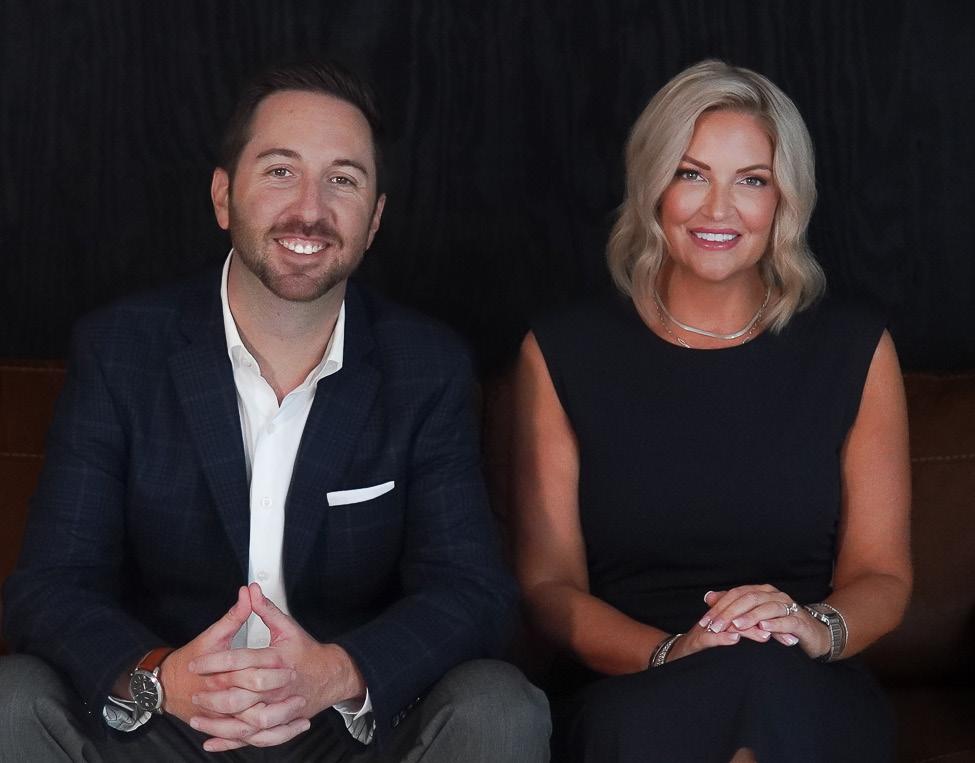
Chunn and Shine founded Arkansas Talent Group to start a client-driven firm that encourages collaboration above commission checks. Officially opening in 2024, ATG specializes in accounting, finances and human resources and is committed to offering a consultative approach to its business partners.
Shine and Chunn had previously worked together, but with a volume-driven approach, the two often found themselves competing for candidates and placements. Now, without volume in the equation, the duo has committed themselves to being true 50-50 partners. With the new model, Shine and Chunn can focus on their clients’ needs and finding the best placements they can.
“When we place the right candidate for the right position, we both win. It’s a huge success to see [our clients] find the right fit and have options,” Shine said. “We wanted to do things differently because before, it was all about volume. Creating our own company has been awesome because it’s not about volume; it’s about relationships.”
As an Arkansas-based firm, ATG is committed to providing the best in-state insights for candidates and businesses. Shine said she and Chunn have both been top producers in the nation in
Arkansas, making them experts in job placement and recruiting in the Natural State.
“‘Relationships over transactions’ has kind of been our motto that we like to say. We’re doing things differently, and in building something that’s Arkansas-based, we can focus specifically on our candidates and clients in the state,” Chunn said.
According to Shine, the partnership allows them to work together well, accentuating each other’s strengths. That is partly due to their entrepreneurship operating system where she serves as the integrator and Chunn as the visionary. Shine’s comfort zones are business operations, scheduling, marketing and daily tasks, while Chunn handles finance, accounting, ideas and client interactions.
“I think that it is really important for all entrepreneurs and partners to find their integrator and their visionary,” Shine said. “That is the advantage that Chris and I have. We get along so well, and we’re on the same page, making this the perfect match for business.”
Chunn said the transition to a more relationship-based approach has been a win-win for everyone.
“We wanted to be able to create deeper, more meaningful relationships with our clients and be able to do the right thing for everyone. With that, we’ve extended a lot of our guarantees to make things easier for our clients,” Chunn said.
ATG extended its physical guarantee for placements to 120 days, so in the event of a candidate not working out, clients can have the position refilled for free. ATG also extended payment terms to create a different approach to Arkansas-based recruitment.
With the ability to be more flexible and selective, Shine said ATG can be more particular in placements and clients they represent. It boosts the company’s reputation, which is important in the Arkansas job market, and benefits clients.
“We are now able to really take our time, and we love what we do,” Shine said.
Shine and Chunn have more than 25 years of combined experience working in Arkansas, which has allowed them to gain invaluable experience in the marketplace. While online job boards might
give estimates on salary, experience and skills needed, the duo can provide real data to clients, helping them create an accurate job description to fill their needs.
“We’re able to streamline the hiring process for our clients from beginning to end,” Chunn said. “We’re going to gather all the information that we want to know about your company, not just a job description and a salary range. We want to know your [company] culture.”
Chunn and Shine strive to connect more deeply with their clients, visiting them in person and creating a true matchmaking
experience. Every candidate is subject to a thorough screening process, Chunn said, and there is a good chance he or Shine has already interviewed a candidate and checked references when a name is submitted. The added benefit enables companies to feel confident that the candidates are rehireable and fully qualified for the position they are seeking.
“Working with a recruiter like us taps companies into a hidden job market,” Shine said. “I would say 90 percent of our candidates are in our network through referrals or people we have worked with, placed or known.”
Capitol Glass Co. was established in 1950, making it the oldest locally owned and operated glass company in the Little Rock metropolitan area. With more than six decades of delivering quality glass work, the establishment is also regarded as one of the most respected small businesses in the area.
Jack Grimes helped start the business and served as owner until he retired in 1990. Glenn Grimes, Jack’s son, is the current owner and has been in the glass business most of his life.
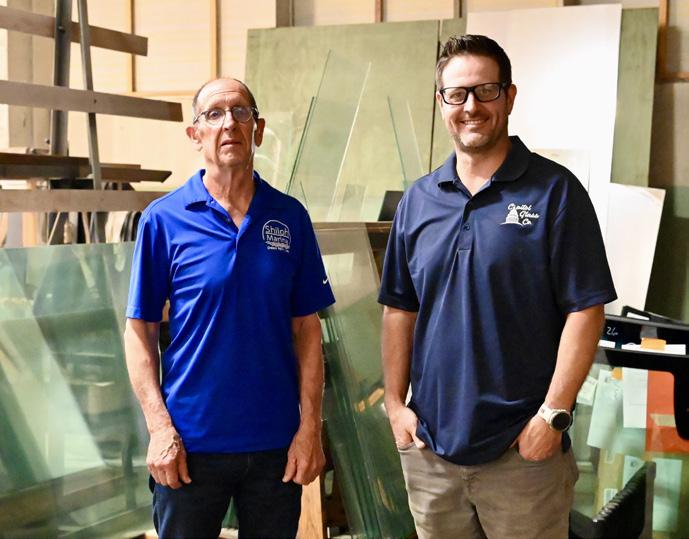
After graduating from high school on a Friday night in 1972, Glenn began working for Capitol Glass full time the following Monday morning. Glenn’s son, Aaron, grew up watching his father run the business with values of integrity and hard work.
Capitol Glass offers automotive and custom glass services, including auto glass replacement, door lock and window repair, inshop service, mobile service, pickup and delivery, rock-chip repair, sunroof replacement, and window glass replacement.
Glenn and Aaron work together to ensure guests receive topnotch service from their employees, who have 200 years worth of combined experience. This expertise contributes to Capitol Glass delivering the best customer service available in the market.
Before working with his father full time with Capitol Glass, Aaron attended pharmacy school and later worked as a pharmacist for five years. He returned to Capitol Glass after the COVID-19 pandemic as his father began to branch out into the boating industry.
With Glenn’s leadership style focused more on day-to-day management and Aaron’s being more focused on the long-term success of the business, the two complement each other well. Although they do not always work in the same physical location, they collaborate closely so the businesses run smoothly.
“It’s a small business and like I’ve always said, in a small business, you have to be the first to work and the last to leave and get paid,” Glenn said. “It’s a lot of hard work and quality customer service.”
Glenn also owns Shiloh Marina and Lacey’s Boating Center at Greers Ferry Lake, where he spent intentional time with his family often. Aaron remembered growing up on the water and learning how to water-ski and wakeboard, activities he still enjoys to this day.
Capitol Glass will celebrate its 75th anniversary next year, and Glenn and Aaron maintain the goal of continuing the company’s legacy.
“Long term, we hope to keep Capitol Glass going for another generation or two. I have a son that’s 4 years old, and we’ve got a ways to go before he’s ready to start doing anything, but if he’s interested in it, the business will be here for him to get into,” Aaron said.
Aaron also said he looks forward to seeing the company’s continued growth in the area.
“At this point, we’re about the only locally owned glass shop left that has a shop that can provide complete services for any type of vehicle,” Aaron said. “We’re not trying to expand outside of central Arkansas, but we hope to gain as much market share here as we can.”
In an industry that is run primarily by large chains, both Aaron and Glenn said customers do not go wrong by being serviced by a locally owned company. When using Capitol Glass, they said, customers receive personable service from the time they call to book appointments to the time they pick up their vehicles.
“When you call here, you’re actually talking to a person that works here. In today’s glass industry, it’s a lot harder to match parts correctly because of the different features,” Aaron said.
He added that because of the different features in the glass, there can be 10 different windshields that fit one car based on the particular model of the vehicle.
“Instead of relying on an automated phone system, customers will reach representatives that can figure out exactly what features your vehicle has in it and can ensure we have the correct part,” Aaron said.
With what they consider to be the best quality and the best installers, Glenn and Aaron said they are proud to be able to stand by the craftsmanship their company offers.
Casey Flippo and Sean Clarkson have known each other since attending college at the University of Arkansas in Fayetteville. A friendship that budded in the Kappa Sigma house has led to a 15-year relationship between the two, who have become great friends and business partners.
After graduating, Clarkson attended law school and promptly entered into the corporate sector, and Flippo found himself in Houston with his now-wife and working in real estate. The duo eventually came back together after Flippo made the decision to become an entrepreneur.
“Casey was the first one that actually made the leap into entrepreneurship, and he started a hemp company in 2018,” Clarkson said. “I had helped him with that a bit but he was the one that created a business from scratch.”
Dark Horse Medicinals does not cultivate the flower, but it does make every other manufactured good including vape cartridges, concentrates, edibles, chocolates, gummies and other wellness products and topicals.
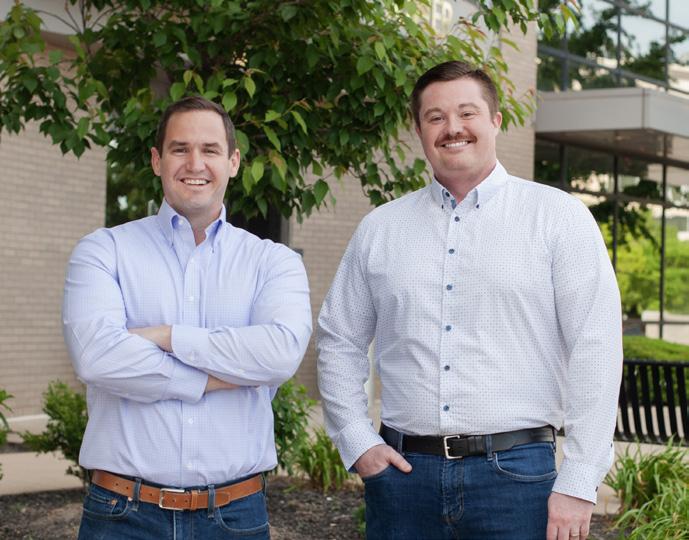
The hemp company, Natvana, was the basis for what has become Dark Horse Medicinals in Little Rock. By making the transition from the hemp industry to the regulated medical marijuana sector, Dark Horse Medicinals became the first operational processor in the Natural State. As co-founders, Flippo and Clarkson took the business to new heights after becoming operational in Arkansas at the beginning of 2022.
Flippo leads the organization as CEO and Clarkson serves as chief strategy officer. Within their working dynamic, Flippo drives the operations and sales for the business, and Clarkson handles the administrative side of the company in the areas of legal, finance and compliance.
“I think that in Sean and I’s transition from friends into business partners, we have seen success because of mutual respect,” Flippo said. “From a traditional standpoint, Sean’s skill sets and attributes play an important role in what we do. I could not do what I do without him and that mutual respect of knowing our roles and playing into our strong suits. I don’t try to inject myself into his segment of the business, and he doesn’t try to inject himself into my segment of the business.”
In a sector of industry that requires a symbiotic relationship, both Flippo and Clarkson expressed gratitude to each other for their efforts.
“Casey and I both want to build a business that is larger than either myself or Casey. Having the yin and yang that we do is what makes our organization special,” Clarkson said.
Arkansas was Dark Horse Medicinal’s first step into the medical marijuana business and since then, the company has acquired another infused products manufacturer in Missouri, as well as a dispensary in Pine Bluff. The business is also fully licensed in Mississippi where Clarkson said they will be fully operational by the end of the year.
“We have some expansion plans on the retail side and some other targets in states that we would like to be at least licensed in, in the next year,” Clarkson said. “The overarching goal is for us to round out our corporate team with people that we can trust to oversee a growing enterprise.”
In a relatively short amount of time, Dark Horse Medicinals has seen tremendous growth, which both cofounders are proud of. Currently, Dark Horse employs 60 individuals and is working to grow to 75 employees within its expansion markets with eyes on having more than 100 employees by the end of the year.
“Our company was not in existence as Dark Horse just three short years ago, and in that time, the lessons learned, the culture created, and the fast-paced growth and aspirations have molded us into a machine that I think every person that works here is proud of,” Flippo said.
At the center of it all, Clarkson and Flippo are passionate about the good that the products they created are doing for patients. While Flippo recognizes the negative connotation associated with cannabis reaches throughout certain areas in the United States, he said he hopes those judgements are coming to a close.
“Even with the success that it’s had and the scrutiny and the overreaching regulations, there are operators like us that truly stand for something, continuing to press on to help people every day,” Flippo said. “That’s what we want to stand for and behind. That’s what motivates Sean and I every single day. We are here to not only help the patients but we take a lot of pride in the company we’ve built, the people that we support and the business that continues to flourish and grow along with us.”
Chris Chunn and Stephanie Shine, co-founders of Arkansas Talent Group, have over 25 years of combined experience in recruiting, working with each other for 10 years prior to branching out on their own. Leading their industry with intentional focus on client relationships, Shine and Chunn are committed to connecting top talent with exceptional companies throughout Arkansas. With Shine’s strengths falling in business integration and Chunn’s in envisioning the bigger picture, the duo has built their business on the foundation of the following core values: excellence, passion, partnership, integrity and communication.

What lessons have you learned from working together?
We learned that finding the right partner is the key to success. We have made every decision as true partners and have leaned on each other quite a bit, both personally and professionally. We quit our corporate jobs at the same time and started our new company on a leap of faith, believing in and trusting one another.
In what ways are you involved in the community outside of work?
In 2023, we started The Arkansas Talent Podcast to help business owners and candidates in the accounting, finance and human resource fields learn and grow. This has allowed us to help ourselves and others learn more about career choices in these fields, how others have found success and what challenges leaders in these fields face. We also discuss trending topics like burnout, remote work, career search tips and general economy and job market updates. It was important to us to be involved in the industry and to be a place for knowledge sharing.
What is the secret to collaboration and compromise in business and in life?
The secret is built on mutual trust and respect. This means listening to one another, providing open and honest feedback, and being openminded to each other’s ideas.
What is the best thing about being part of a “Dynamic Duo”?
We are living out our dream of building our own recruitment firm here in Arkansas. We have already found incredible success, and we look forward to our future and what’s to come. We have been told many times by friends, mentors and partners what a great partnership we have made, which is both humbling and encouraging as we continue to build our business and legacy.
Is there anything else readers should know?
Chris has two Stephanie Michelle’s in his life: his wife of six years, Stephanie Michelle Chunn, with whom he has three young children, and his business partner, Stephanie Michelle Shine, who has been married to John Shine for almost 13 years with two children. Chris gets asked almost daily by candidates or clients how Stephanie is doing, and he has to ask, “Which one?” It has become a running joke between our families.
Stephen and Beau Browning hail from Hot Springs, but the pair can more often be found on competitive fishing tours around the country. Since turning pro in 1996, Stephen has competed in more than 250 professional level events and qualified for 10 Bassmaster Classics. At just 22 years old, Beau competes at the semi pro level and is well on his way to joining the elite ranks alongside his father — a relative rarity in the world of pro fishing. While the duo cannot swap too many specifics during their respective competitions, they continue to be each other’s biggest supporters. Through good days, bad days, breakthroughs and breakdowns, they agreed, one of the most important aspects of their sport — and life in general — is to take it one day at a time.
How did you get into this sport?
Stephen: I grew up in an environment where we used fishing as a way to get out of the house. Beau was born into that and raised on the lake. I remember distinctly, when he was probably 3, I was on the water testing out some lines. I looked over on the bank, and Beau was holding a stick with moss attached to it and had it in the water, just kind of emulating what I was doing.
How do your working styles complement each other?
Beau: My dad is impulsive in some ways. My mom is the one that says, “Wait, we’re not going to do it. Let me research it first.” I think I’m a good mixture between both.

What lessons have you learned from working in the same sport?
Stephen: In fishing, everything’s out of our control. The biggest lesson I tried to teach Beau was to look ahead and know that just like in any job, there are going to be good days and bad days. It doesn’t change just because we fish for a living. One thing that I’ve learned from him is to get more involved and embrace the technology.
What is the secret to collaboration and compromise in sports and in life?
Beau: Love. We are all a tight family, and we are all in this together. My dad and my mom have not only been my parents, but my coaches and my biggest cheerleaders.
What is your strategy for keeping business and personal relationships separate?
Stephen: Without Tammy, my wife, we couldn’t do what we do. She does all the prep work, getting our clothes ready, getting our food ready, making sure we have everything to get out on the road. We don’t necessarily have a big difference in family life versus fishing because we raised Beau on the water. We love the water, we love fishing, and it really takes a team effort.
What is the best thing about being part of Team Browning?
Beau: In real life, it’s tough and ugly, but at the end of the day, you have your sponsors and your fans. My dad has shown me that it’s possible, and if it’s possible for him, I know it’s possible for me. At any time, if I need my mom or my dad, they’re 100 percent there, and I try to be there for them, as well.
FATHER AND SON, BUSINESS PARTNERS, CAPITOL GLASS CO, SHILOH MARINA, LACEY’S BOATING CENTER
Glenn and Aaron Grimes are not only father and son, but also business partners. Glenn’s father, Jack, cofounded Capitol Glass Co. in 1950, and Glenn took over upon his retirement in 1990. Aaron is now the third generation of the Grimes family to own the Little Rock institution. Over seven decades in, Capitol Glass is the oldest locally owned and -operated glass company in the area, and both Glenn and Aaron are committed to continuing its legacy. The Grimes also own and operate Shiloh Marina and Lacey’s Boating Center, both of which are located on Greers Ferry Lake.
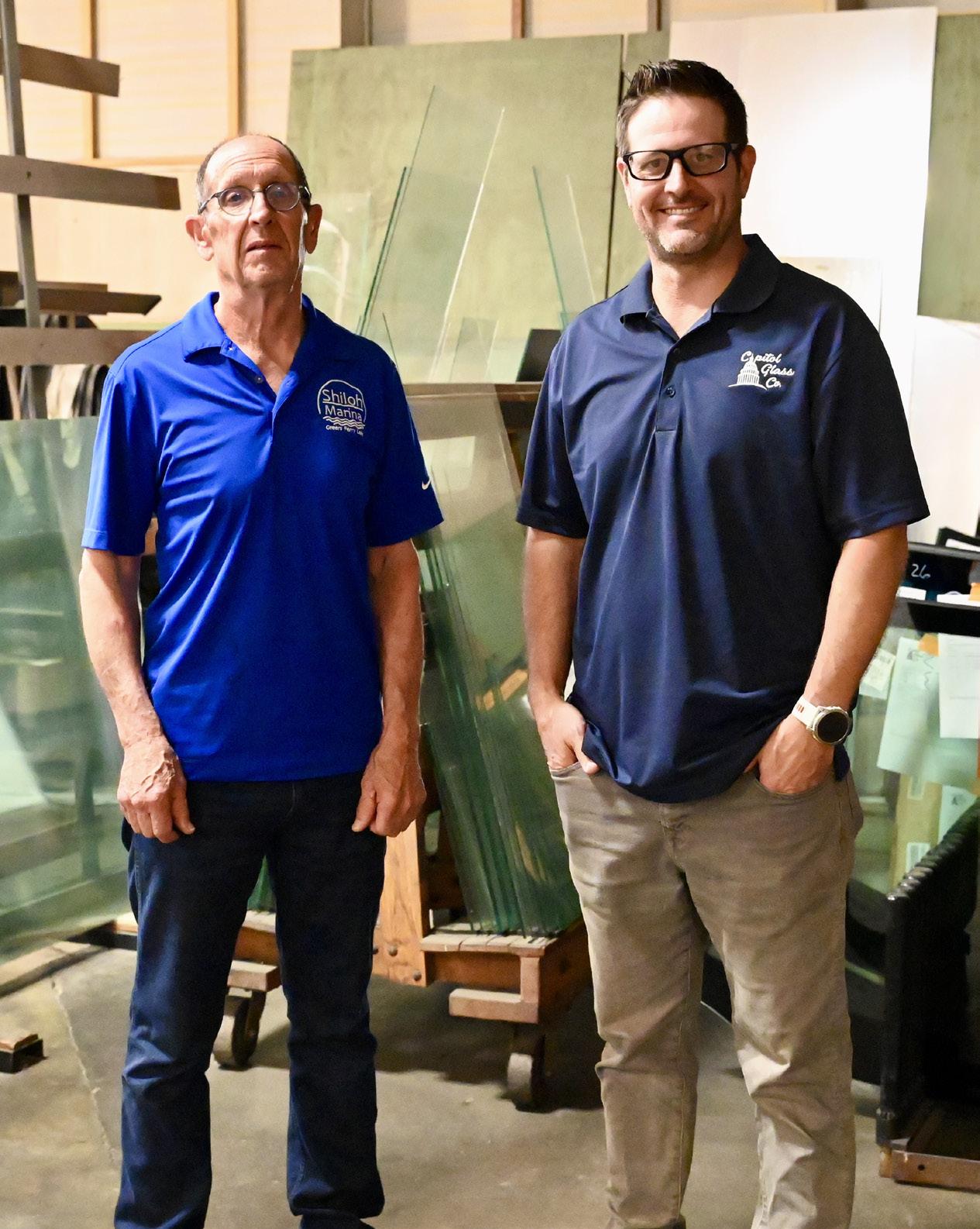
How do your working styles complement each other?
Aaron: Glenn is much more hands-on. He’s the hardest working, most detail-oriented person. I’m more on the big picture, long-term ideas side. When I started running Capitol Glass day to day, he started focusing most of his time up at Greers Ferry. We’re not in the same office as much, but we talk daily.
In what ways are you involved in the community outside of work?
Glenn has been heavily involved with Shriners organization. In the 1980s, he was part of the Flying Fez, which was a group of pilots that used their own planes to fly injured children down to the Shriners Hospital in Galveston, Texas. He was the recorder for the Shriners for the state of Arkansas from 2010 to 2016, and then he’s still involved with different aspects of it.
What is the secret to collaboration and compromise in business and in life?
Listen, be open-minded, and don’t totally dismiss the other person’s ideas just because you’ve never done it that way.
What is the best thing about working as part of a “Dynamic Duo”?
Getting to pass the legacy on to the next generation. Glenn started working full-time at Capitol Glass the Monday morning after he graduated high school and worked here full time for 50 years. He’s the one who built this place into what it is now. I’ve got a 4-year-old son, so hopefully we can keep it going long enough, and if he’s interested, he can carry on to the fourth generation.
What is your strategy for keeping business and personal relationships separate?
Having a lot of recreation in common and some of our businesses being in the recreation industry helps. Glenn is almost 70, and he still water skis and snow skis. He still rides dirt bikes, mountain bikes and road bikes. With me being an only child, too, it’s always been a close friend type of relationship. We’re trying to get my son into all that, and we have a lot of fun.
Is there anything else readers should know?
Glenn’s father, my grandfather, will be 99 in September and is still pretty healthy. It’s nice being able to go all the way back to the founder of the place. He’s still around and still sees the growth that’s happened, so that’s awesome.
Casey Flippo and Sean Clarkson first met in the Kappa Sigma fraternity house at the University of Arkansas in Fayetteville. In being great friends, Flippo and Clarkson crossed the threshold by becoming great business partners. As co-founders of Dark Horse Medicinals, Arkansas’ first cannabis processor, Flippo has the title of CEO, and Clarkson serves as chief strategy officer. Together, this duo has been able to take their team to new heights with the consumer in mind above all else.

How do your working styles complement each other?
Casey is the gas, and Sean is the brakes of the business. Casey’s mindset is focused on operational and revenue growth, while Sean spends his time working to reduce both legal and financial risk. We have the self-awareness to understand that neither extreme is the best way to accomplish those goals and it will require a balance of both styles to be successful.
What lessons have you learned from working together?
We learn new lessons every day. For example, disagreement is natural, but you need to maintain a level of respect. We have healthy disagreements on a regular basis. At the end of the day, we have respect for each other’s working style and thought process. If you lose that respect, the business partnership can’t move forward. Also, you can’t run a business by yourself. The soloentrepreneur-led company is not a reality for the majority of businesses and definitely not for ours.
What is your strategy for keeping business and your friendship with each other separate?
If you don’t pay attention, business partnerships can end friendships. The transition from friends to business partners is
difficult to navigate. Conversations quickly veer towards business updates. We have to be cognizant of this and take a break from the business-only relationship every once in a while. Frankly, it is still a work in progress but one that we are aware of and are working toward balancing.
What is the secret to collaboration and compromise in business and in life?
Collaboration and compromise are all about filling in the gaps. Collaboration requires self-awareness about your and your partner’s strengths and limitations while doing what you can to supplement those. Compromise comes when you can address each other’s biggest pain points while still accomplishing the mutual goal.
What is the best thing about working as part of a “Dynamic Duo”?
The trust that is built over time. At this point, we both know the stance the other would take on any issue, even without having to communicate. This allows us to move our respective parts of the business forward with full confidence that the other is doing the same. That level of trust is invaluable when growing quickly.
Kristen and Jon Kennon are the owners of iRealty Arkansas and consider themselves serial entrepreneurs. Their firm, iRealty Arkansas, is 11 years old and has sold more than $2 billion in real estate. It is a part of Leading Real Estate Companies of the World because of its high market share in central Arkansas and is the No. 1 independent real estate company in the region. Jon and Kristen own single family rentals, shortterm rentals and commercial retail centers and they are currently working on a development in southwest Little Rock. They teach their agents about building wealth through real estate and enjoy helping others invest in real estate.
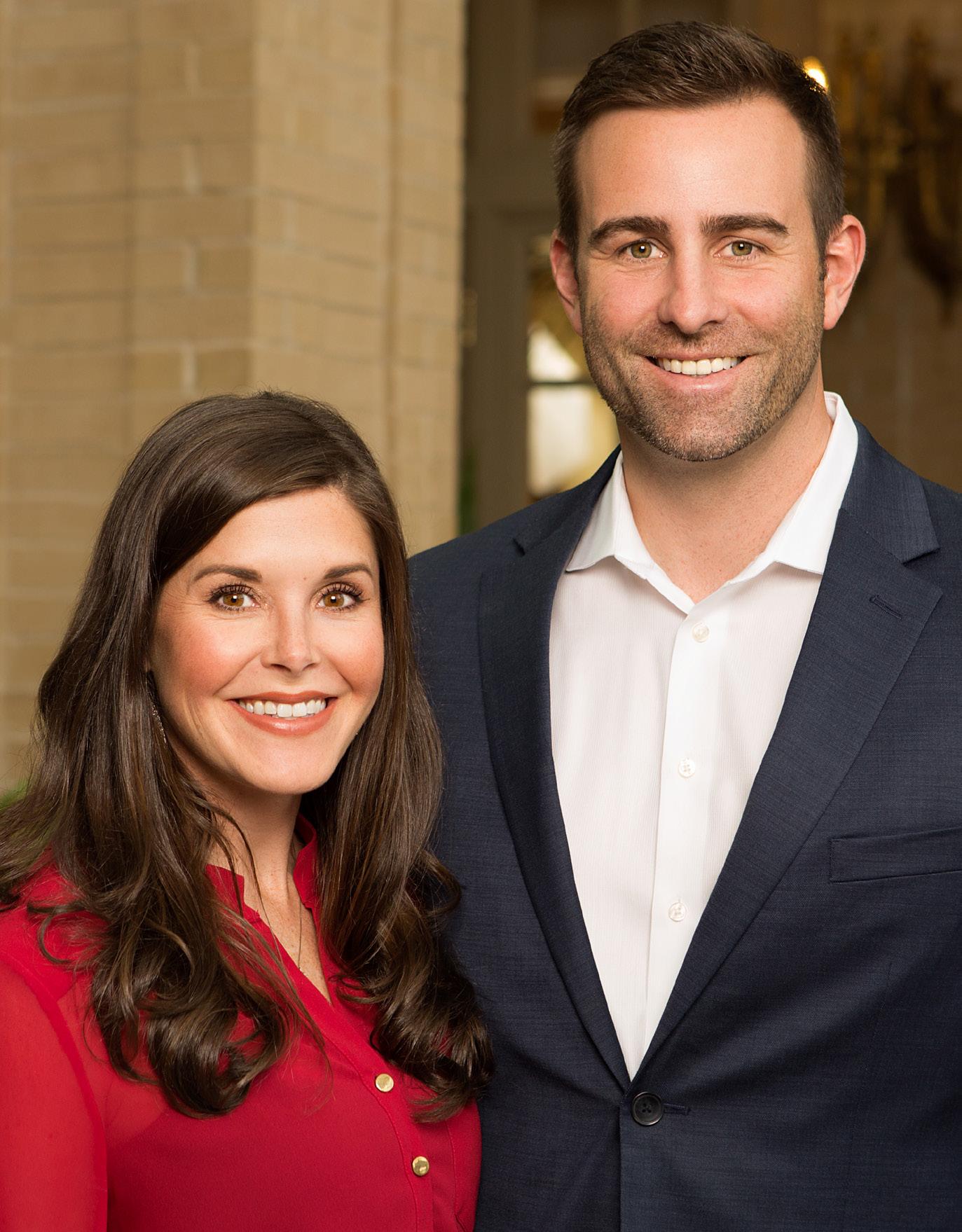
How long have you been together? 14 years.
How do your working styles complement each other?
They are similar in that we are both big-picture, visionary-type thinkers, so we have to be intentional about surrounding ourselves with people that are talented in complementary areas such as operations, implementation and tasks that are more tedious. Kristen has taught me a lot when it comes to efficiency and delegation, while I compliment her with patience and long-term future thinking.
What lessons have you learned from working together?
Play off each other’s strengths, and if something is bothering one of us, we don’t let it fester. We will text,
email or write a note with the issue, and that allows time for the other to process the issue internally and have a face-to-face discussion when they are ready.
What is the best thing about working as part of a “Dynamic Duo”? We both are working for the same outcome. That allows us to divide and conquer tasks and responsibilities, which ultimately allows us to spend a lot of time with our boys that I don’t think most couples get. Our kids are 8 and 11, and we will never get these years of their lives back, so being present and involved is a huge priority.
What is your strategy for keeping business and your relationship with each other separate?
Keeping a strict date night schedule. I think anyone who knows us is aware of our weekly Wednesday night date night. We try very hard to minimize any work talk and focus on each other. We are madly in love with each other and work hard to stay that way.
How did you meet?
We met in our first semester of college at the University of Arkansas in Fayetteville in 1988, and we have been together for 36 years.
How did you get into your respective careers?
After graduating from college, we moved to Iowa for Chris to attend chiropractic school. We moved back to Little Rock at the end of 1995 so Chris could follow in the family footsteps and work with his father at Blackmon Chiropractic clinic, as well as to raise our two daughters, Bailey and Marley.
In what ways are you involved in the community? We have been involved at Fellowship Bible Church, leading D groups and serving in the
youth and women’s ministries. Chris is on the board of Catholic High School, serves on the executive committee for the St. Jude Golf Tournament and is active in promoting the Rattlesnake Ridge Natural Area. He also represents his profession by working with Arkansas Blue Cross and Blue Shield.
What else should readers know?

Working alongside his parents and each other has been a blessing. We have really enjoyed building relationships with our employees and patients. When we are not working, we love to travel, sail and spend time at the lake with our family and friends.
How did you meet?
We met through a mutual friend who set us up on a blind date during our time as students at Harding. I proposed to Lisa in December 1986, right around Christmastime. Lisa thought she was getting a TV, but instead, I surprised her with a ring and asked her if she would marry Santa Claus. We tied the knot on Nov. 28, 1987, and have been a “dynamic duo” ever since.
How do your working styles complement each other?
I think we have learned to complement each other through our diverse gifts and
perspectives. If we can channel those differences in the same direction, great outcomes emerge. All organizations need multiple narrators who tell the story from a different frame of reference. Lisa’s extroverted nature brings an extra dose of warmth and spontaneity to our work together. Her love for people and ability to engage in all of the campus and community events create an atmosphere of inclusivity and togetherness that is vital to our campus. I tend to be introverted by nature but I thrive creating opportunities for deeper, more contemplative thought. Together, we strive to make everyone feel valued and understood, fostering a sense of belonging for the whole community.
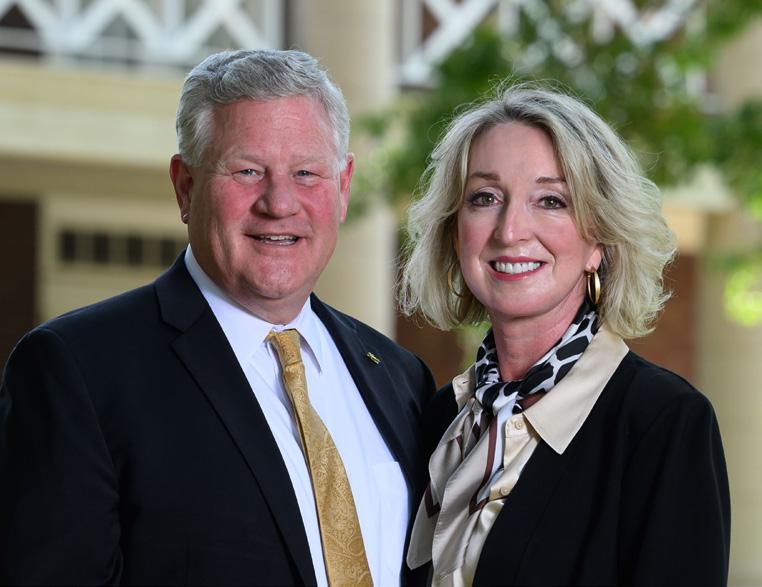
What is the best thing about working as part of a “Dynamic Duo”?
Being able to do life together is a tremendous blessing. It brings a depth of understanding, trust and shared experiences that enrich every aspect of our lives, including our work. We are not just husband and wife; we are partners in a journey to inspire and empower others to reach their full potential. This shared mission strengthens our bond and makes our work even more rewarding.
After nearly three decades at Spa City’s top tourism job, Visit Hot Springs CEO Steve Arrison can say with certainty that things have changed “quite a bit” since he first stepped into the role.
“When I started, Magic Springs had not reopened,” he said. “Garvan Woodland Gardens was just a dream, Oaklawn did not have a casino or a hotel, our convention center had just expanded, and we were just getting into the meetings business.”
These days, Hot Springs offers something for just about every kind of visitor, giving Arrison and the team at Visit Hot Springs plenty of plates to keep spinning.
“Every day is different,” he said. “When you are dealing with marketing, convention center operations, special events, employee issues, the operation of a trail system and a ballpark complex, you tend to jump from one issue to another all the time. You definitely have to know how to multitask.”
Arrison is no stranger to the fast pace of hospitality work because he grew up in the industry. His father worked for Holiday Inn corporate, and his own first job in high school was in a hotel. He returned to hotel work every summer while in college, eventually becoming a general manager before shifting gears into the destination management and convention center business.
“I have had several mentors, but my father had the biggest impact on my career,” Arrison said. “I see a lot of him in my management style and the way I operate our businesses. He was the perfect role model.”
While his hands-on experience has proved invaluable, Arrison does not discount the importance of education, either. When it comes to certain aspects of the business, such as the numbers and figures that keep it humming along, there is no substitute for good old-fashioned study.
“Work experience accounts for a lot, but when it comes down to the principles of accounting, you have to take the classes,” Arrison said. “If you do not understand the numbers and where they come from, you are going to have an uphill battle as you move forward in business.”
After leaving Holiday Inn, Arrison was tapped to lead the Pine Bluff Convention Center, which he did with great success before arriving in Hot Springs. There, he has overseen a renaissance fit
for one of the state’s most unique cities.
“Our strategy has changed as we now have more reasons for visitors to choose Hot Springs when they make their travel plans,” he said. “Obviously, the digital age has affected the way we market. We now can reach a wider audience for less money than ever before.”
By Mak Millard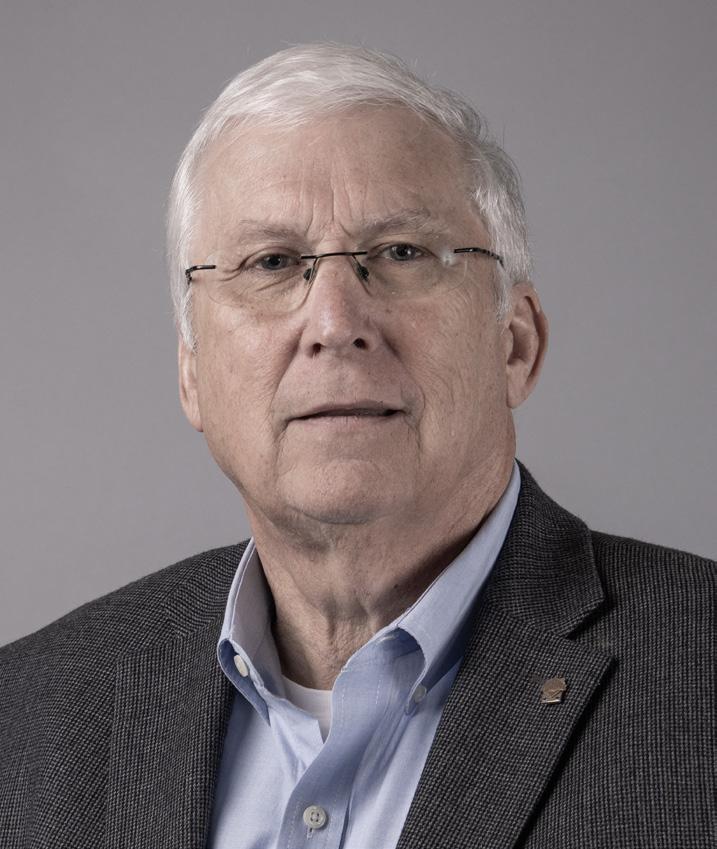
As the marketing landscape continues to change and Arrison looks to the proliferation of artificial intelligence as one potential shakeup, he and his team are focused on improving the city’s existing product through hotel and business renovations while adding new attractions, restaurants and hotels. Still, there are a few things he would like to check off his list before handing over the keys to the castle.
“Before I retire, I would like to see the establishment of a regional park, a vote to allow beer and wine sales on Sunday, and the completion of the Northwoods trail system with the opening of its lakes to non-motorized watercrafts,” he said.
Coming off the pandemic slump that affected tourism organizations across the board, Hot Springs has welcomed visitors back in a big way. That effort has been helped by the level of cohesion between different tourism entities in the city, and Arrison commended them for being “one voice on all things tourism in our community.” With convention center usage back on the rise and a full slate of events throughout the year, Arrison is optimistic about the city keeping its place as the top tourism destination in Arkansas.
“The most rewarding part of the job is putting a workforce together that knows our customers are our first concern and takes great care of them while they are in Hot Springs,” he said.
Plenty of people have a passing interest in economics. Some of those have a real talent for it. Fewer still are those people who have the wherewithal it takes to combine that knack for finances with an ingrained desire to help others. Marshall Butler, director of commercial services at financial consulting firm Pinnacle Advisors, is one of those special few.
“I’ve always been fascinated by how financial systems work and how they impact individuals and businesses as a whole,” Butler said. “The opportunity to make a positive difference in people’s lives by guiding them toward financial security and success is what truly drew me in.”
Butler’s education provided a solid theoretical foundation for his work, and a Master of Business Administration and accreditations in portfolio and asset management are certainly useful things to have on one’s resume. Still, there is no substitute for practical experience, and Butler credited his time spent working directly with clients and navigating real-world scenarios with truly honing his expertise.
“My journey to where I am today has been shaped by nurturing strong interpersonal relationships and taking calculated risks on talented individuals,” he said. “I’ve surrounded myself with top-notch professionals in the industry, which has encouraged a network of excellence that has propelled me forward.”
In his role at Pinnacle Advisors, Butler oversees various aspects of the company’s commercial operations and services. Those can run the gamut from strategic planning and business development to financial management, data analysis and, of course, ever-important client relationships.
His wide-ranging responsibilities challenge the common misconception that advising solely revolves around investment and business management.
“There has been a growing acknowledgment of the significance of comprehensive financial planning extending beyond mere investment management,” Butler said. “Financial advisors now increasingly offer guidance covering various aspects such as retirement planning, tax optimization, estate planning, insurance coverage and more, all tailored to address each client’s unique goals and circumstances.”
As demographics shift and new generations accumulate wealth of their own, the onus has been on the financial services industry to adapt its styles and communication strategies.
“They are catering to the preferences of tech-savvy young-
er clients who prioritize transparency and seek personalized, digital-first experiences,” Butler said. “This adaptation ensures that advisors effectively meet the evolving needs and expectations of their clientele.”
Despite the constantly shifting landscape — or perhaps because of it — Butler’s advising approach remains a conservative one. This kind of guidance empowers businesses to achieve longterm success, he said, especially in light of present uncertainty and market fluctuations.
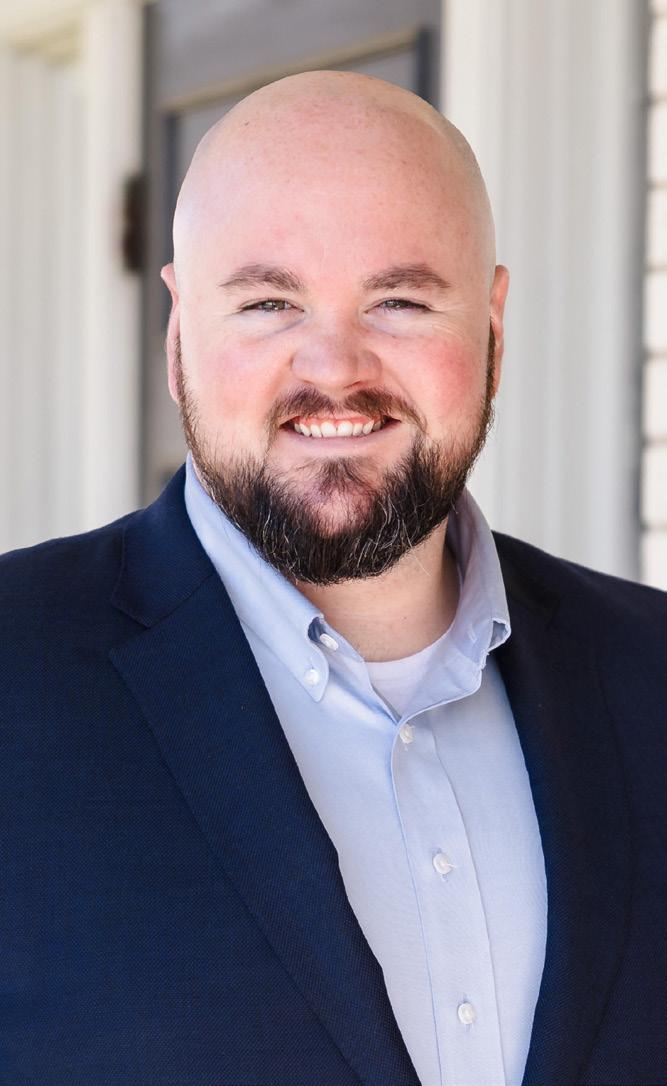
“It’s crucial to prioritize stability and safeguard your assets,” Butler said. “Patience, discipline and a commitment to preserving capital while pursuing gradual, sustainable growth are fundamental principles of conservative financial management. A conservative approach to business planning provides resilience during economic downturns and fosters confidence in achieving enduring financial goals.”
There is another unique element Butler brings to his work. As an avid Dungeons & Dragons fan, he knows the importance of teamwork, carefully implemented strategies and flexibility in the face of chaos, whether in the world of tabletop games or in an oftentimes unpredictable reality. All games aside, he takes his responsibility to the firm’s clientele seriously and relishes the chance to help businesses succeed.
“Overall, the reality of being a financial advisor is that we serve as trusted partners and educators, helping clients navigate complex financial landscapes, achieve their goals and build long-term financial security,” he said. “It’s about much more than just managing capital. It’s about providing holistic financial guidance and support tailored to each client’s unique needs and aspirations.”
Mary Chatelain founded Pinnacle Hearing in Little Rock in 2013 with the purpose of delivering hearing health care in Arkansas. While growing up in Magnolia, Chatelain has a deep passion for creating accessible medical care in rural areas, she said, and as the child of entrepreneurs, she had always dreamt of owning her own practice.
“My parents had their own roofing business when I was growing up. It’s different from what I do, but I saw my dad’s work ethic, and I saw that the business ran on creativity,” Chatelain said. “It was really cool, and even though roofing and hearing aids are completely different, they both lie in the call to serve others.”
Chatelain graduated from Louisiana Tech University and was part of the first class in Louisiana to earn a doctoral degree in audiology. Chatelain said she was drawn to the field because of its relative newness and inarguable need.
“I wanted to be in an industry that was growing and changing, and I see how these things lead to creativity in the field,” Chatelain said.
By Sarah Colemanthings,” Chatelain said. “One thing that’s really important to me is that every person that comes to my office feels seen. I want them to feel appreciated.”
In a world where health care is becoming a more abbreviated and express form of care, Chatelain said she is aware that doctors appointments can be a burden for patients. This model can deter people from coming in when they need to, she said, adding that she continues to be committed to performing quality health care that allows people to feel cared for and unrushed.

At Pinnacle Hearing, Chatelain said she is excited about the clinic’s ability to implement telehealth via teleradiology.
“We can actually do remote hearing aid programming now. Say I have a patient that drives two hours to see me from a rural area. If they can’t come back immediately, we are able to send programming to their hearing aids remotely through their telephone,” Chatelain said.
Hearing loss remains one of the largest reasons people become isolated, and according to Chatelain, it is often invisible to those around the individuals who are suffering.
“You don’t see it, and that leads to depression and other
“I want people to know that we’re going to help patients however we can. A lot of times, that will be prescription hearing aids or counseling, but it’s also with providing resources to other things that might help,” Chatelain said. At the center of a desire to serve and care for others well, Chatelain remains focused on impacting and making the quality of life better for those in Little Rock, as well as those residing in rural areas.
“I think that we are just starting to see the correlation and the need for people to come in for hearing evaluations sooner. Hearing loss leads to being a higher fall risk and potential cognitive delays,” Chatelain said. “We are encouraging people to get audiology services sooner rather than later.”
Although hearing loss is typically associated with old age, Chatelain said that she has seen patients of all ages, including those in their 20s, experience hearing loss. The impact of not being able to hear affects everyone regardless, she said.
“I’m able to help people with what they like, where they’re at, with what they have,” she said. “If it makes their life even 20 percent better or 50 percent better, we are keeping them in community and connected with other people.”
In an alternate universe, Conway native Tammie Davis fulfilled her desire to help people by earning acceptance to and graduating from the University of Arkansas for Medical Sciences in Little Rock and becoming a successful nurse.
That is just the path she was on before something — call it the butterfly effect — altered her course. Banking ultimately found and “chose” Davis, and the once would-be nurse is proving her course change was the right one as an executive for Cadence Bank in Little Rock.
“I was fortunate to be in a community with a great school system and teachers who truly cared about helping me reach my full potential,” she said. “When it came time for college and making career decisions, I leaned into my desire to help people and nursing felt like a good choice. I was accepted at the [UAMS] College of Nursing but needed to defer while I relocated to Little Rock.”
The deferment was supposed to be short term, but a funny thing happened after Davis took a job as a receptionist at Worthen Bank, now Bank of America. She loved what she did enough to reconsider her career path.
"I took a permanent position — which offered tuition assistance — and pursued an accounting degree at the University of Arkansas at Little Rock.”
Davis worked in accounting in Little Rock and New York for several years after passing the certified public accountant exam, but banking would not let her go. She was asked to rejoin the team at Worthen as a commercial lender.
“I jumped at the chance. It was the perfect fit for me,” she said. “While I like number crunching, analysis and problem-solving, what I cherish most is building relationships. Banking lets me do that while helping individuals and businesses achieve their financial goals, which, in turn, helps build stronger communities. It’s a complete circle.”
Banking became an even better fit in 2021 when her employer, BancorpSouth — based in Tupelo, Mississippi, and with multiple locations in Arkansas — merged with Cadence Bank of Houston and adopted the latter’s name. The new bank became the sixthlargest in a nine-state footprint and had $48 billion in assets.
Recently promoted to division president for mid-south Arkansas, Davis oversees an area that includes the Little Rock market plus a “rich heritage of smaller communities” in south Arkansas — 15 branches in all.
“This diversity has enabled me to better understand that con-
sideration must be given to each market because what works in one place may not work in another,” she said. “It is so important to listen to your teammates on the frontline and understand the needs of your customers to find positive outcomes. I now have the privilege of sharing lessons and passing along encouragement and helpful guidance that I received through the years.”
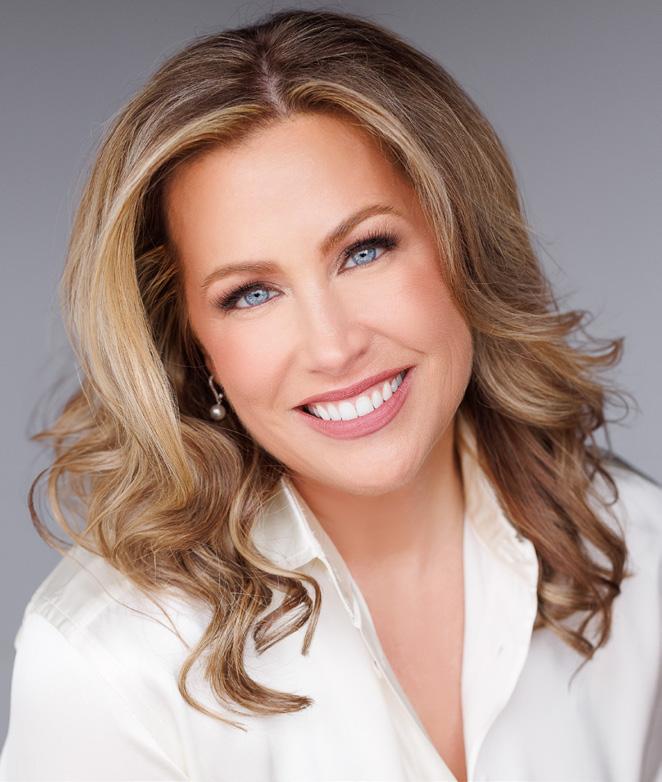
Davis is a seemingly tireless volunteer for local nonprofits. A member and former president of Junior League of Little Rock, she serves as a volunteer and fundraiser for the Cystic Fibrosis Foundation, United Way and the American Heart Association. Davis and her husband, Mark, are the co-chairs for this year’s American Heart Association Central Arkansas Heart Ball.
For Davis, it has always been important that her bank shares her community values. Last year, Cadence provided $6.5 million in community-reinvestment-eligible grants and contributions while giving $7 million to charitable organizations within its footprint, she said.
“We also awarded $2.43 million in grants to partner organizations that support community-based organizations that help underserved communities in Arkansas, Louisiana, Mississippi and Texas,” she said. “I am so impressed by my Cadence teammates who work hard every day to help create positive change in our communities and foster sustainable economic growth. We genuinely want to empower and strengthen the communities that we are privileged to serve.”
Banking chose Davis all right, and she said she is grateful it did.
“I feel very fortunate that banking chose me,” she said. “It has been one of the greatest joys in my life to share my time and energy to help improve and make a difference in a community that has been such a blessing to my family.”
The Port of Little Rock is many things — industrial park, slackwater harbor and intermodal transportation hub. Most of all, however, it is an economic catalyst for the region.
The port is home to more than 40 national and international companies, including Amazon, Lexicon, Skippy peanut butter, Hormel Foods, Waste Management, Welspun, Delta Plastics and W&W | AFCO Steel. Over the past three years alone, the port has attracted $831 million in investments and more than 4,000 new jobs. Since 2020, the port has contributed more than $1 billion to the local economy.
Overseeing all this growth and activity is Bryan Day, a hometown boy to the core who previously led the city’s acclaimed parks and recreation department. Day said the Port of Little Rock, which is Arkansas’ largest industrial park, sells itself.
“The Little Rock Port Authority works closely with the city, county, state, chamber and local utilities to ensure any prospect that is interested in locating here, that our team will do everything we can to help them succeed,” he said. “This sets Little Rock apart from all other communities.”
Day said a few things give him an advantage including the city’s reputation as being business-friendly, available greenfield sites for development, the multiple logistical choices available for companies at the port and a strong local work ethic.
ready for investment.”
One of the primary challenges Day faces in his job is the constant need for investment in infrastructure, which does not come cheap.
“The port must keep looking for ways to extend utility networks, roadways, rail track and riverside infrastructure to compete on the global stage,” he said. “There has been great success with help from our partners, but more must be done. Real estate acquisition must also remain a priority. Land is the port’s product, and as long as there are available sites, the port can keep growing jobs. These two challenges are not easy, but I’m optimistic that we will continue to succeed and provide viable options for private investment.
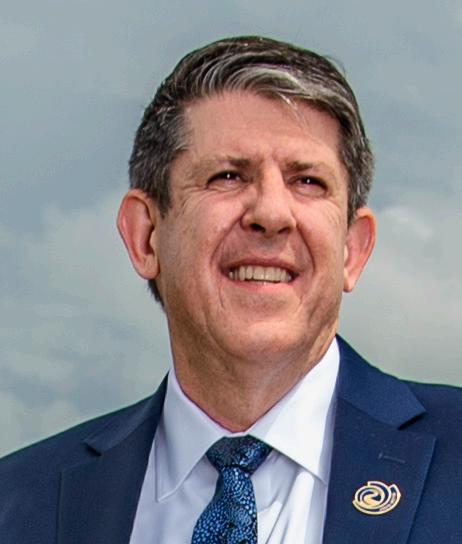
Recently, companies like decking manufacturer Trex and Spanish plastics manufacturer Synthesia Technology ($29 million) announced investments in the port of $400 million and $29 million, respectively, and the port has secured federal grants for rail infrastructure expansion, security upgrades and a mooring expansion. Thus, the port is looking to grow. Since 2017, it has acquired roughly 2,500 acres to accommodate growth and is preparing for a big marketing push around a potential 1,000-acre supersite later this year.
“I’m confident that in the not-too-distant future, the community will attract a multi-billion-dollar company that will be a watershed moment for Little Rock,” he said. “This is a priority for the port, and the team is working diligently to make this site shovel
As a single entity, the port represents one of central Arkansas’ largest economic engines. The Port Authority was organized in 1959 and the port opened in 1971. It started with one industry on 1,000 acres and today entails 50 industries on more than 5,000 acres.
“The Port of Little Rock is over 60 years old and has had incredible success thanks to the support of the Little Rock Port Authority board of directors, the mayor and the city board,” Day said. “The port will keep growing and expanding its real estate holdings and the services to industry so that it never stops growing. The Little Rock Port Authority must do whatever it takes to keep strengthening the local economy, and that is the strategy that guides us today.”
Day is passionate about his hometown and did not rule out a transition from administration to politics.
“I have been a public servant in Little Rock for over 30 years, and I love this community as much as anyone,” he said. “To me, Little Rock is a great city, and we are only getting better. In fact, the best is yet to come. I enjoy the job I have, and as a part of the larger economic development team, we are having great success.
“Would I like to be mayor? I would be less than honest if I didn’t admit that the thought has crossed my mind. With that said, I sincerely believe that I have more to offer, but for now, I am where I need to be.”
Life does not always turn out as expected, and if anyone asked Dexter Doyne, president and CEO of Doyne Construction Co. in North Little Rock, what he wanted to be when he was growing up as the youngest of nine in a farming family in Little Rock’s College Station community, the answer they likely received was, “I want to make films.”
He started making home movies in his early teens after ordering a Super 8 film stock camera popular in the 1960s. His junior year, a representative from the Stanford Research Institute — now SRI International — visited College Station Elementary and chose his nephew for a case study as part of the Follow Through Program.
The researcher, Phyllis Hamilton, asked Doyne to film a pilot to complement her case study, and after seeing the footage, SRI commissioned an extended version that documented the program’s effect on College Station. Hamilton encouraged Doyne to attend film school at San Francisco State University, even legally adopting him so he could pay the in-state tuition rate.
Doyne graduated in 1977, and that same year, his father was diagnosed with terminal cancer. His father had laid the foundation for what became Doyne Family Real Estate Partnership by building rental homes on his farmland, and Doyne stayed in College Station to support his mother and care for the properties after his father died.
Neighbors began asking Doyne to play handyman, and he soon incorporated Doyne Construction. In 1989, he moved the company to its current address at 719 Main St. in North Little Rock. Doyne himself stayed in College Station, where he is a board member of the Progressive League of College Station, a role for which he was prepared by founding member Annie Mae Bankhead.
“Her dream was to always attempt to improve the quality of life in the College Station community, and she taught us and others who were part of the organization that we are entitled to the same quality of life and community benefits as any other part of the Little Rock and Pulaski County community,” he said.
He is also a member of the Little Rock Regional Chamber Executive Board and the director of the Little Rock Port Authority.
“There’s tremendous growth in the port area,” he said. “College Station’s my home, so I wanted to have insight into the development that was happening right next door to our community and
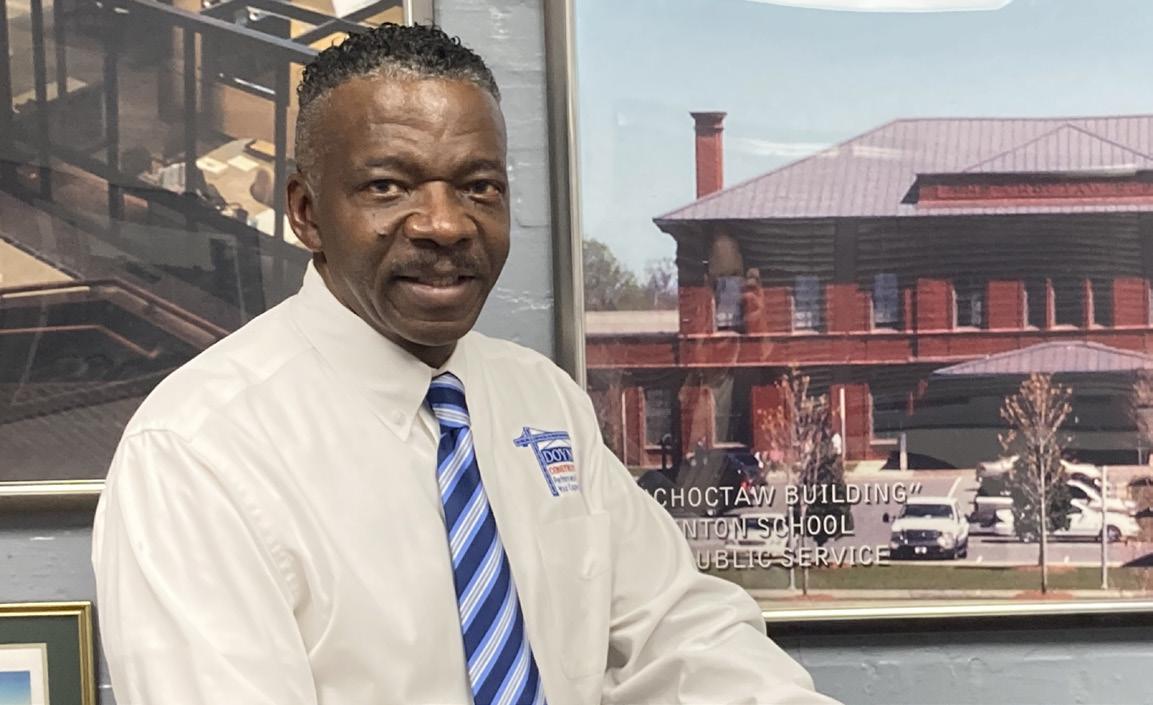
be able to share that information with our community citizens.”
He became involved in the Hot Springs Documentary Film Festival in the early 1990s, eventually serving as chairman of the board. He also made a short documentary of his own, “In Search of Partners in the New South Africa,” in 1995 after traveling to South Africa with then-North Little Rock Mayor Pat Hays for Sister Cities International.
He said he is often asked why he has not left College Station, as many do, and although he could afford to live in a more affluent part of town, he prefers to support the community where he and his wife were born and raised.
“We’ve lost a lot of our good human resources who could certainly help to improve the community by reinvesting in it,” he said, “but we made a conscious decision to stay there, build our home there, raise our family there to hopefully encourage others to do the same, to reinvest in our College Station community.”
Now preparing to join his wife, Angela Doyne, in retirement, he said his goals are to prepare his children, Angelé Doyne, Kayla Doyne Blake and Mason Doyne, to take the reins at the family businesses.
A deacon at Pilgrim Rest Missionary Baptist Church in College Station, the very same church he attended as a child, Doyne’s reverence to God and gratitude for the fortune he has found in his life is evident in his trademark greeting: “I’m blessed today, and you are too.”
One might never guess that Kalene Griffith, president and CEO of Visit Bentonville, is not a native Arkansan.
She leads an organization that’s job is to promote the city as a tourism destination, improve the quality of life and help stimulate economic development, and she does it like she has advocated for Bentonville and Arkansas her whole life.
Although Griffith is originally from Kansas, she has been local to Bentonville for years and served Visit Bentonville for 18 years. Griffith said she grew up in a home that stressed Southern hospitality and where visitors were always welcome.
“Our house was very welcoming, and there were four of us kids, but everyone hung out at my house. My parents were sure to make everyone feel welcome,” Griffith said. “I don’t think we ever sat down at the kitchen table for dinner with just the six of us. There were always two to four extras at all times.”
Griffith said she loves her job, and she loves where she lives. In Bentonville, Griffith has been able to create meaningful relationships with those around her.
“I think my favorite part of living in Bentonville is the people. The things that I’ve gotten to experience and the innovation people have brought in making things happen in our community is inspiring,” Griffith said.
Visit Bentonville touches multiple areas of industry, and through collaboration with restaurants, retailers, city government and federal government, Griffith said she has been inspired by the work the organization has been able to accomplish.
“It’s all about the people, and our job is really about bringing people to our community and welcoming people. It’s really fun. We get to talk about all of the good, positive things that are happening in our city,” Griffith said, adding that her job is often about storytelling and inviting others to enjoy all Bentonville has to offer.
No day is the same in Griffith’s line of work, which is
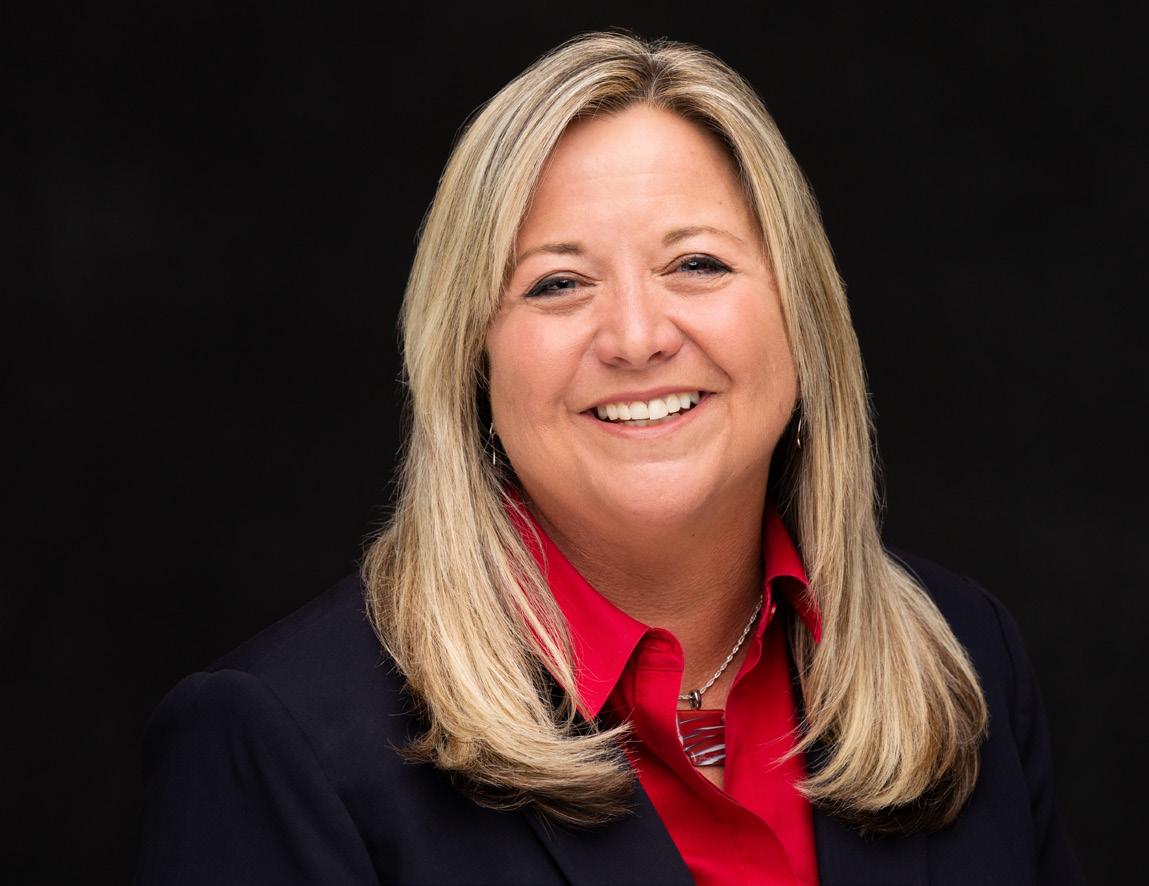
something she has grown to appreciate. While so much of what Griffith does is in serving tourists, Visit Bentonville is also instrumental in creating an environment where people like to live and work.
“I think the most important thing in this job is knowing that even when you work long hours, you are creating exceptional guest experiences,” Griffith said. “There is nothing more rewarding than when somebody comes into your community, and they feel that.”
Griffith said she enjoys being able to follow her passion every day in multiple ways. As people visit Bentonville before they move to or invest in the city, Griffith is grateful for her team that prioritizes both the visitor experience and the local culture within the tourism environment.
“I always tell people that my livelihood is my love of Bentonville, but my passion is the state of Arkansas,” Griffith said. “I want to be known for bringing people together to make a difference in our community, creating unique experiences for our visitors and for collaborating with the tourism industry leaders to see success for Bentonville and Arkansas.”
cott McGehee’s path in the world of cuisine has followed a circuitous route, one that started in the Arkansas gardens of his grandparents and the kitchens of his late father, also a restauranteur, and wound through some of the most elite food circles in the nation. While many left the Natural State in their rearview mirror, however, McGehee always kept it over his shoulder, knowing one day he would return to celebrate the state’s culinary traditions.
“I’m obsessed with Arkansas culture,” said McGehee, whose Arkie roots run several generations deep. “A lot of people from here, I don’t think, understand the breadth of our food culture.”
McGehee had a world of options at his disposal after studying at the California Culinary Academy and simultaneously being schooled under Alice Waters in the legendary Chez Panisse in Berkeley, California, where he learned the food game from the floor up. He chose to make a beeline back to his hometown of Little Rock and, in the time since, has opened a string of some of the state’s best-known and best-loved establishments, starting with Boulevard Bread Co., a still-going venture he has sold out of. He followed that with ZAZA Fine Salad & Wood Oven Pizza Co., Taco & Tamale Co., Big Orange, Local Lime, Lost Forty Brewing, and Camp Taco.
Each place has its own vibe, yet all share McGehee and his associates’ vision and philosophy of celebrating what is in Arkansas, from ingredients to people.
“One thing that has not changed is I have a very intimate, close relationship with a lot of local farmers, right?” he said. “Getting to wake up and give them a call or run by their farms and see what they’re growing and talk about what’s ripening on the vine in the next few weeks — that’s what inspires me the most.
“Something else that has always inspired me are the people. It’s always been all about the people, the team, the people I like to say work for me and I work for them, as well. It’s not only their success and their evolution as they move through the workplace, but it’s about their families and their kids. Seeing them evolve and
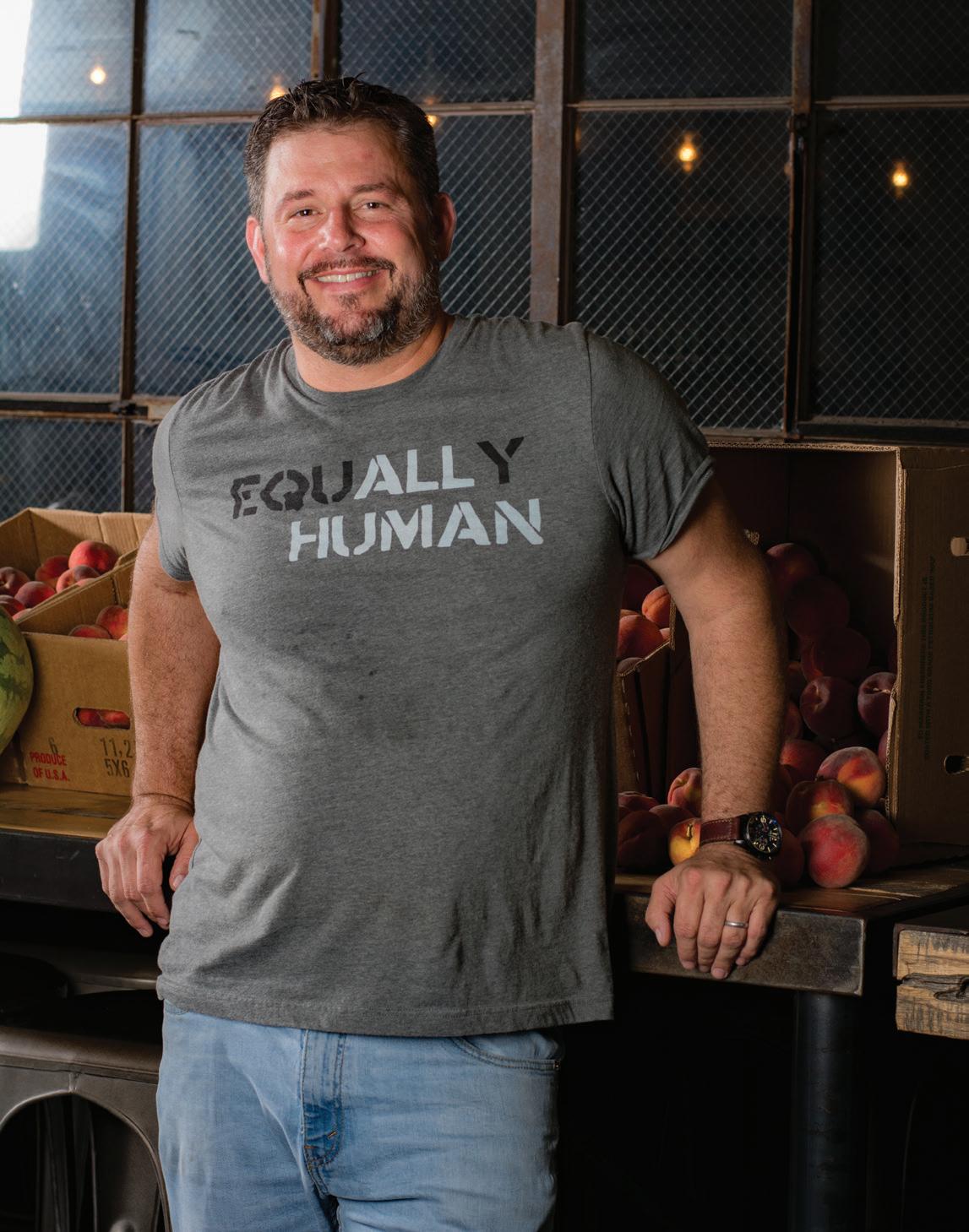
learn and be successful in their own right, either being promoted or leaving me and doing something spectacular with their lives, that’s always been the most rewarding part of my job.”
Asked what the future holds for the company and new concepts yet to come, McGehee took a long breath. Leading an organization of 13 restaurants and 1,000 employees is a much different animal than a single cafe in the neighborhood, and he has been forced to evolve right along with the company’s growth, a delicate balancing act if there ever was one.
“I would love, eventually, just to get back to kind of where I started, like that little place that everyone told me wouldn’t work in the middle of the Heights called Boulevard Bread Co.,” he said.
“I would like to get back to something small and a little more elevated and probably more Italian in focus, just because I have so many family connections in Italy and I spend a lot of time there. I would like to kind of get back to my roots in that way, to something someplace where I can be there every day.”
St. Francis of Assisi is credited with the oft-cited phrase, “Preach the Gospel at all times, and if necessary, use words,” suggesting that lofty platitudes are only one path to salvation and not necessarily the best one.
For Chuck Monan, minister of Pinnacle Church of Christ in Little Rock, truer words have never been spoken.
“I’m not going to act holier than thou because I’m not all that holy,” he said. “I try not to take myself too seriously. I use humor in a lot of my preaching, and I certainly do in my everyday relationships with people. I don’t get up in the pulpit and turn into something other than what I was the other six days of the week.”
If the name Chuck Monan does not ring a bell, it is probably because he is more widely known by the nickname Pigskin Preacher, under which he appears on 103.7 the Buzz as a frequent guest on sports talk shows. If anything approaches his fervor for the Word, it is sports, specifically Michigan Wolverines football, of which he has been a lifelong fan.
“I’m a Michigander,” he said. “I took a couple of degrees from Oklahoma Christian University in Oklahoma City. I went out there because I was on an academic scholarship and just had a great time. I met my wife there and a lot of good friends.”
The original plan called for a history degree, but Monan found opportunities to preach in college and felt immediately at home. His formal ministerial career took him to churches in Michigan and Oklahoma before he arrived in Little Rock in 2001. He spent 16 years at Pleasant Valley Church of Christ before leaving to cofound Pinnacle Church of Christ in 2018.
“Really humble beginnings,” he said. “We were at a couple of rented facilities — one place that seated 76, and the first Sunday, we had 146. Then we were in a rented skating rink. We scraped enough money together to buy the old television studio up on 1 Shackleford Drive and gutted it and built a pretty functional church out of it.”
Monen’s come-as-you-are mentality toward his calling is reflected in the diverse congregation Pinnacle Church of Christ attracts, something in which he takes great pride.
“I don’t want to be in these places where 97 percent of the people are white or churches that are all Black. I want to have a church that has white folks, Black folks, rich folks, poor folks, insiders, outsiders — everybody,” he said. “We don’t want to play politics. We don’t want to play favorites. I don’t mean to sound like

we’ve discovered the Magna Carta or anything, but we try not to treat the rich one way and the poor another way.
“If you were to come to Pinnacle, I think you would see a different spirit that exists there than exists in most of our churches. If you come in there on a Sunday, you would see it looks like our city. We’ve been really pleased about that because we get people coming in all the time, and they feel comfortable. It doesn’t matter if they’re white or Black. This is a church where the Bible is going to be preached, and it’s not going to be considered a sin to be glad you’re alive. We’re going to enjoy the blessings and gifts God has given us, and we’re going to do the best we can to follow him. That’s really what it’s all about.”
When southeast Arkansas’ unique Delta Heritage Trail is completed in 2025, Robert Moore will be that much closer to realizing a vision for his hometown of Arkansas City as a tourism hub for outdoor recreation.
Moore is a farmer and lawyer who served in the Arkansas House of Representatives from 2007 to 2013, the final two years as speaker. He also served as chairman of the former Arkansas Transportation Commission, was the longtime director of the Arkansas Alcohol Beverage Control Board and was a member of the Arkansas Highway Commission from 2013 to 2023, including two years as chair.
For more than two decades, he and his wife, Beverly, have championed Arkansas City as a potential destination spot for bikers, hikers, birdwatchers and related ecotourists from across the country who might flock to the small Desha County seat once the Delta Heritage Trail’s full 84.5 miles are complete, connecting Lexa just south of Helena to downtown Arkansas City.
Sections of the ambitious rail-to-trail project are finished and in use, including a “one of a kind” paved 14-mile stretch on top of the old Mississippi River levee south of the Arkansas River from Rohwer to Arkansas City.
The trail already encapsulates a state park, and when complete, it will represent an investment of roughly $83 million in state, federal and private funds — almost $1 million per mile. The final 15 miles of the primordial middle section are expected to be finished in 2025. There, the trail will cross the White and Arkansas rivers on two old railroad bridges while stretching through a pair of remote wildlife management areas that state officials have said will afford some of the best wildlife viewing anywhere.
Moore said there will be nothing like it in the country, and he intends for his historic hometown to be ready when the full trail opens. The trailhead in downtown Arkansas City sits across the Mississippi River Levee from the 8,000-acre Choctaw Island WMA and its numerous nature trails, lakes and access to the Big River. Moore has spearheaded a lot of local work at ground zero. He led early efforts that resulted in establishing a park adjacent to the trailhead honoring Arkansas City native John H. Johnson, who founded Ebony and Jet magazines in Chicago in the early 20th century. The Walton Family Foundation subsequently funded the project, which was officially dedicated last year. With the help of Desha County Judge Richard Tindall and former Mayor Rick Hales, grant money was obtained for an eightspace RV park next to the trailhead that will be operated by the city.
Moore and his wife donated the properties for all the projects, and the trailhead is named in his honor.

Thanks to the enthusiastic leadership of current Mayor Carolyn Blissett and other local officials over the past several years, Arkansas City has a new municipal water system and free Wi-Fi in place. The historic Furr House bed and breakfast sits a few blocks down Desota Avenue, not far from the old opera house that held watch over the town in its paddlewheel glory days as an important river port.
The completely restored Desha County Courthouse constructed in 1900 is considered one of the most architecturally significant buildings in southeast Arkansas, the highway connecting Arkansas City to the four-lane U.S. 65 in McGehee is in excellent condition, and Sheriff Mitch Grant maintains a peaceful vibe in town.
Moore said the natural resources, history, and now infrastructure, are in place for his hometown to potentially thrive.
“What we need is some visionary entrepreneurial investment to provide the retail amenities that will give travelers the complete package to come and stay,” he said. “Once we get the RV park done, it’ll allow that first wave of visitors to enjoy the truly unique experiences offered in this too long overlooked area of our great state.”
Moore said the vision requires perseverance, a trait he learned in the state House while promoting southeast Arkansas and the Delta in significant and effective ways. In fact, his work in that regard earned him a room full of recognition. Moore was named the 2007 Arkansas Delta Byways Tourism Person of the Year, he received the 2010 Outstanding Achievement in Historical Preservation Award from the Historic Preservation Alliance of Arkansas for his efforts to get seven Arkansas City structures included on the National Historic Register, and in 2019, he was inducted into the Arkansas Tourism Hall of Fame.
“We just need an investor or two that can see the enormous opportunity here,” Moore said of the Arkansas City he envisions filled with ecotourists patronizing the restaurants and music venues that will line Desota Avenue. “When the full trail opens next year, it’s going to happen. I believe the future for my little hometown is very bright right now.”
In Moore’s vision, future tourists might even get the chance to see and hear live music downtown one day, which would serve as a fitting capstone to his quest of seeing Arkansas City revitalized. Using the pseudonym JR Grace, Moore writes his own music in the progressive blues and country style and uploads it to his YouTube channel. Though his political days are done, Moore said one of his soon-to-beposted new works is a current events song.
“It’s about following the truth, coming together and getting some goodness back in the way we deal with each other,” he said.
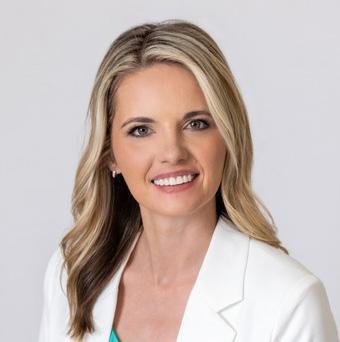
Winrock

ar

Electric
Arkansas
HCJ
Hickingbotham
IFWORLD
Little
Mountaire
Quattlebaum,
Startup
Rose
Stephens,
Venture
Forvis Lyon
Ouachita
Hickingbotham
Regions
University
Simmons
Southern
University
University



From Walmart founder Sam Walton to Lowell-based J.B. Hunt, there is no shortage of entrepreneurial success stories in Arkansas. As a new generation lends its talents and ideas to the state’s business landscape, the Arkansas Governor’s Cup Collegiate Business Plan Competition is one avenue by which aspiring entrepreneurs gain business savvy and exposure while they present their ideas to the local community.
Created by Arkansas Capital more than two decades ago, the competition provides college students with an immersive entrepreneurship experience that teaches them the ins and outs of launching a startup. Volunteer judges, including entrepreneurs, small-business owners and corporate executives, provide students with constructive feedback throughout the competition.

Although students are not required to start the businesses they pitch during the competition, its website states, almost 30 companies trace their roots back to the competition, and many competition alumni still benefit from the connections and experiences of their Governor’s Cup days.
This was the first year the competition was open to students in Louisiana, Mississippi, Missouri, Oklahoma, Tennessee and Texas. The event has a $144,000 cash prize pool, including $20,000, $10,000 and $7,500 for first-, second- and third-place winners.
The winners were announced during an awards luncheon at the Statehouse Convention Center in Little Rock April 17. The winning team in the high-growth/technology graduate category was ProPika from the University of Arkansas in Fayetteville.
Samtracs from Oklahoma State University placed second, and Hidalga Technologies from UA placed third. Hidalga Technologies also won a $1,000 prize for elevator pitch in the category.
In the high-growth/tech undergrad category, Thinking CAPZ from Philander Smith University in Little Rock won first place. DevelopIQ from UA placed second, DataDroid from UA placed third, and DevelopIQ won the elevator pitch.
In the small-business category, Arkansas REM from the University of Central Arkansas in Conway placed first. Wanderist Wines from UA placed second, Arkansas Love Kombucha Co. from the University of Arkansas at Fort Smith placed third, and Sapien Financial from the University of Arkansas at Pine Bluff won the elevator pitch.
Arkansas Business Hall of Famer Dhu Thompson was the title sponsor of the competition. The Walton Family Foundation was the venture sponsor, Winrock International was the high-growth/tech sponsor, and Winrock Automotive was the small-business sponsor.
“Don’t wait for opportunity; you need to create it,” Thompson said during his speech at the luncheon. “You continue to learn academically, and that’s important, and you’re smart, but let me prepare you:
When you begin your entrepreneurial journey, you’re going to fail. You will learn when it’s your idea and if you fail, you have no one else to blame but yourself.”
Entrepreneurs begin their journeys with naivety, but failure allows them to learn from experience, he added.
“Then when you begin to succeed, you will start to accomplish goals you’ve never imagined,” he said. “Many things in business are difficult before they become easy. You will start to recognize that failure becomes your key to success. You need to let failure open your doors to success. Understand character is built through failure.”
Learning to believe in oneself is key, he said, adding that selfconfidence does not come from popularity on social media but from establishing and achieving goals.
Former professional athlete Tywanna Smith, a sports business manager and author, emceed the luncheon. During the days leading up to the awards luncheon, the finalists attended a welcome dinner at the Innovation Hub in North Little Rock April 15 and attended an oral competition and preliminary elevator pitch competition April 16.


Most anyone who encounters Dr. Monty Heathman, dentist, out on the highway should not blink. A longtime Porsche enthusiast, Heathman pilots a 2021 911 Cabriolet Turbo S convertible with enough snarling guts under the hood to deliver him from standstill to 60 in less than three seconds. At that rate, even his longestserving patients barely have time to recognize his familiar smiling face before he is out of sight, leaving behind little more than a glimpse of his vanity plate.
“That thing is just dirty,” he said. “It blows the doors off a Lamborghini, the 640s that they’ve got. It beats any Corvette or any American-made Mustang or stuff like that. It’s just so responsive. You hit that thing, and you’d better hold on for dear life.”
To talk to Heathman about his ride is to hear a man smitten with speed and taken with turns. His current car is his third Porsche and his second Cabriolet but not, he underscores, his last.
“They’re iconic cars. The lines on them are beautiful,” he said. “They’ve got a nice fat rear end on them. They’re really great, don’t have any problems with them, and they hold their resale value incredibly well.”
All over Arkansas, the number of luxury car enthusiasts such as Heathman is accelerating in growth as more drivers find themselves content with nothing less in their daily ride than maximum output, sparkling on-board technology, and sumptuous surroundings of buttery leather, exotic woods and metal trim.
“The wealthy in Arkansas are truly savoring their hard-won prosperity and doing it behind the wheel of the finest automobiles money can buy,” said Landon Montgomery, general manager of Winrock Auto Group’s Defender Range Rover Discovery.
Luxury autos are not the only trapping of success, but they continue to be among the favorite indulgences of the Natural State’s elite. Gleaming coupes offer near-racetrack levels of performance via eyepopping horsepower and advanced suspension systems built for effortless hairpin cornering. Sleek, yet roomy, SUVs pack in every electronic and comfort gadget imaginable but still clock sub-seven-second zero-to-60 times. On the highway and around town, opulent sedans glide down the road screaming success and giving Arkansas’ wellheeled the best in gadget-packed performance for their luxury dollar.

“We’re seeing unprecedented demand,” Montgomery said. “These cars have always been symbols of prestige and success, but now they’re flying off the showroom floor at an astonishing rate.”
Demand for high-end auto brands has not only been pronounced in recent years, it has played out nationally across the broad. As a class, luxury brands have seen higher growth in sales than all other classifications of auto and at

higher profit margins, making the category the strongest it has been in years.
According to McKinsey & Co., luxury auto brands’ sustained tear is projected to enjoy brisk annual growth through 2031. Sales of autos $80,000 to $149,000 are expected to increase 8 percent annually, while those $300,000 to $500,000 are predicted to grow 9 percent per annum over the same time period.
Cars in the $150,000 to $299,000 range and those more than $500,000 are expected to show even more growth at 10 percent and 14 percent, respectively. By contrast, all autos less than $80,000 are only expected to grow 1 percent through 2031 per the report.
Porsche, Lexus, Mercedes-Benz, BMW and Range Rover have all enjoyed their share of the current buying spree. In Arkansas, the wealthy and privileged have done their part to fuel sales in the ongoing quest to one-up the neighbor’s garage.
“A lot of our clients have driven Mercedes for 20, 30 or 40 years,” said Mark Lee, general manager of Winrock Auto Group’s Mercedes-Benz of Little Rock. “We’re seeing fourth-generation Mercedes-Benz owners now. Customers are very particular about their cars. They will not bend.”
Lee said some of the recent brisk sales have come from pentup demand stretching back to 2020, when the supply chain issues caused by the COVID-19 pandemic dramatically cut into inventory levels. Such is not the case today, when row after row of gleaming machines sit in strident rows on Winrock’s west Little Rock lot, a nearly irresistible lure for high-end consumers.
Bruce Gilby, general manager of Parker Lexus of Little Rock, said his dealership sold 385 cars in the first quarter of 2024 alone,
thanks in part to vastly improved inventory levels feeding the 1 percent’s seemingly insatiable appetite for the prestige of driving a luxury car.
“Last year, we may have had three or four cars on the lot,” he said. “We couldn’t get them in. This year, we’ll have 60 or 70 cars on the lot. We’re not back to pre-COVID status yet, but the manufacturers are back on line with getting inventory out. We had a hard time keeping up with the inventory in April because the sales were going so well.”
The most conspicuous sign that luxury brands are flexing their sex appeal in the local marketplace is the much-anticipated Porsche dealership soon to open in Little Rock. Sources close to the dealership said the stunning new sales office will boast a respectable initial allotment of about 30 cars along with an elitelevel service center to serve new and existing enthusiasts. The forthcoming dealership, which is set to open in June, has many local Porsche fans tingling with excitement.
“People see these cars as investments,” said Justin Luettjohann, general manager of indiGO Auto Group, which brought the legendary automaker to central Arkansas. “Porsches are iconic vehicles that people have seen as signs of success from the time they were growing up.”
The opulence of such dealerships is another factor in the success of the luxury auto class, even as the recent economic climate and high interest rates might suggest it would be slowing down. As McKinsey & Co. noted in its trends report, the manner in which high-net-worth customers are treated during the sales process — from elegant showrooms, bespoke staff and highly individualized customer service — is on par with the attributes

of the vehicles themselves. Therefore, manufacturers are extending the brand image of success and prestige people have of their products by reflecting it in the dealerships themselves.
Local dealers have long demonstrated how mastery of the art of the sale starts with surroundings. This can be seen in the Porsche dealership being designed to look like a living piece of modern art, BMW of Little Rock’s sleek and elegant glass-fronted showroom and Parker Lexus’ just-completed extensive remodel that leaves no customer comfort to chance. No less impressive is the cadre of immaculately dressed sales staff en pointe at luxury dealerships, highly trained and impeccably spoken professionals who offer customers a VIP experience second to none.
“Customer expectations for luxury cars are rapidly evolving, spurred by luxury brands beyond automotive,” the McKinsey & Co. report states. “Automotive players must keep pace because customers remember their best experiences as benchmarks.”
At few points in history has the future of the luxury auto been more intriguing. Carmakers in the class are turning their full engineering prowess to designing models that marry the latest in electric vehicle technology with luxuriant interiors and a dizzying array of electronics. In so doing, the manufacturers continue the legacy of innovation, performance and prestige for which they are known amid a new generation of well-heeled consumers and successfully so, recent sales figures indicate.
According to company releases, Lexus had its best sales year ever in hybrid and electric models last year, while Porsche’s electrified Taycan was a respectable second in sales behind only its classic 911. Even the power-guzzling demands of SUVs have not derailed innovation or the cachet of owning a luxury brand, to which the surging sales of Range Rover SE and BMW iX models attest.
Thanks to models such as the Mercedes Benz
AMG GT 63, even adrenaline junkies are having their day. The much-anticipated new Mercedes-Benz promises to be the closest thing yet to a hybrid supercar thanks to a twin-turbo V-8 and rear-mounted electric motor. Producing 805 horsepower and a combined system torque of up to 1,047 pounds per foot, the GT 63 clocks a head-snapping zero-to-60 time of 2.7 seconds, promising to turn knuckles around the hand-stitched fine leather steering wheel white.
Such performance is enough to make even longtime sports car enthusiasts such as Heathman take note, even if his loyalty for Porsche runs too deep to switch. He said regardless of the nameplate, the growing appeal of luxury cars in Arkansas is easy to understand.
“There’s just more demand for this kind of car because they are generally built so very well,” he said. “People just want them.”








VEHICLES INSPIRED WITH TOTAL CONFIDENCE, WHATEVER THE TERRAIN, DELIVERING A NEW GENERATION OF LUXURY AND ADVENTURE.


Understanding wine is not only a matter of good taste but is also an essential business tool, be it for entertaining, closing a deal over dinner or gifting a prized client. This month’s installment of “Savoring Your Success” looks at some standout selections suitable for the accomplished connoisseur and those who aspire to be.
The list below was curated by Jonathan Looney, certified sommelier and owner of O’Looney’s Wine & Liquor in Little Rock, a definitive authority for wine in central Arkansas. It contains solid to decadent selections at multiple price points to match any budget or occasion.
Mastering this list is the first step toward certifying one’s good taste, upward mobility and status as a true aficionado.
2016 Gaja & Rey Langhe Chardonnay • Italy
Boasting flavors of citrus, honeydew melon and salty mineral nuances derived from limestone-rich soils, this selection has wowed wine experts around the world, Looney among them.
“This wine comfortably fits into the top five wines that I would consume whilst stranded on a desert island,” he said. “I ‘endured’ this under duress with oysters, viewing a pastoral sunset with close friends over 10 years ago, marvel ing at how its racy acidity and sublime fruiti ness hinted at its nuanced nature. Features a persistent finish that goes on for what seems like hours.”
Pair to perfection with shellfish, lean fish, pasta, mature and hard cheeses, and cured meat; the Gaja holds its own yet enhances the other flavors beautifully.
“This wine will dazzle even the most discerning palate,” Looney said, “and definitely impress the boss.”
94/100 (Wine Advocate) • $330

Chardonnay
A wonderful example of Sonoma Valley grape magic, One Sixteen Russian Valley demonstrates the best of the American winemaker’s art. Offering bright citrus notes of lemon and lime zest, as well as pear, fresh honeysuckle and custard creme brulee, the selection balances against brilliant minerality.
“Ridiculous balance of French oak, apple, pear, lime and almond biscotti,” said Looney. “Definitely California liquid sunshine. A cult wine, it’s impressive to show.”
Versatile at table, serve this beauty with confidence alongside pork, vegetarian and poultry dishes.
92/100 (Wine Spectator) • $117

True art is at once profound and profane, something that rests in the mind long after it has entered the senses. Such can be said about the 2017 Trimbach Reserve, the lone pinot gris in the top three. Hailing from the Alsace region of France, this edgy selection has been aged to perfection pre-release and the result is an austere concoction that punches well above its weight, sassy enough to stand up to pork and spicy dishes yet sophisticated enough to complement cured meat and mushrooms.
“Pinot gris from Alsace? 2017 current vintage? Yes times two,” Looney said. “This isn’t your patio pounder Solo Cup quaffer but a serious wine for decidedly unserious folks, guaranteed to inspire even the most laid-back wine enthusiasts to a raucous, passionate discourse on the state of wine today.”
93/100 (Wine Enthusiast) • $47

Round out any collection with the bright whites described here by Jonathan Looney:
2017 Domaine de Villaine Rully
1st Cru Les Margotes
France • 90/100 (Inside Burgundy) • $120
“Chalky minerality. Depth of fruit. Impeccable pedigree. Enjoy with chargrilled, lime-drizzled shrimp.”
2017 Pott Twenty Meters 3 Viognier, Mt Veeder CNP Vineyard
California • 92/100 (Vinous) • $74
“Viognier from Napa? Yes. Made by Aaron Pott from his mountainside eponymous vineyard, this is a rare bird indeed.”
2018 DuMol Wester Reach Russian River Chardonnay
California • 94/100 (Wine Advocate) • $70
“I waited more than a decade to sell this wine in Arkansas — bright, bold, nuanced with just a little razzle-dazzle. Assuredly amazing.”

2016 Quintarelli Giuseppe Ca’ del Merlo Rosso Veneto Red blend • Italy
A once-in-a-lifetime drinking experience, this spectacular selection combines 50 percent grape juice pressed at harvest with 50 percent juice from grapes that have been dried for two months, intensifying flavors. After fermentation, the wine is racked into large Slavonian oak barrels for seven years to produce a transcendent elixir.
“Only read about this delicious unicorn until a casual run-in with an master sommelier at SPQR in San Francisco a few years ago,” Looney said. “Only 12 bottles allocated to Arkansas; this is the wine that personifies liquified perfection.”
93/100 (James Suckling) • $569.99


2015 Quilceda Creek Columbia Valley Cabernet Sauvignon • Washington State
“Graceful”, “expressive” and “impeccable” are just some of the terms lavished on this full-bodied lush stunner out of the Pacific Northwest. Pronounced notes of dark berry, black olive and Chambord combine to deliver an intense richness and juicy tannins.
Difficult to find in Arkansas, Looney said this is one wine that is quest-worthy.
“A highly rated masterpiece that will blow you away with its big bold layers of flavor,” he said, “one of the best producers in Washington has certainly produced a showstopper.”
96/100 (Wine Enthusiast)
• $200

Treat the senses to these sumptuous selections hand-picked by Looney:
2019 Kapcsandy Family
Winery Roberta’s Reserve Merlot
California • 98/100 (Jeb Dunnuck) • $480
“Only 220 cases were made of this merlot, which is 100 percent Napa Valley perfection. All the wine critics confirm what anyone catching a small whiff of this beauty knows immediately in their bones.”
2017 Shafer Hillside Select Cabernet Sauvignon
California • 97/100 (International Wine Cellar) • $370
“Devastatingly delicious, the purest form of the bounty of Napa cabernet sauvignon. Stag’s Leap District shows what attention to detail in winemaking and brilliant careful stewardship of the grape itself means.”
2018 Sea Smoke Southing
Sta. Rita Hills Pinot Noir
California • 95 (Wine Enthusiast) • $180
“We waited over 15 years for the opportunity to share this amazing pinot from the storied Sea Smoke vineyard — berry-busting brilliance combined with layer after layer of evocative fruit.”
2016 Lamborn Family Vineyards Howell Mountain
Zinfandel • California • $70
Leveraging the near-perfect 2016 growing season to its fullest, this affordable wine offers a rich blackberry color with open aromas of layered cherry and ripe raspberry atop layers of spice and minerals. Mouthfeel is complex and complements the ideal marriage of toast and vanilla buttressed against black pepper and spicy undertones that lead to a silky and lingering finish.
Winemaker Heidi Barrett, who brought this sumptuous selection to life, calls it “an exceptional example of mountaintop zinfandel … definitely in a league of its own,” and Looney simply stated, “I couldn’t agree more.”

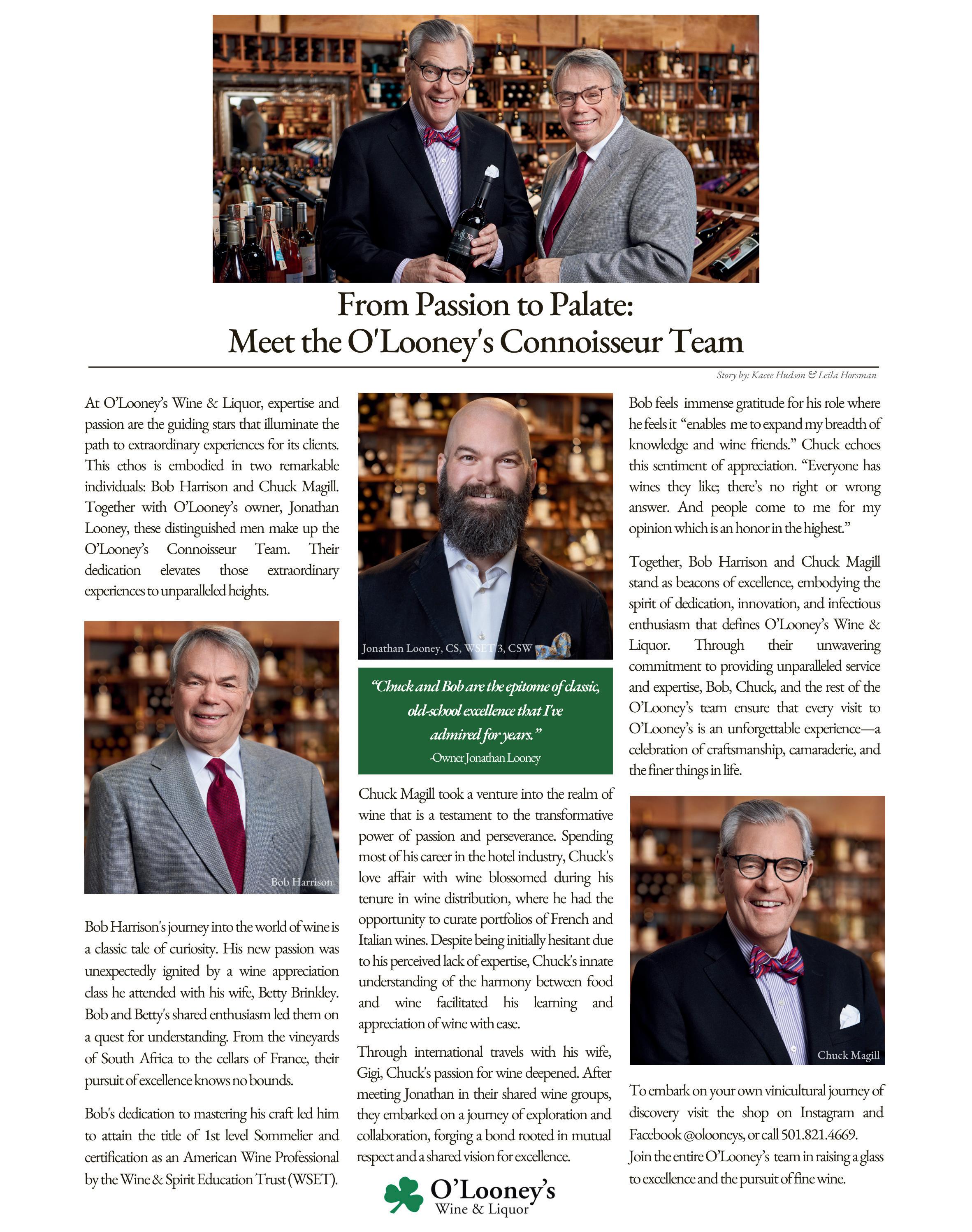
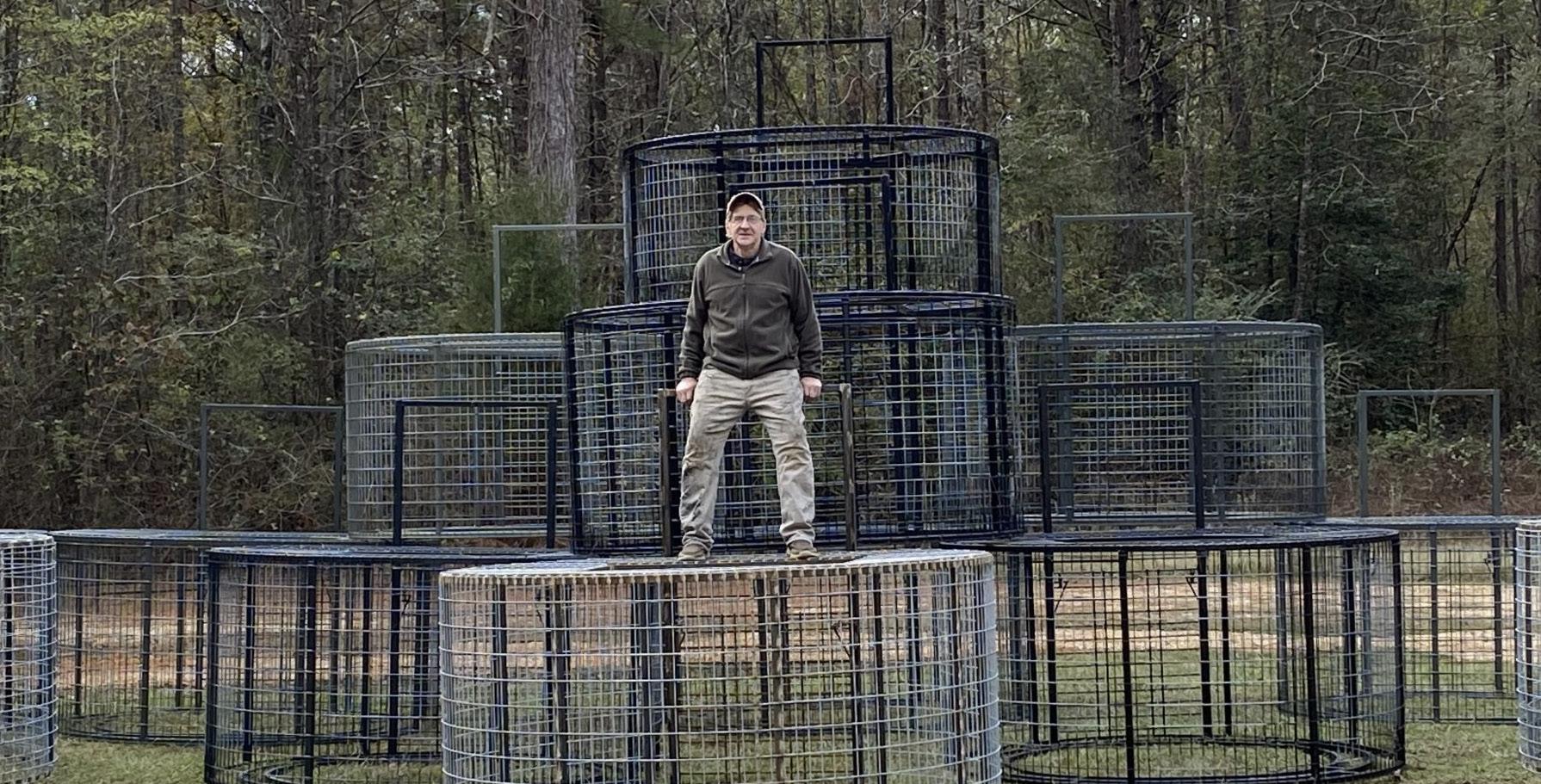
Randy Kelley was in his deer stand near Camden 22 years ago when he spotted an 8-point buck and two does feeding nearby.
He watched for a moment and then saw a female feral hog with piglets attack the buck. The hog ran the deer off, and Kelley shot and killed the sow with his rifle.
“Ten minutes later, Daddy came back with 40 hogs,” Kelley said. “They were bad back then. They’re worse now. If you have four or five feral hogs around, you’ll have 40 or 50 in no time.”
The feral hogs, a breed so despised in Arkansas that state lawmakers once passed legislation to disassociate them with the University of Arkansas Razorbacks mascot, root fields, tear up crops, break irrigation pipes and cause massive mayhem to farmers. According to the Arkansas Department of Agriculture, the hogs can cause up to $41 million of damage to farmland a year.
And they are seemingly everywhere.
Seventy-three of the state’s 75 counties have reported “extremely high” rates of feral hogs. Only Clay and Lonoke counties are considered “unsustainable” for the critters, and unofficial counts show they are not overwhelming the areas.
There is no real way to count them. The pigs reproduce quickly, and they are highly transient — one captured hog fitted with a tracking device traveled more than 100 miles to re-
turn to his herd when released.
The problem has gotten bad enough that hunters are taking to the air, using helicopters to track the hogs down and pick them off like aerial snipers in an action movie. They are also blasting the hogs with dynamite.
The animals are smart, however, said Becky McPeake, an extension wildlife specialist with the University of Arkansas System Division of Agriculture. Shoot one hog, and the rest scatter. They also remember the area and the sound of an approaching helicopter the next time.
“They are an issue,” McPeake said of the hogs, “and they will continue to be an issue.”
McPeake serves on the state’s Feral Hog Task Force, which is charged with finding a solution to reducing the state’s feral hog population. Feral hog hunting is prohibited on public lands in Arkansas, but officers from the Arkansas Game and Fish Commission, U.S. Fish and Wildlife Service and the U.S. Forest Service sometimes trap on state lands.
“It doesn’t make sense not to trap,” McPeake said. “You can trap five, 10, 20, even 30 at a time. You may be able to shoot one or two before they scatter.”
Captured hogs are “dispatched,” or killed, she said. Some farmers can keep the dispatched ones for food, she added.
“They are a problem,” she said. “They root up the land, they consume plants, they chew on bulbs and roots, and they wallow in water, causing water pollution. They eat acorns and compete for food with other wildlife. They take up space for other natural wildlife.”
They are also resilient to cold climates. Wildlife officers found feral hogs surviving in temperatures below 30 F in Canada. The hogs do not sweat and can’t thrive in temperatures above 96 F unless they submerge themselves in water, so hogs often destroy farm ponds by basking in them during hot days.
Kelley’s first encounter with the feral hogs in the deer woods in 2002 made quite an impression. He began working on ways to trap several of them at once, rather than trying to pick one off at a time. He wanted to create, basically, a pokey for Porky.
Kelley tried creating a wooden trap, but the 200-pound boars could bust through them.
“Those boars are as strong as an ox,” he said.
Kelley then worked with metal, and this, he said, is where divine intervention came.
At the time, he worked at a factory in Smackover that made industrial piping. He had never fused metal before but realized he would have to weld steel bars to create a pig brig strong enough to hold scores of captured hogs.
“I had no training in welding. I skipped all the agriculture and shop classes in school. I wasn’t interested in that then, but I had to teach myself,” the 65-year-old said. “I started getting pointers from people at church. The Lord blessed me.”
He quit his job in Smackover 10 years ago and worked full time on his traps, creating the Hawg Stopper.
No, it’s not a replica of the Alabama defensive line. Instead, it is an 8-foot round metal ring that resembles the large hay rings farmers use for feeding cattle. A heavy metal door drops like a guillotine when hogs trip it.
Other traps rely on an internet camera feed that requires a trapper to monitor a video screen. When enough hogs are inside the trap, the person can send a signal that makes the trap door close.
Kelley’s idea may be simpler, but it works. His Hawg Stopper recently captured a 437-pound boar in El Dorado. One of his traps caught 31 feral hogs at once in Oklahoma, and he has trapped scores of hogs in North Carolina.
Business is booming now, and Kelley is, well, bringing home the bacon. His traps are now in 17 states and two provinces in Canada.
He sells the unpainted traps for $975. Similar traps can cost upwards of $4,000 or $5,000, but Kelley said he wanted to make his product affordable to everyone, “not just doctors and lawyers.”
Kelley knew he was doing good work when a woman in Norfork called him to get a trap. He said the woman’s husband saw a feral hog in their yard in Baxter County and shot it. The man killed the pig, but in doing so, blood from the pig soiled laundry hanging outside to dry.
“The clothesline was full of her Sunday dresses,” Kelley said.
Feral hogs are most prevalent in Southern states and range from California through Arkansas and North Carolina and states
to the south, but hunters have reported hogs in North Dakota, Maine, Oregon and even Vermont.
The U.S. Department of Agriculture estimates that there are more than 6 million feral hogs in 35 U.S. states.
The animals are not native to the U.S. Early European explorers brought them to the New World as a source of food in the 1500s. Free-range stock management then resulted in escapes and a feral hog population was created.
In the early 1900s, more hogs were introduced to the U.S. for the purpose of sport hunting. They, too, escaped. Today’s feral hogs are a combination of the early pigs and the sporthunting pigs.
There are not many natural predators for the hogs, McPeake said.
“Their primary predator is people,” she said, adding that while feral hog attacks on humans are rare, they do happen.
A Texas woman was killed in 2019 when a herd of hogs attacked her outside of her workplace near Houston. It was only the fifth fatal attack by feral hogs in the U.S. in nearly 100 years, according to research conducted by the Savannah River National Laboratory in South Carolina.
“It’s rare,” McPeake said. “That’s not to say attacks don’t happen, but it’s very rare.”
Kelley said he installed one of his Hawg Stopper traps in Quebec after a Canadian park ranger climbed a tree to avoid a boar attack and had to wait two hours before the hog left.
The hogs have thrived because of their intelligence, McPeake said. They are quick to associate things with danger. If a pig is trapped in a cage, other pigs will become very reluctant to go near the cage again.
They are even wary of the flavor of bait used once a hog is captured.
“The pigs get educated,” Kelley said. “You have to keep moving the traps around every five days or so. If you don’t, they’ll recognize the area and stay away from it. You’ve always got to stay a step ahead of them. If you leave your traps at the same place, you may catch a few dumb pigs, but the rest will know to avoid it.”
Jason Kocher, a cattle farmer near Mountain View, has trapped at least 200 feral hogs on his farm in the past three years. They have torn up his fields overnight, digging holes and destroying his land.
“They do what hogs do,” Kocher said. “They root. They pretty much ruin a place in a night. We’ve always got to smooth over the land. We’ve trapped a lot, but they are still here. They’re here to stay. Because they breed so fast, you’ve got to kill 80 percent of them to maintain a level number.”
Over the years, Kelley has learned more about the feral hogs. He may use peanut butter as bait in his traps in areas where hogs feast on peanut plants. He said he moves his traps constantly in attempts to outwit the hogs.
“If you leave a trap in the same place, you’ll only catch a few before they avoid it,” he said. “The southern half of the state is terrible with hogs. They are like sharks. They’re solid muscle, and they move around constantly to eat.
“They are out of control, and it’s very hard to stop them.”

Today’s visitors may know Robinson Center Performance Hall in Little Rock for bringing of-the-moment musicals and renowned touring acts to Arkansas’ capital city, but the building has a storied history that includes some of America’s greatest performers.
Renovated spaces and a new conference center overlooking the Broadway Bridge speak to the city’s determination to bring Joseph Taylor Robinson Memorial Auditorium into the 21st century, but the building itself speaks to the determination shown at a different time in the city’s history.
As with many communities nationwide, Little Rock was hit hard during the Great Depression. According to the National Register of Historic Places nomination form for Robinson Center, the city struggled with high unemployment, a slow growth rate, and dwindling federal and charitable funds after the stock market crash of 1929.
Joe T. Robinson, who served as state congressman, Arkansas governor and U.S. senator, was instrumental in securing federal funding that set Arkansans to work on a variety of government-sponsored projects under President Franklin Delano Roosevelt’s New Deal, including the construction of Robinson Center.
“Sen. Robinson was a friend of President Roosevelt and an advocate of the Public Works Administration as part of the president’s New Deal,” said Jim Rice,
former chief operating officer at the Little Rock Convention & Visitors Bureau. “Sen. Robinson was responsible for getting the federal funds for the project through Congress. The remainder of the $850,000 in construction costs were funded through a city of Little Rock bond initiative.”
The bond initiative began when Mayor R. E. Overman identified the need for a municipal auditorium. The groundbreaking ceremony included a dedication to Robinson, who died of a heart attack before construction began in 1937.
Construction finished in December 1939, and the building opened in January 1940. According to the National Register nomination, the building was remarkable at the time not only for its innovative technology but also for its massive size and the

art deco features popular at the time. Period details evident today include the six columns and dentil molding adorning the facade, the stark walls accented by brickwork details, and a Grecian mask that peers at drivers on Broadway Street.
In 1946, the center hosted a car show that featured a rare Tucker 48 created by automaker Preston Tucker, Rice said. The center also hosted college basketball, volleyball, dance, along with a Tuesday night wrestling series that was televised locally during the 1950s and ‘60s.
Elvis Presley performed at Robinson Center in 1955 and 1956, producing the first live recording of “Hound Dog” during his second visit.
“His first performance was in 1955, and he was paid $100,” Rice said. “He performed a second time in 1956 and was paid $9,000. It’s
notable to see the rise in Presley’s fee in relation to his rise in popularity.”
The center went on to host renowned musicians such as Louis Armstrong and Ella Fitzgerald, as well as first lady Eleanor Roosevelt, who gave a lecture.
The center was segregated from its opening until the mid-1960s, Rice said. African American patrons originally used an entrance on the east side of the building that opened to a small, separate lobby. White patrons entered the main lobby through the front of the building, and there was separate seating in the performance hall.
In 1973, the center was renovated and became Robinson Center Music Hall. The renovation included the construction of an adjoining hotel and a public parking deck below the building.

“Simply put, Robinson Center is a cornerstone of the performing arts in Little Rock,” Rice said. “It’s the preeminent performing arts venue in central Arkansas and has been for 85 years.”
The center underwent additional improvements and adopted its current name in 2016, after the center closed for 27 months starting in 2014 to complete a $70 million renovation. The renovation added 30,000-square-feet to the previously 100,000-square-foot structure with the addition of conference meeting space and a ballroom.
“The added conference meeting and banquet space is a major highlight as it’s all new construction overlooking the river, along with an outdoor, multipurpose patio,” Rice said.
The performance hall was upgraded to include enhanced stage systems, acoustics, lighting and dressing rooms. The project also added a third seating tier to the performance hall, as well as new box seating on either side. Although the seating capacity decreased from about 2,600 to about 2,200, Rice said the seat positioning has improved.
The building’s historic lobby was untouched except for the addition of LED lighting in the replica chandeliers and access points for people with disabilities on both ends of the lobby. Besides the new construction, changes to the exterior were minimal, Rice said, adding that some improvements included replacing the front steps and installing LED lights.
“It’s the same columns, same bricks,” he said. “Despite the extensive upgrades to the interior, it was important for us to maintain the art deco features on the exterior of the structure.”
Robinson Center is home to three resident companies: the Broadway Theater Series, the Arkansas Symphony Orchestra and Ballet Arkansas. Since the renovation, the center has hosted major multi-week Broadway performances that include The Phantom of the Opera, The Lion King and Hamilton.
“What we’re most excited for at this time is bringing more — and larger — performing arts, conventions and meetings to an advanced, state-of-the-art facility,” Rice said.
To learn more, visit littlerock.com/robinson-center.
Arkansas lost a giant April 20 with the death of David Pryor. The former governor and U.S. senator, who was 89, was remembered at media outlets throughout the United States, a testament to his stature in the broader spectrum of public service during his lifetime.
Here at home, Pryor’s passing brought out a who’s who of political and business leaders from all points on the political spectrum, each of whom weighed in on the impact he had on his home state throughout a long and distinguished career. The tributes rang differently than those found in the New York Times, the Washington Post, Time magazine and elsewhere, being more personal, as one might expect.
Former President Bill Clinton, who spoke at Pryor’s funeral and whose own political career was shaped greatly by Pryor’s mentorship, said of him in a statement:
“David made politics personal — from his famed retail campaigning to his ability to calmly and confidently explain tough votes to his constituents. He was honest, compassionate and full of common sense. He really loved the people he represented, and they loved him back.”
Gov. Sarah Huckabee Sanders, whose inauguration Pryor attended, posted on X, “While the Senator and I came up in different political parties, I, like all Arkansans, deeply appreciated his diligent stewardship of Arkansas and our interests during his time in public life.”
to investigate conditions in nursing homes. The experience affected him profoundly, as he wrote in his 2008 autobiography, A Pryor Commitment , about the loneliness, neglect and boredom he witnessed.
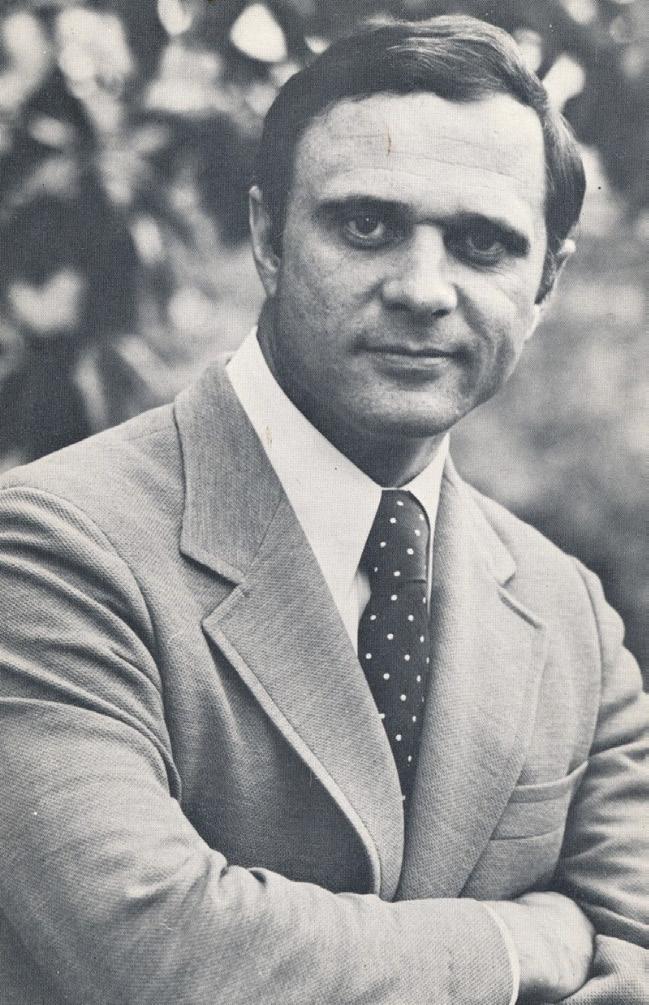
In fact, Pryor was one of ours and of us all, a true son of the Natural State and arguably the last of a select classification of Arkansas statesmen that put him in the company of such giants as John J. McClellan, Joe T. Robinson, J. William Fulbright, Dale Bumpers, Winthrop Rockefeller and a few others. Such leaders brought the state into the modern era, helping to untangle such thorny issues as race, quality of life, economic development, education, conservation, health care, transportation and human dignity across all demographics. The fact that we still struggle with such issues today does not diminish what those leaders accomplished but merely underscores the enormity of the task.
Each member of that select class affected change in his own way, and for Pryor, that way was through warmth, genuine compassion and a Heaven-sent gift for communicating. Among his most famous crusades were taxpayer rights and health care reform, for the latter of which, he even went undercover while a member of the U.S. House of Representatives
Politics, even the “good old days” variety, is not for the faint of heart. As the Associated Press noted, Pryor was so stung over losing a runoff in the 1972 Democratic primary for Senate to McClellan that he abandoned politics altogether for a spell. When he did return, however, he never lost again, and while it is easy to overromanticize people after their deaths, there were undoubtedly times Pryor had to brush off his nice-guy persona in the name of policymaking. What set him apart, however, was the ability to fight hard in the trenches and emerge without having inflicted the collateral damage of divisive rancor, personal attacks, character assassination and political expediency so common among politicians today. Pryor understood his job and his responsibility was to the people of Arkansas, regardless of if they voted red or blue. That is clear not only from his service in elected office but from the time and energy he devoted to roles in his life following politics. Among them was serving as the inaugural dean of the Clinton School of Public Service in Little Rock and helping create the David and Barbara Pryor Center of Arkansas Oral and Visual History at the University of Arkansas in Fayetteville. The center documents the cultural heritage of the Natural State.
I was only once in the same room with Pryor, seated in the gallery at an awards banquet where he was honored for his conservation efforts, along with several other individuals. By then his health problems were well known, and even seeing him for the first time, the effects of a stroke were noticeable. When time came for Pryor to be recognized, however, that shell of frailty fell away, and his remarks were captivating — succinct, inspiring and sparked by his trademark sincerity. When the topic was Arkansas, no one elucidated with more conviction than the softspoken former newspaper man from Camden.
At his funeral service April 27, Pryor was again lauded by those who knew him best, the most poignant of which was his son, Mark, himself a former U.S. senator.
“People have sometimes asked me over the years, they’ll say, you know, ‘What was your dad really like in private?’” Mark Pryor said. “He was almost exactly the same in private, except he was better.”
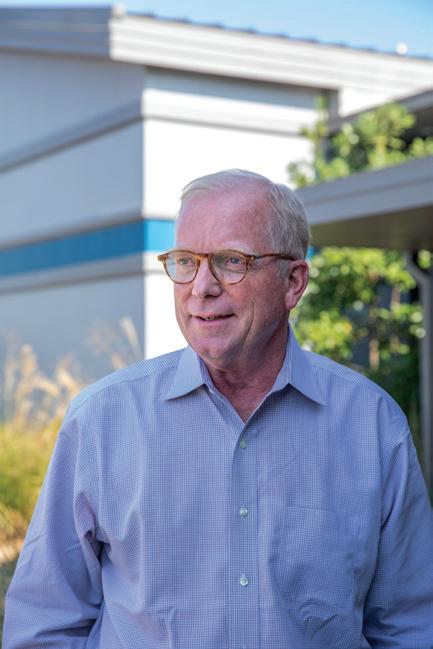
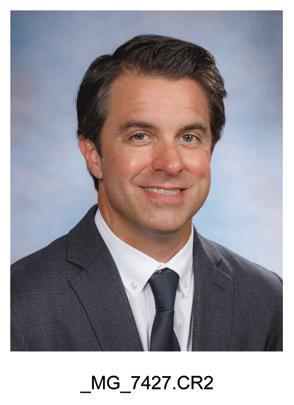
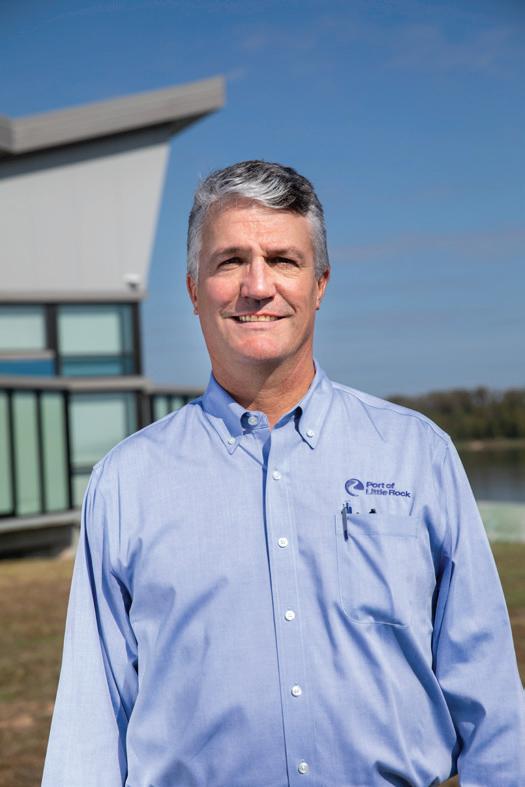
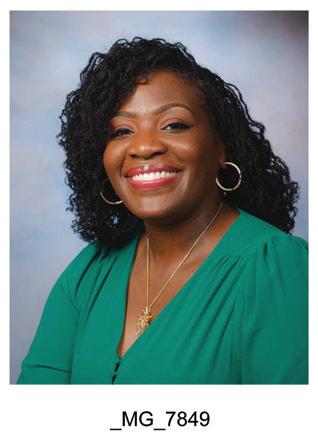
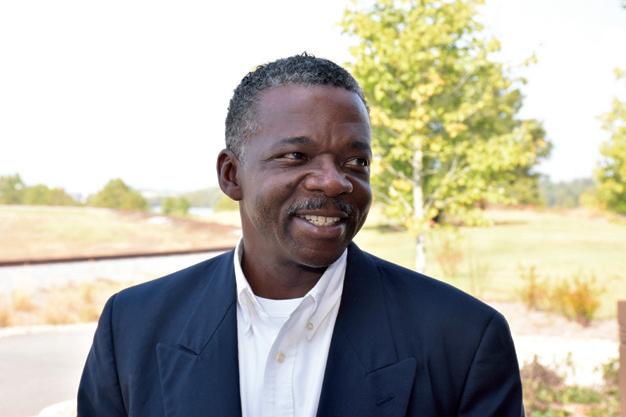










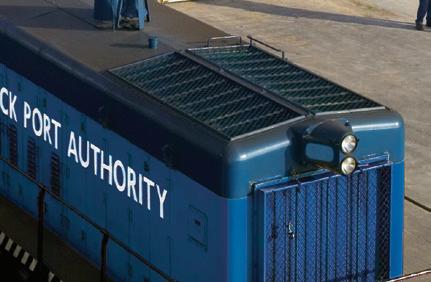
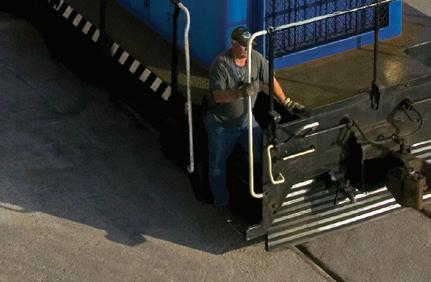


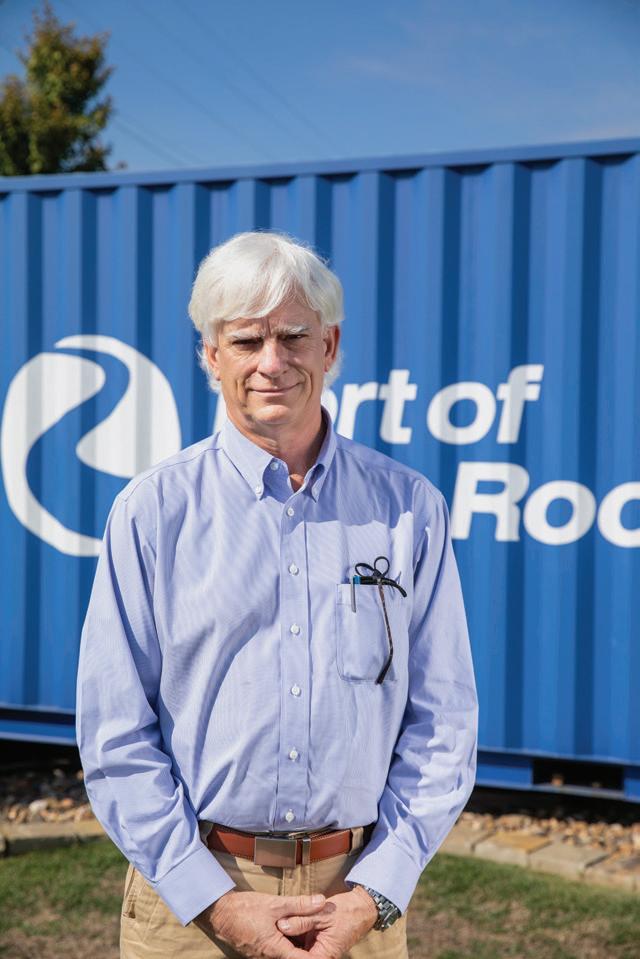
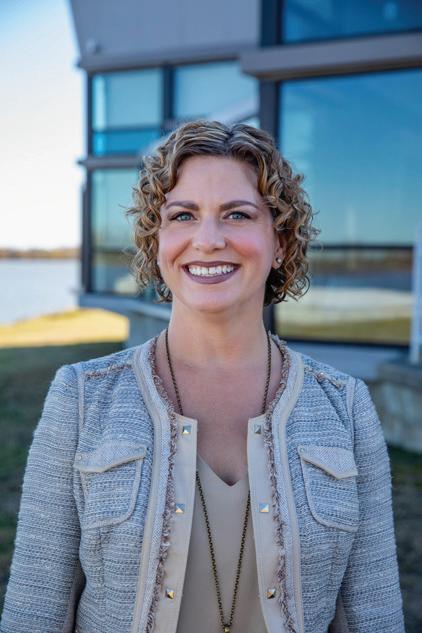





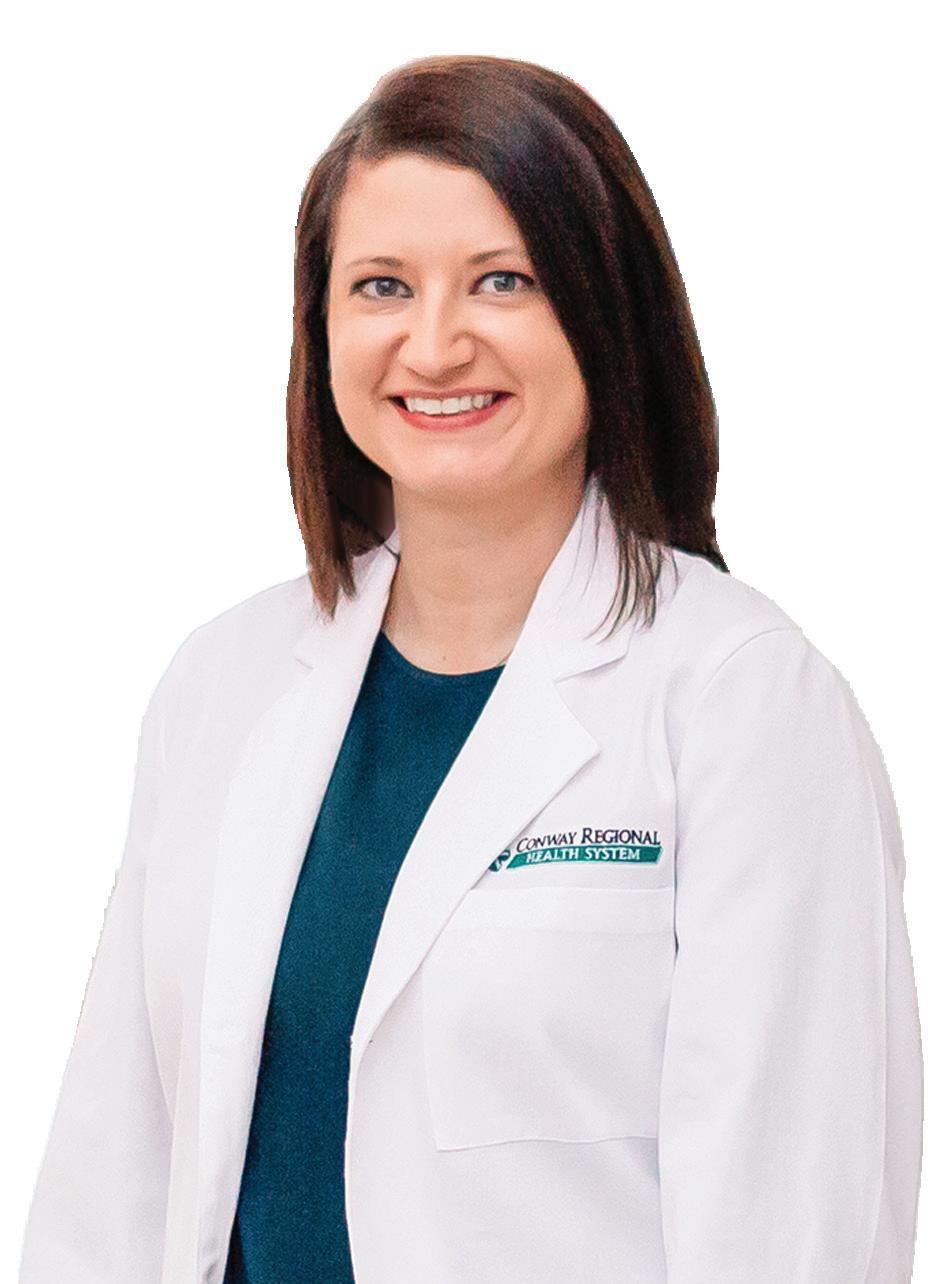
Led by Dawn Hughes, MD, and Stacey Johnson, APRN, our center offers care for women with complications found before conception, during pregnancy, and after birth. Each pregnant woman's journey is special, which is why our highly-skilled specialists collaborate with ob-gyns, neonatologists, and pediatricians to provide each patient with a unique, individualized care plan. Visit ConwayRegional.org



